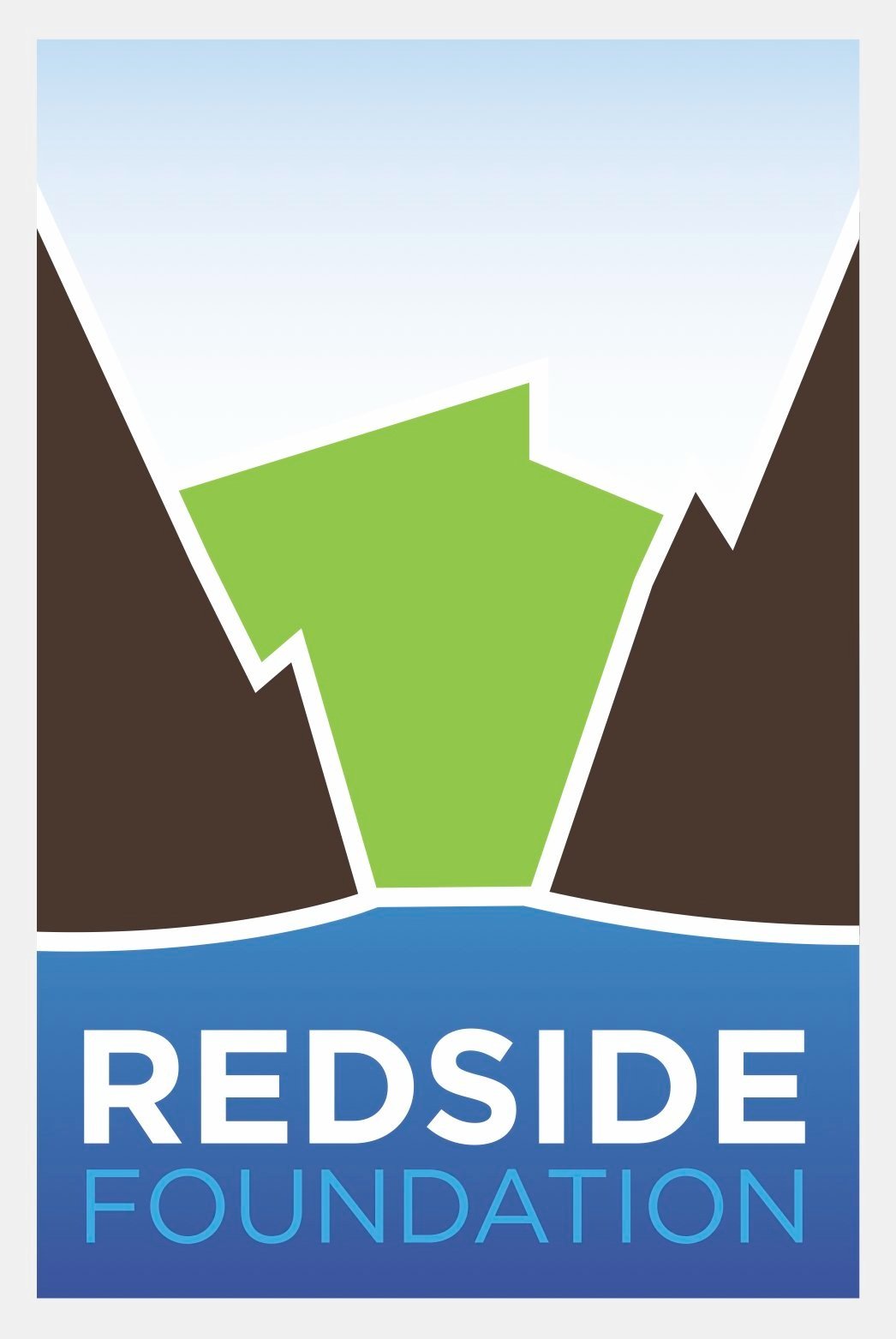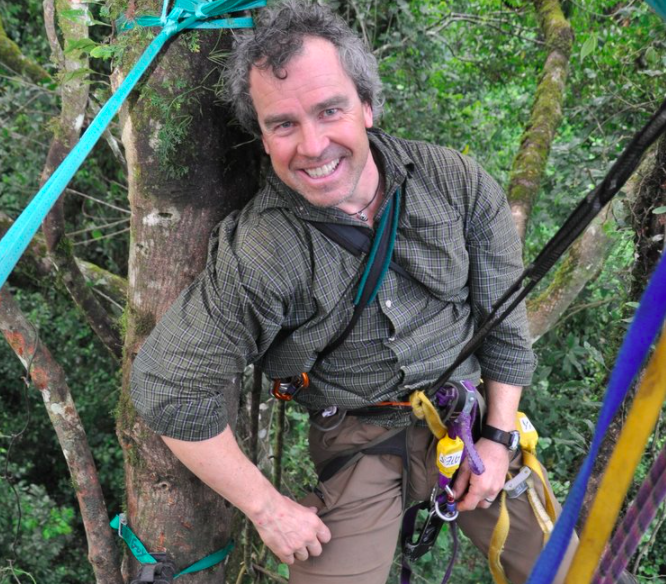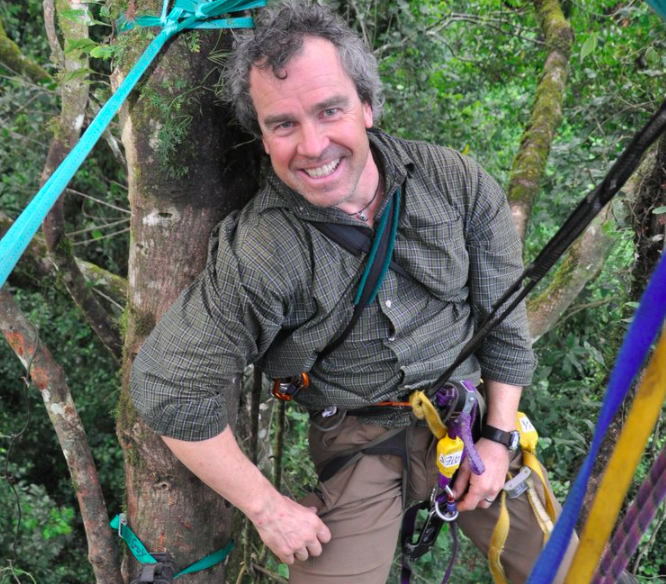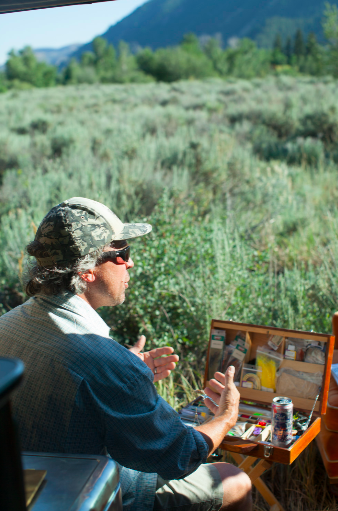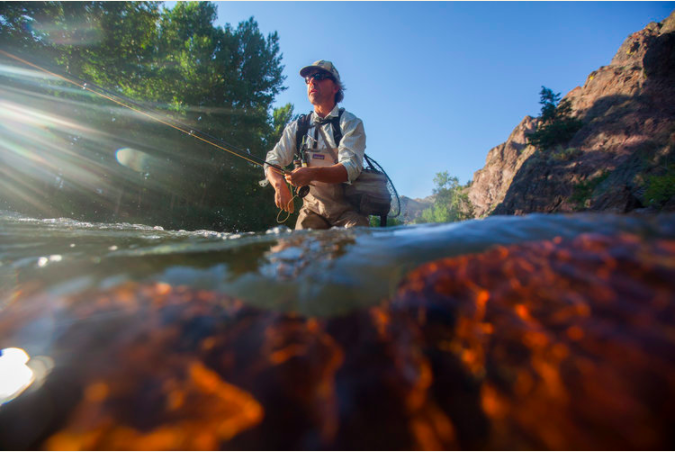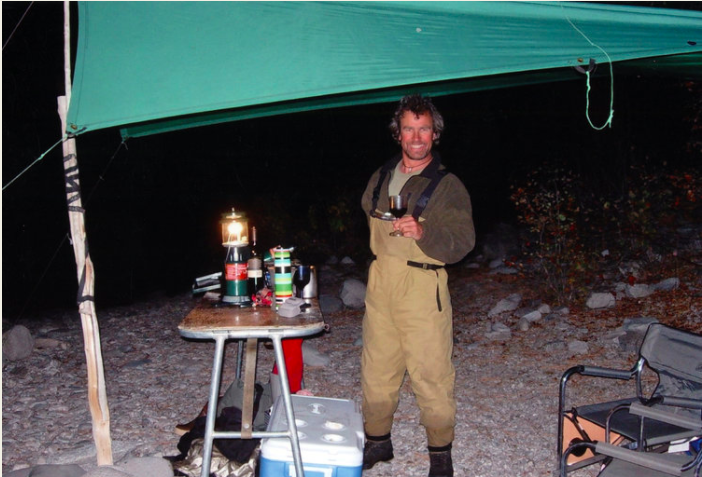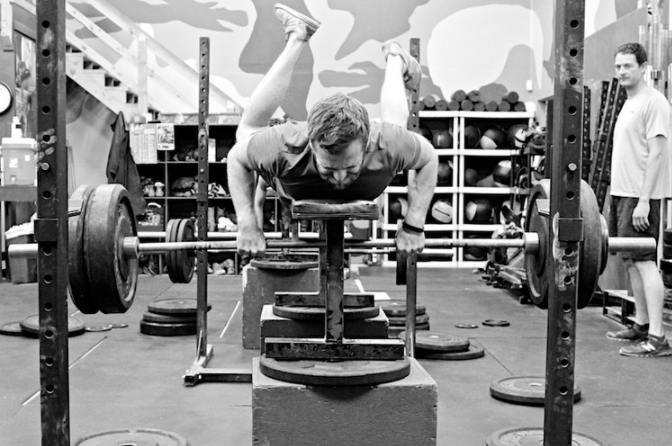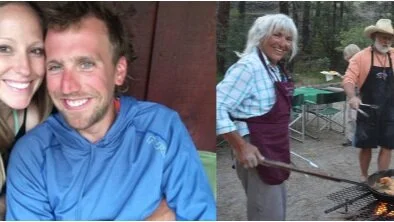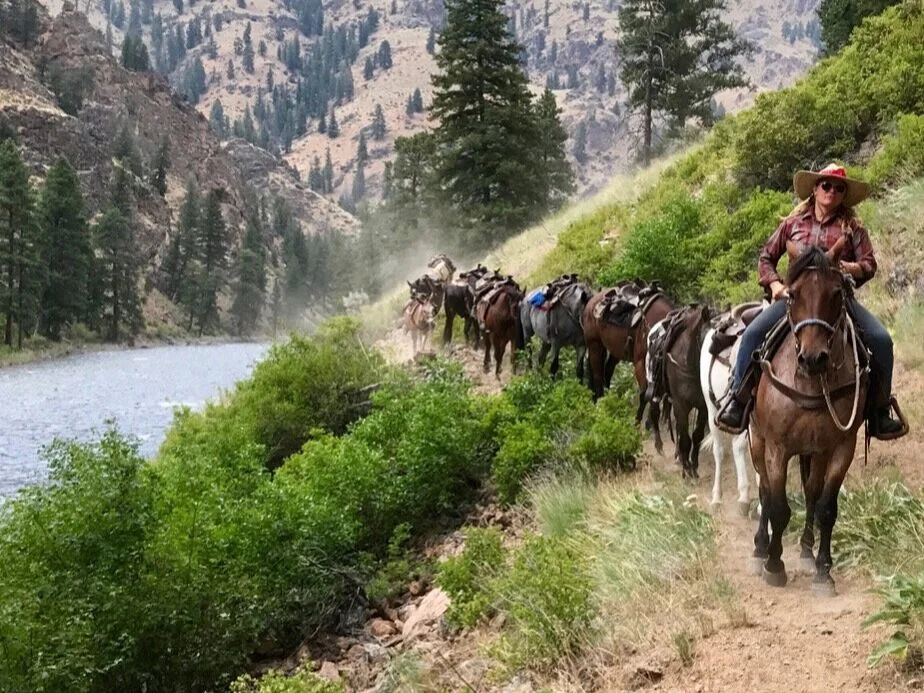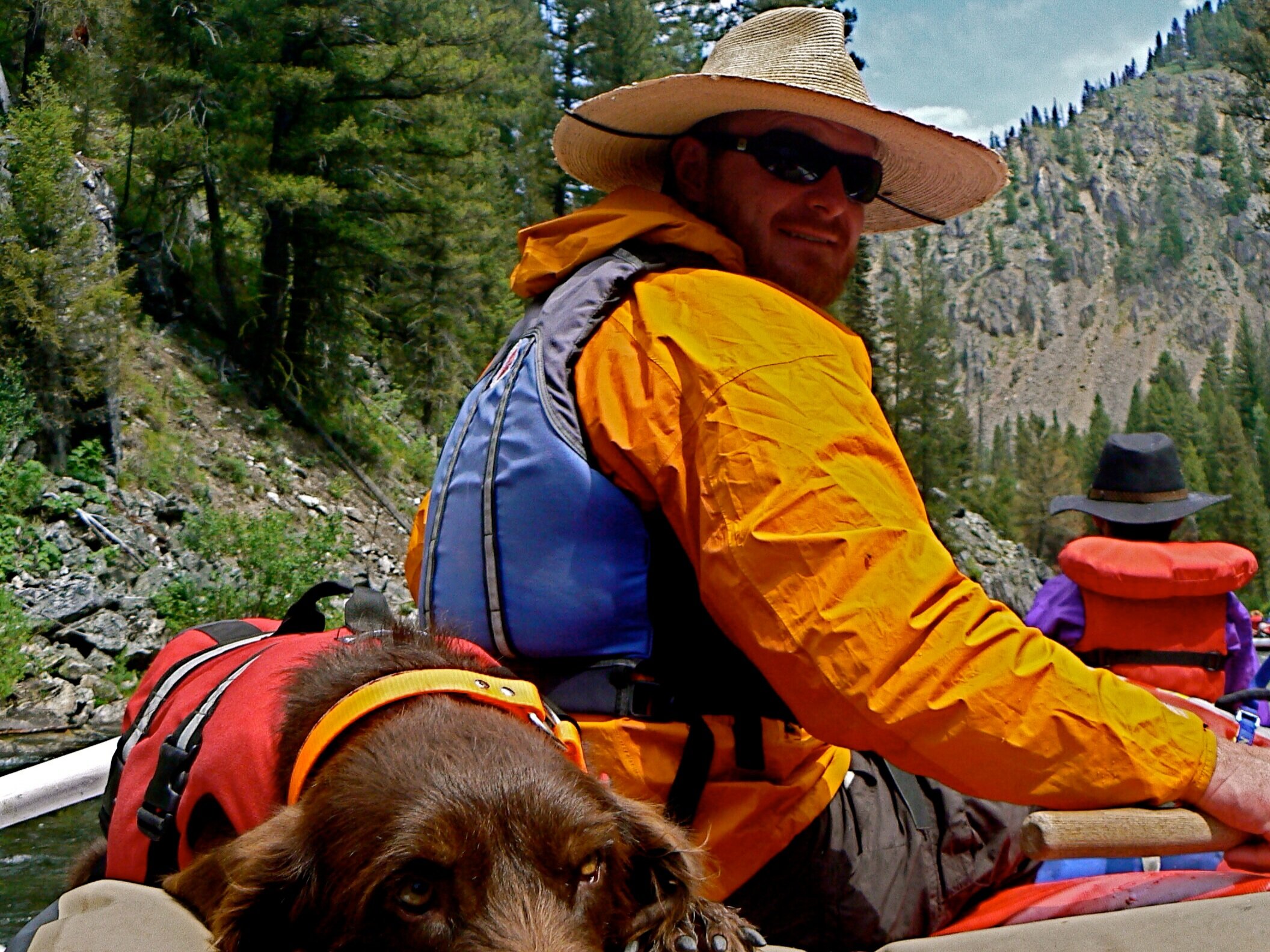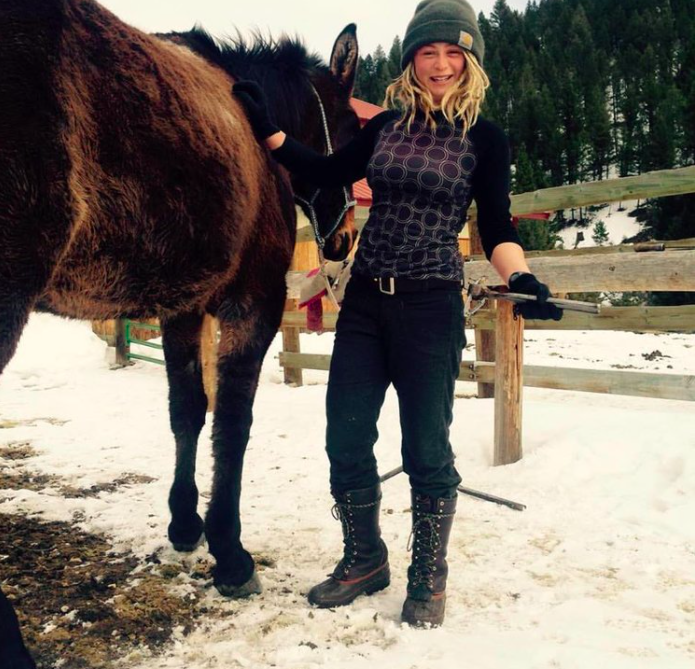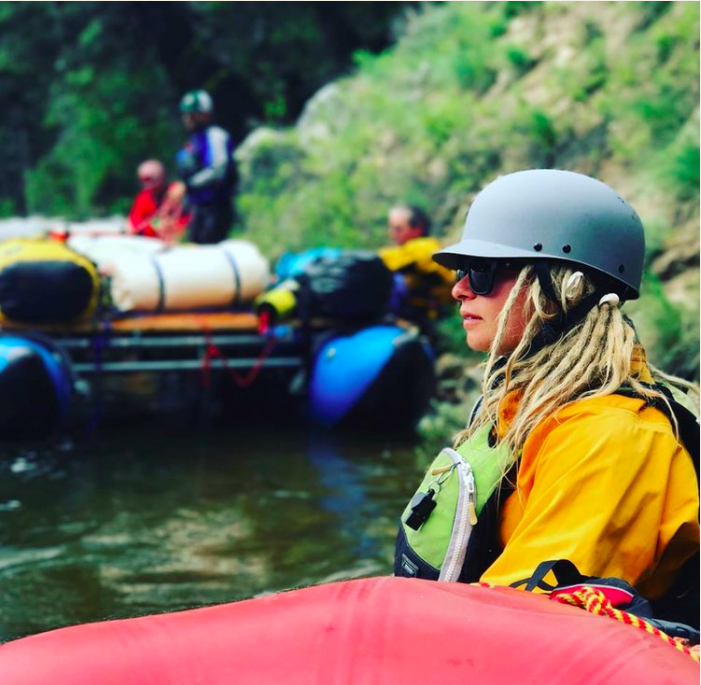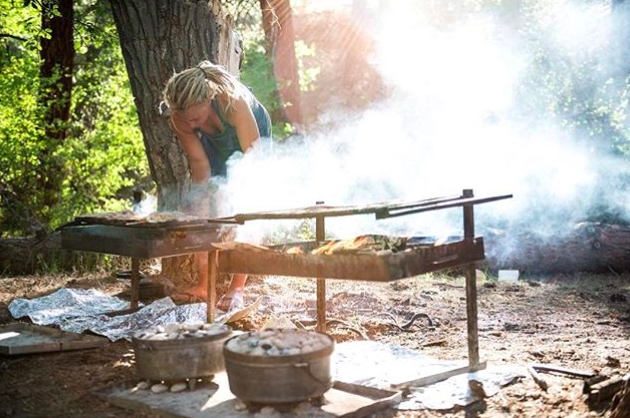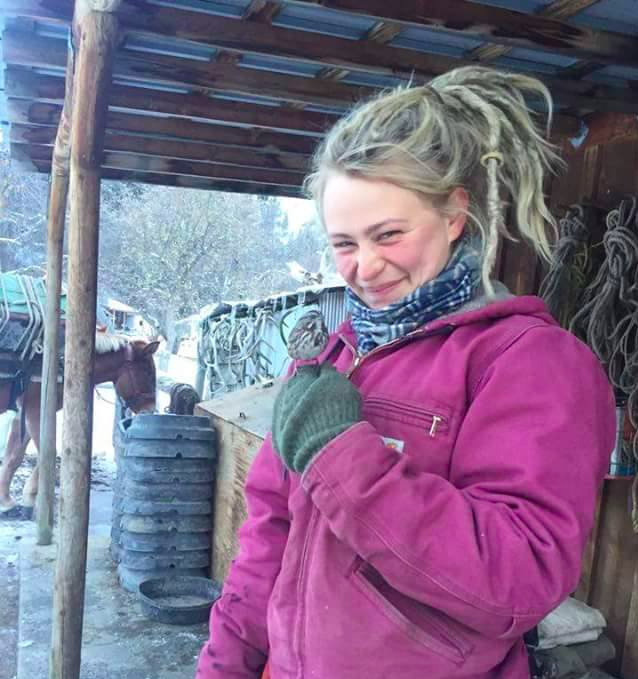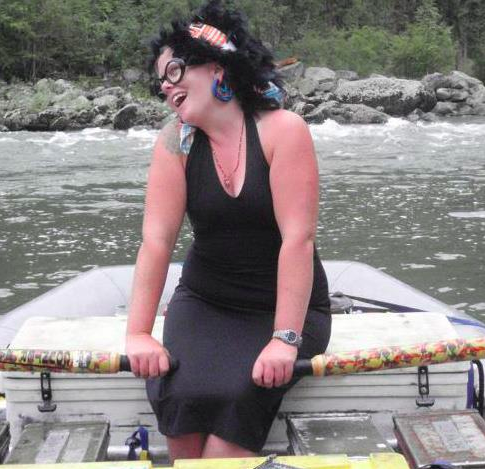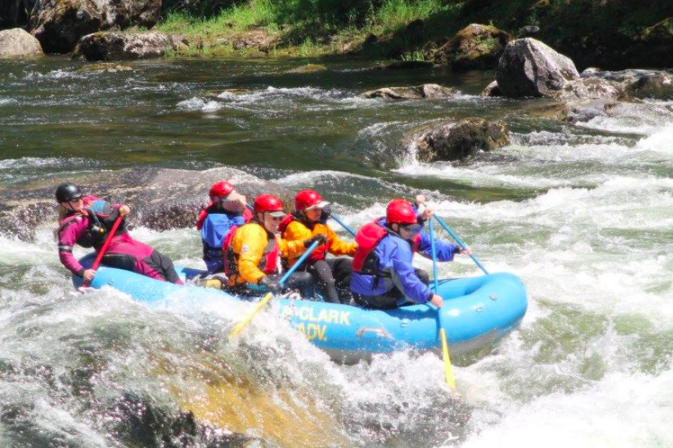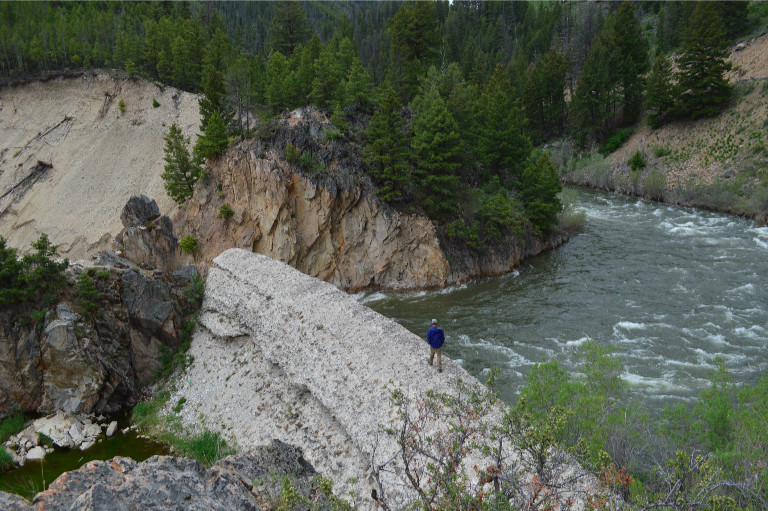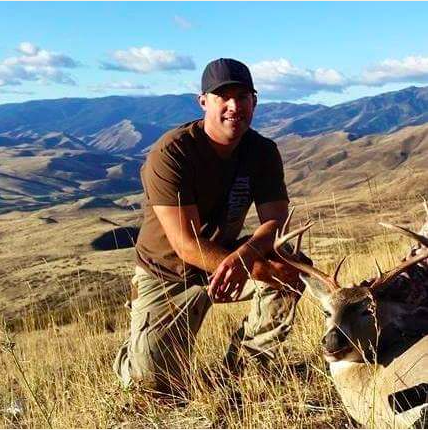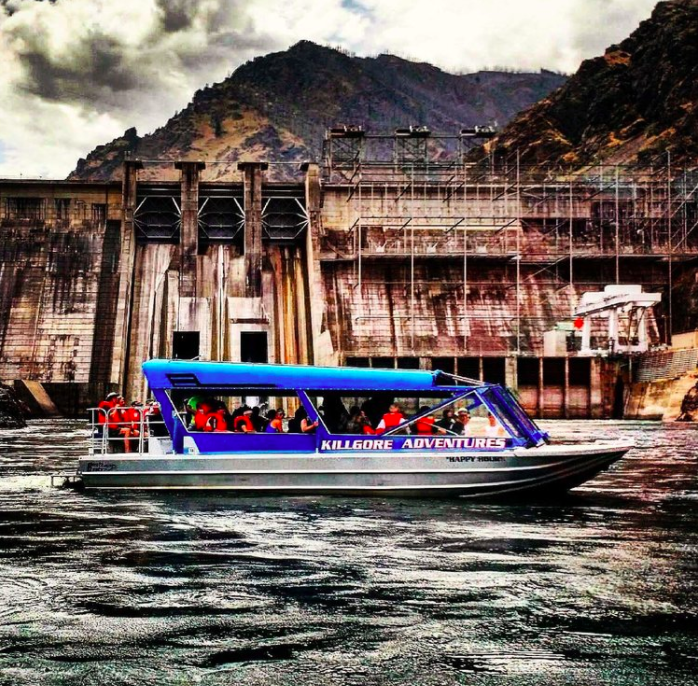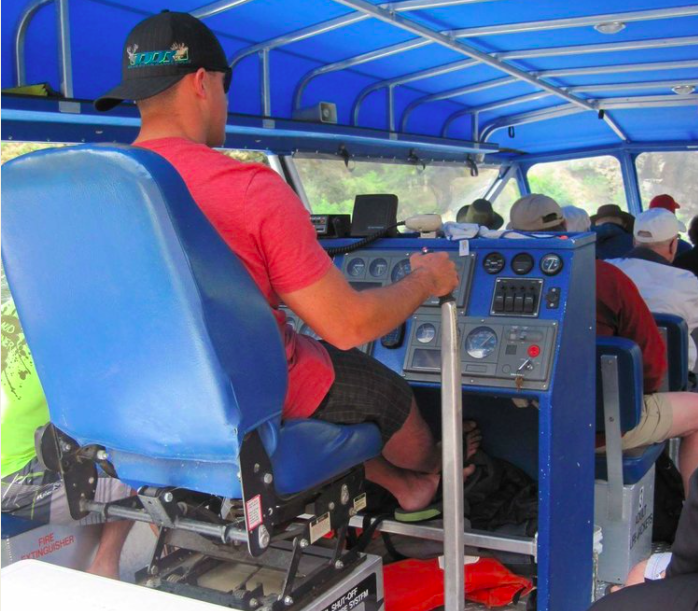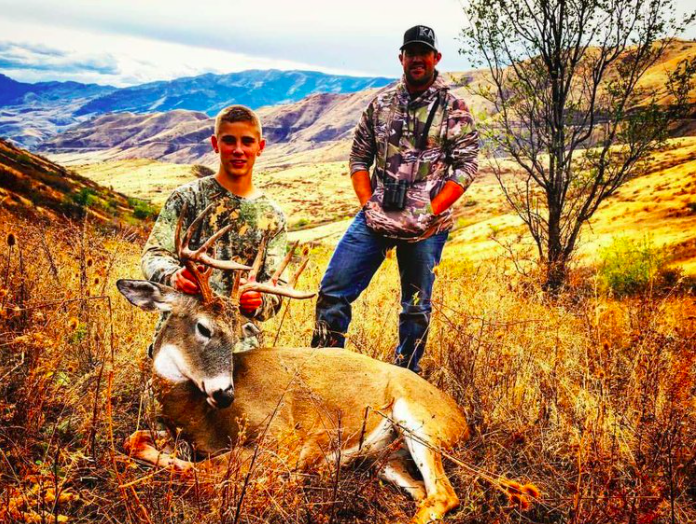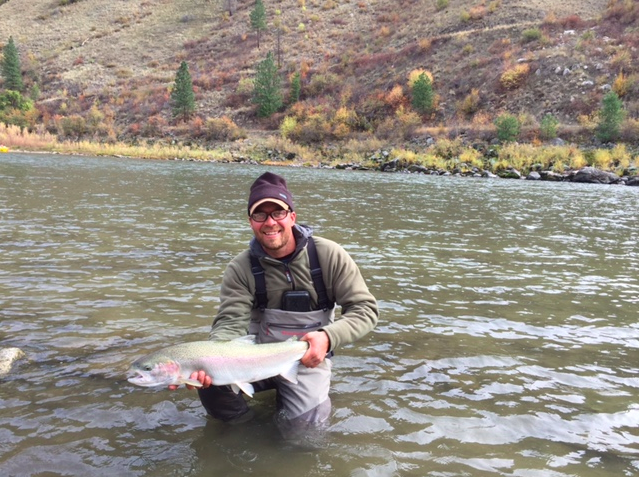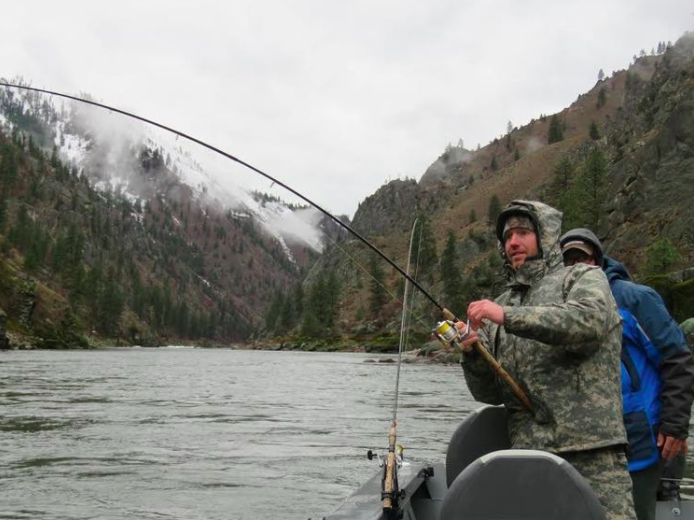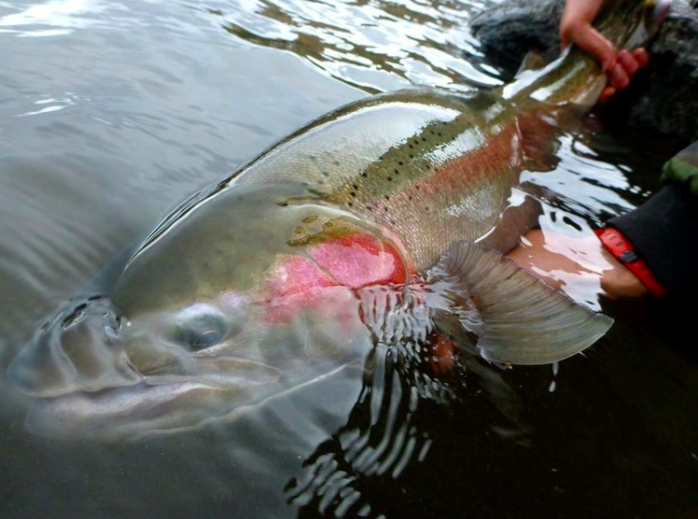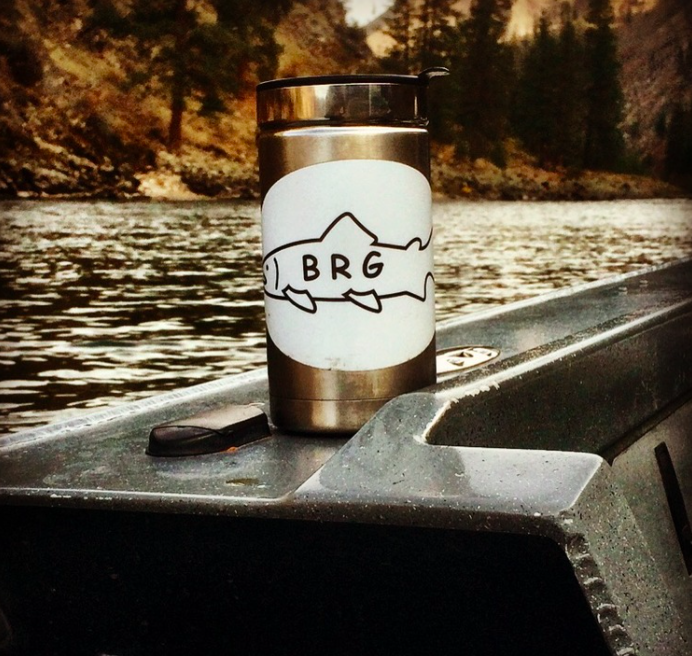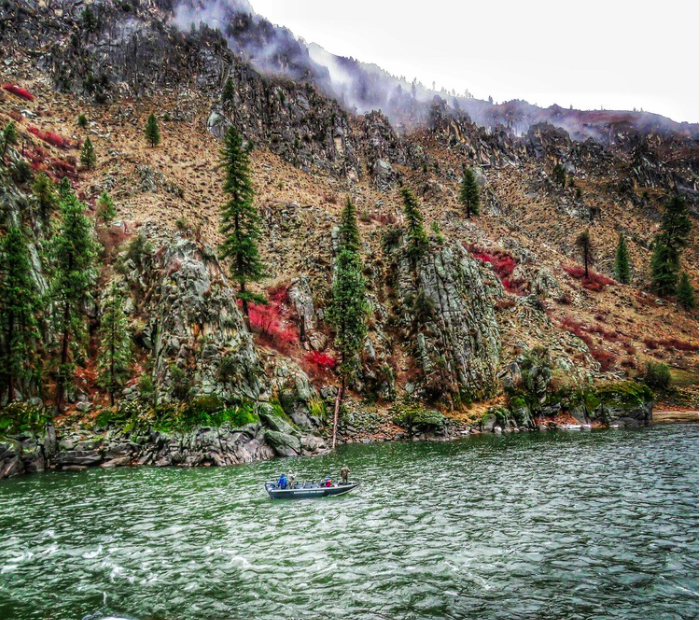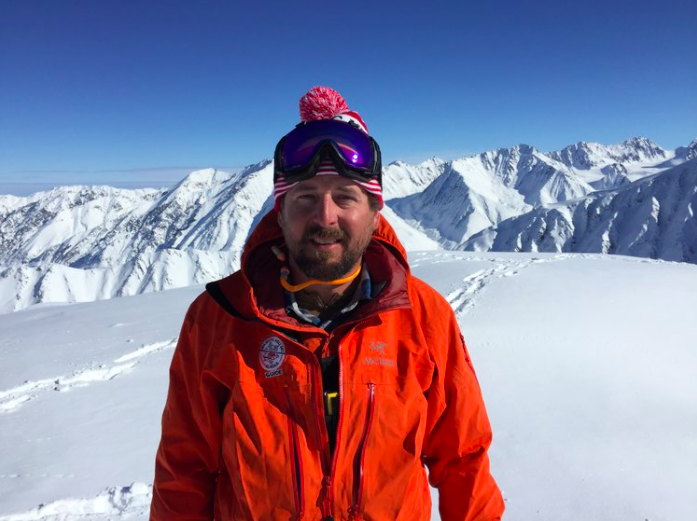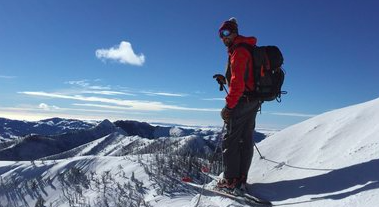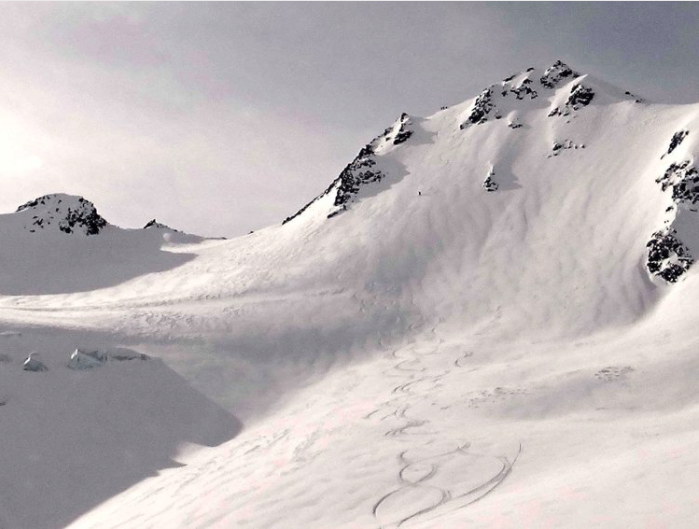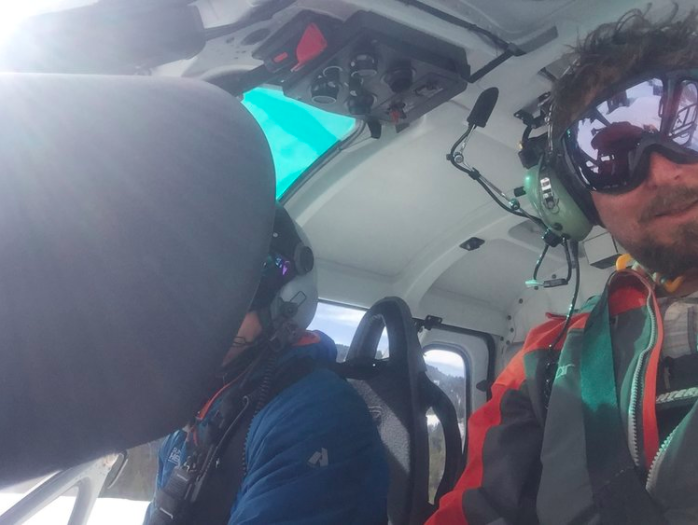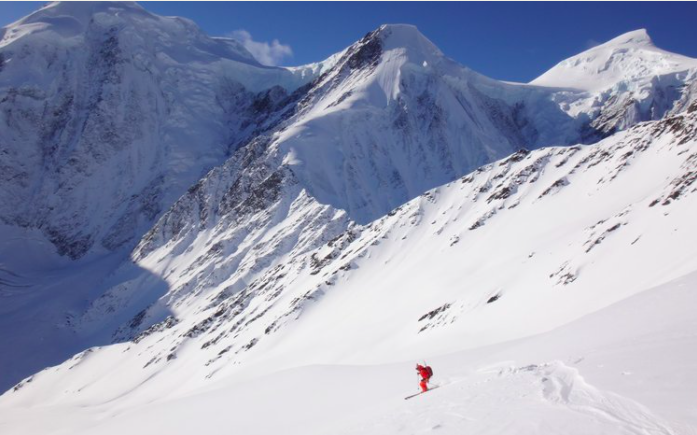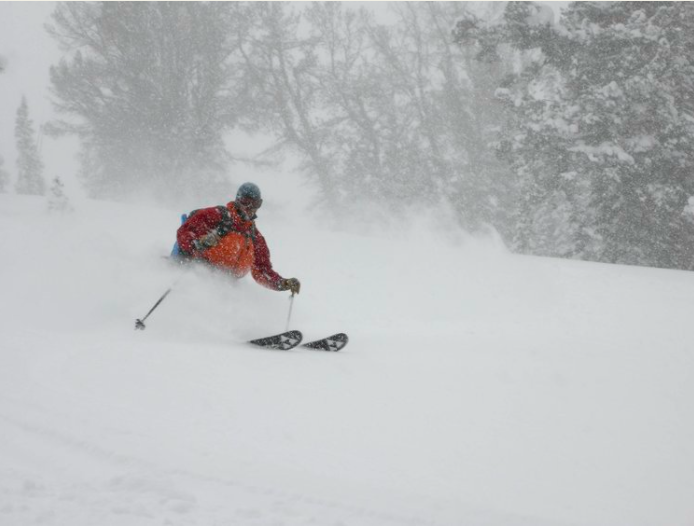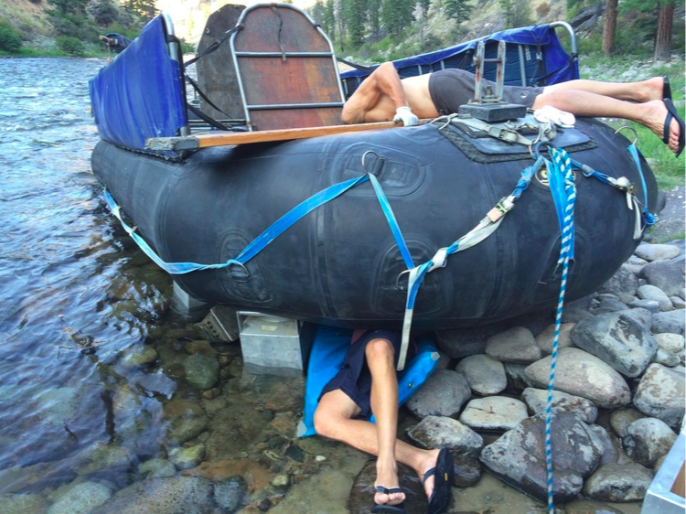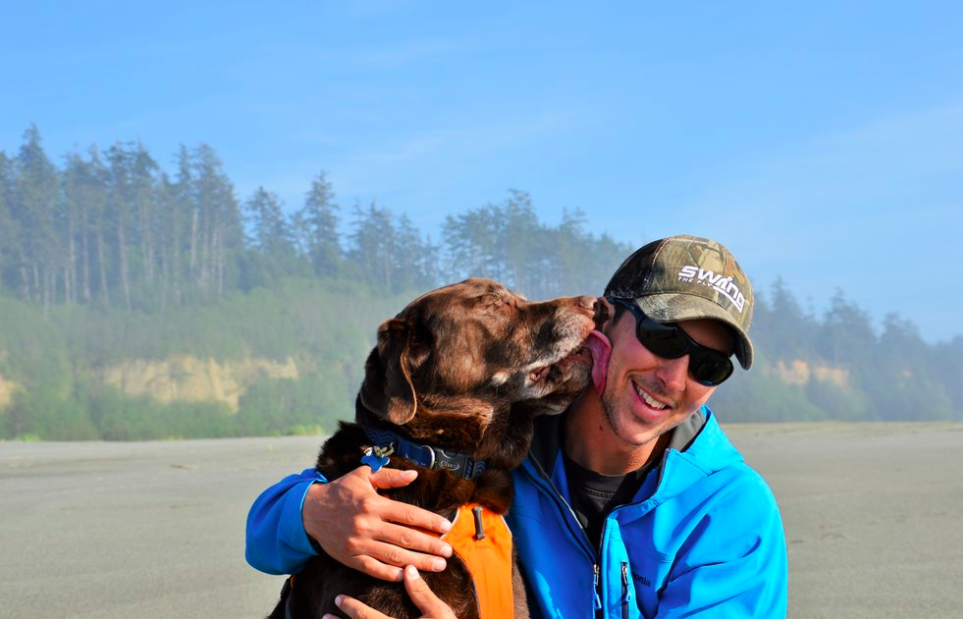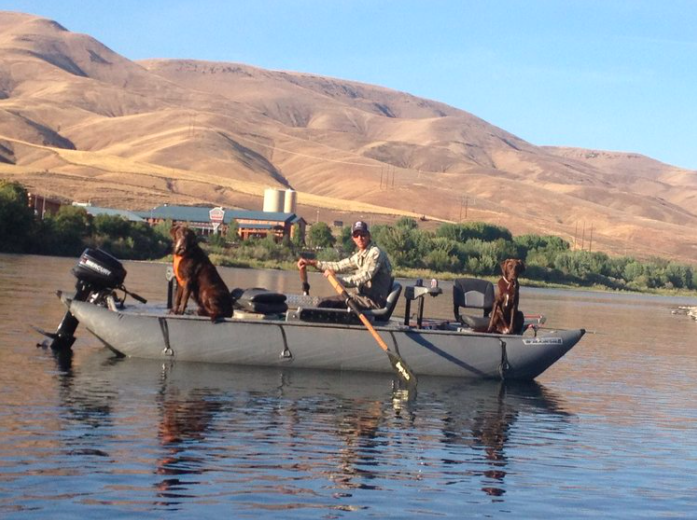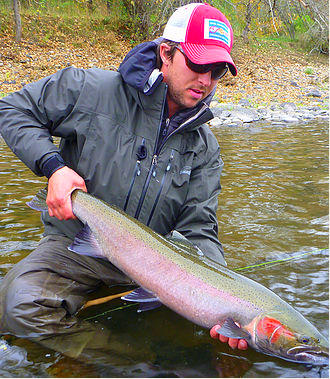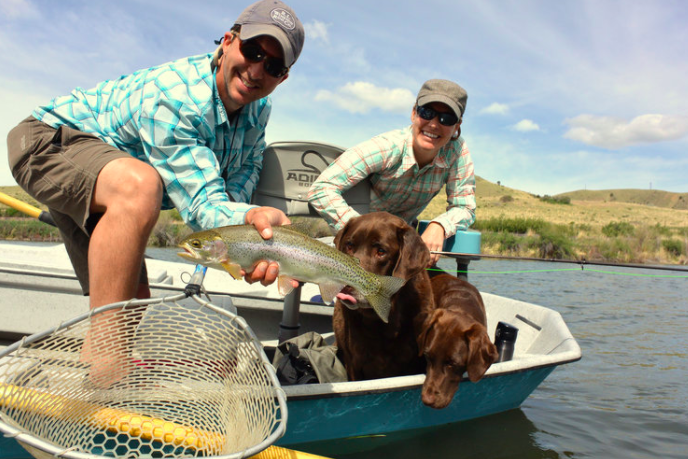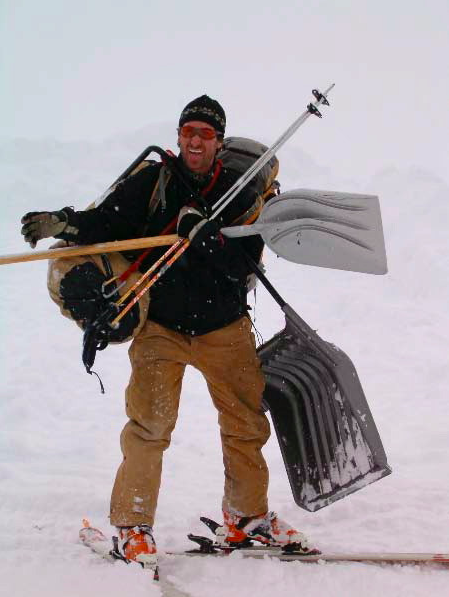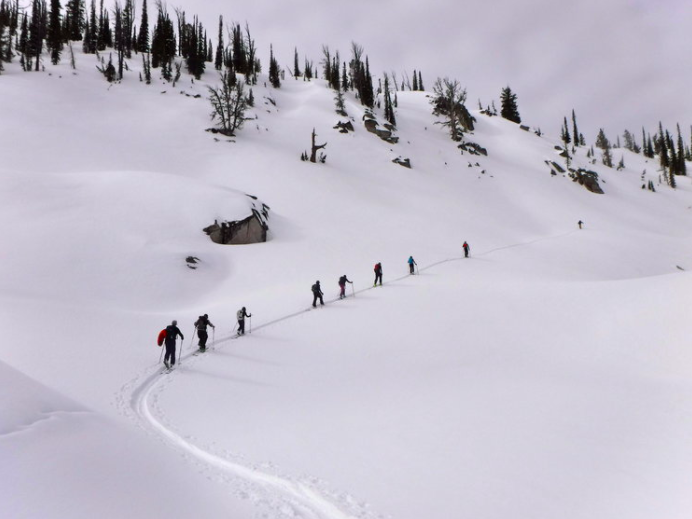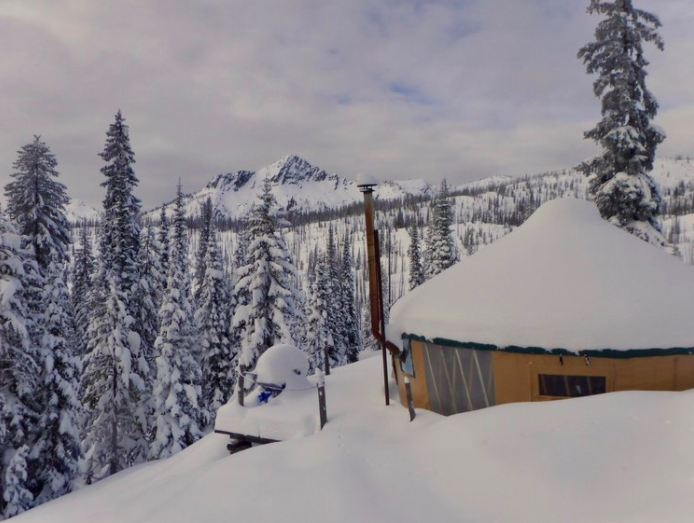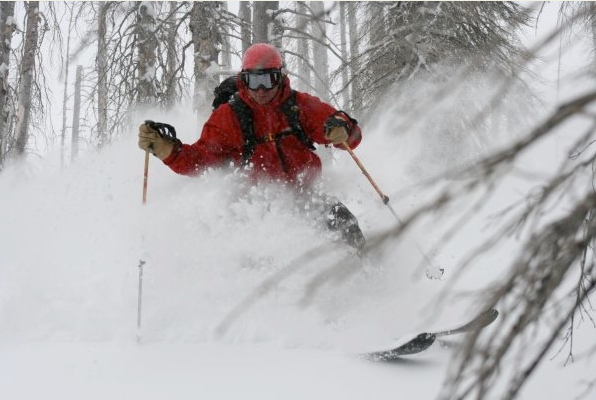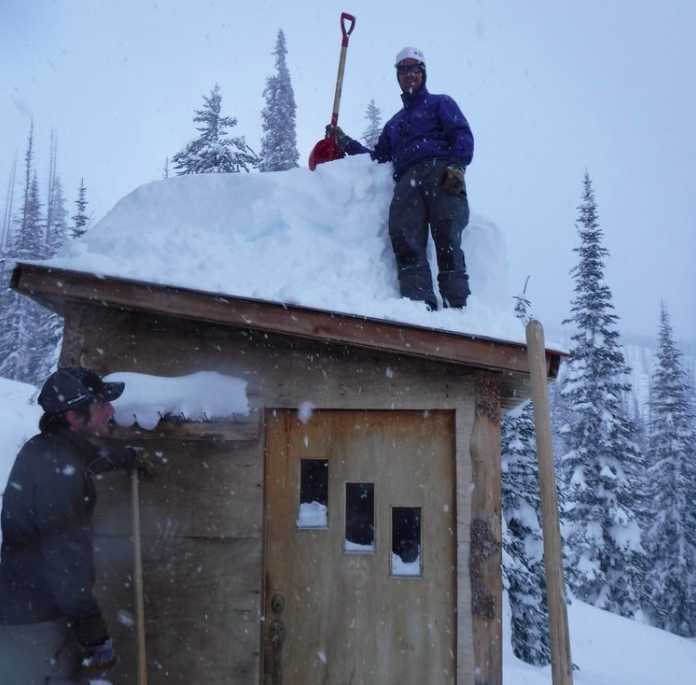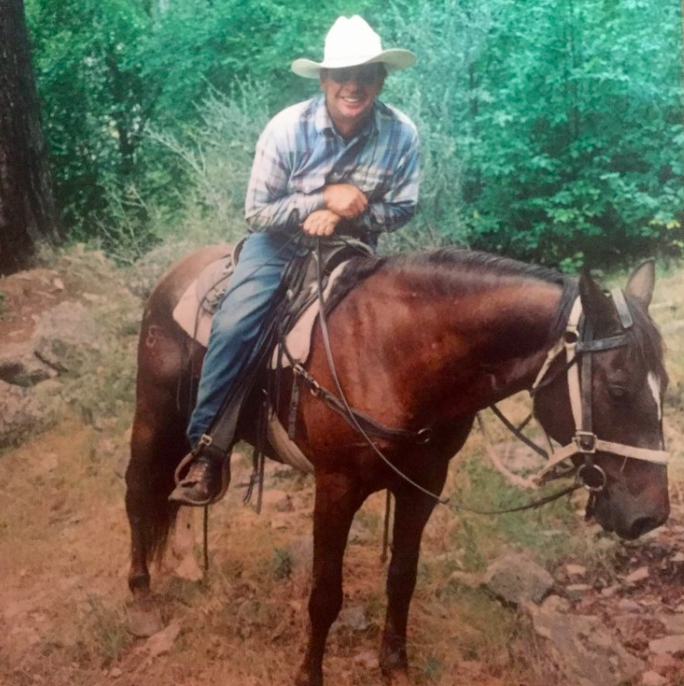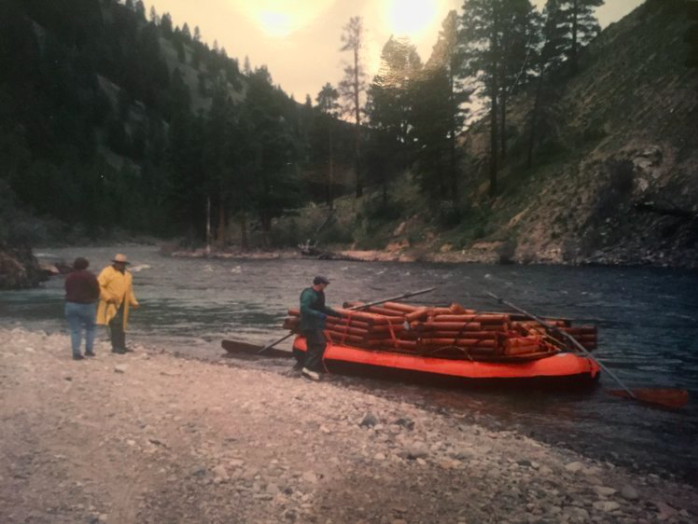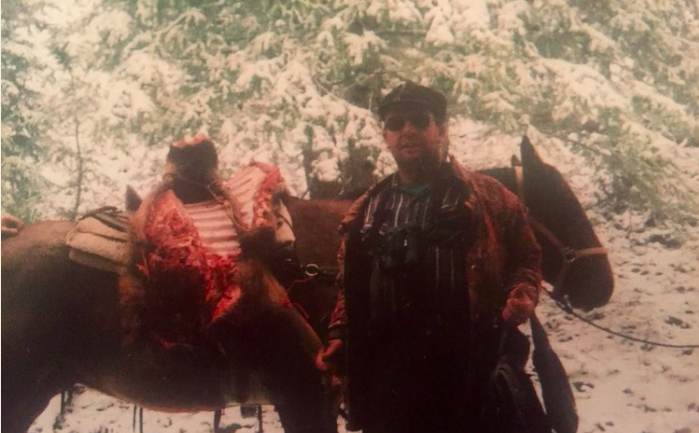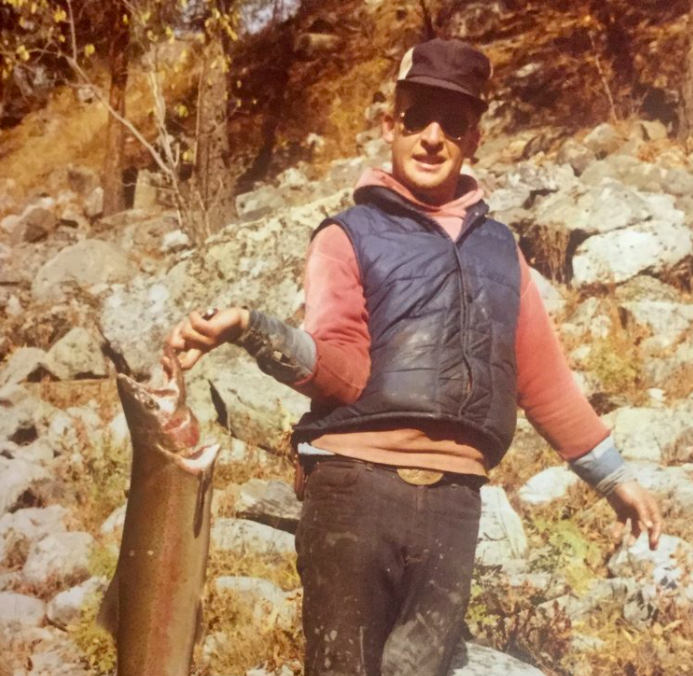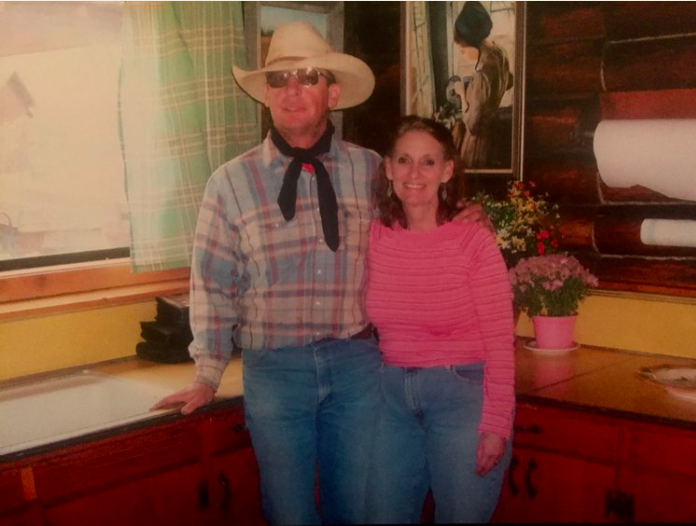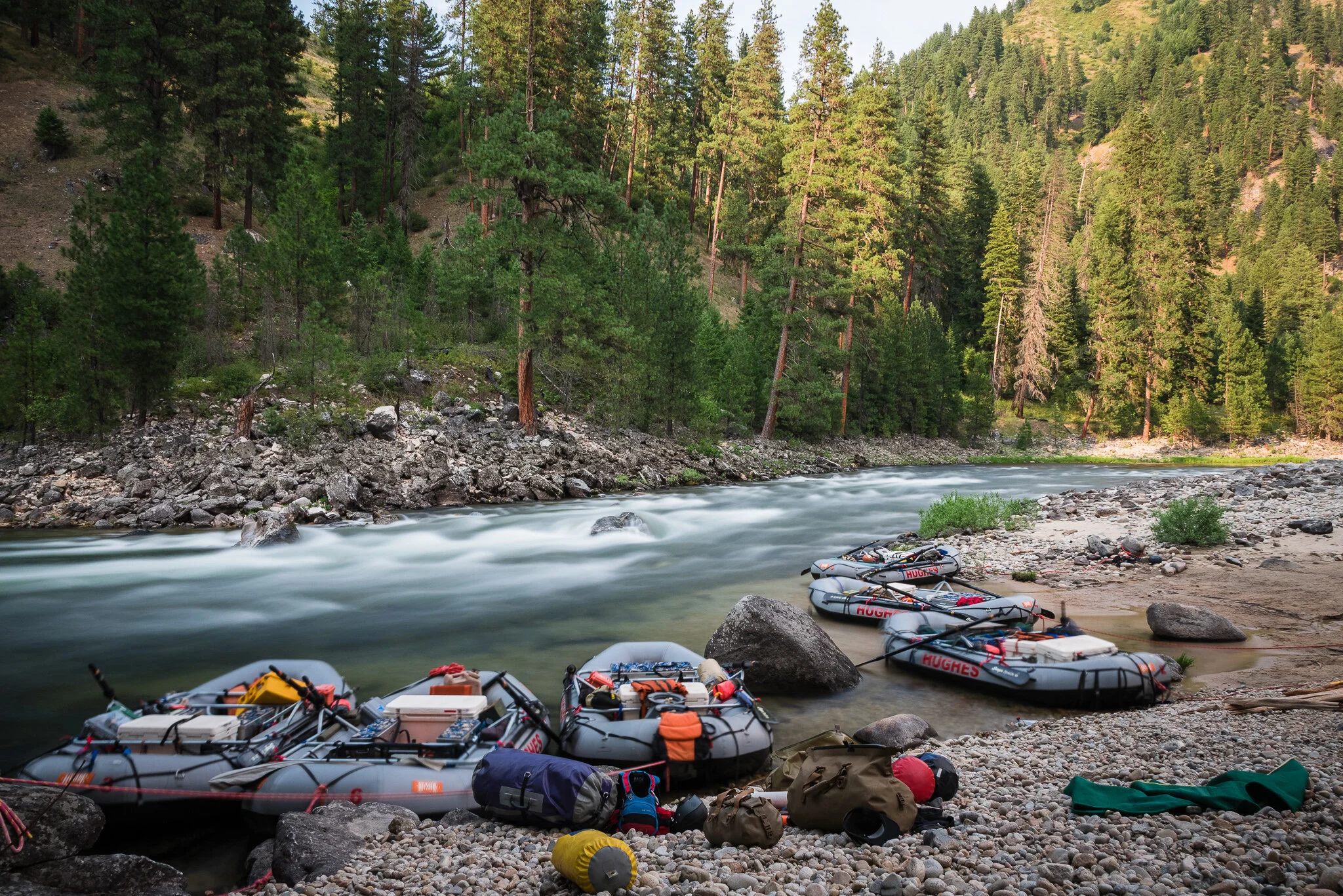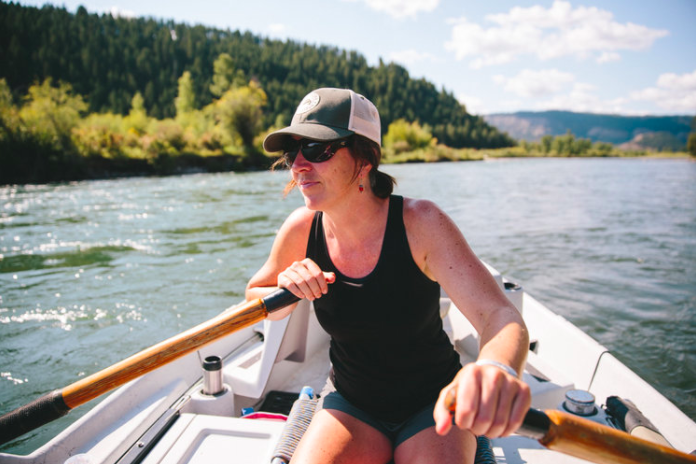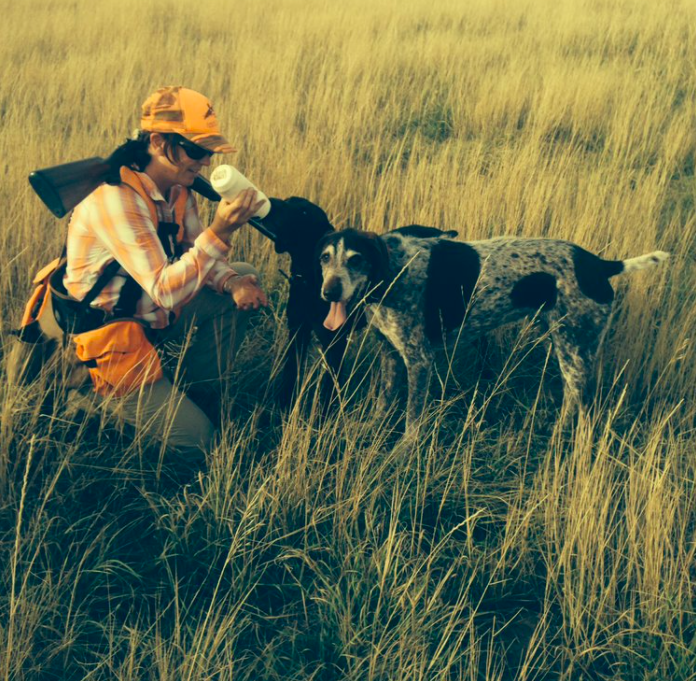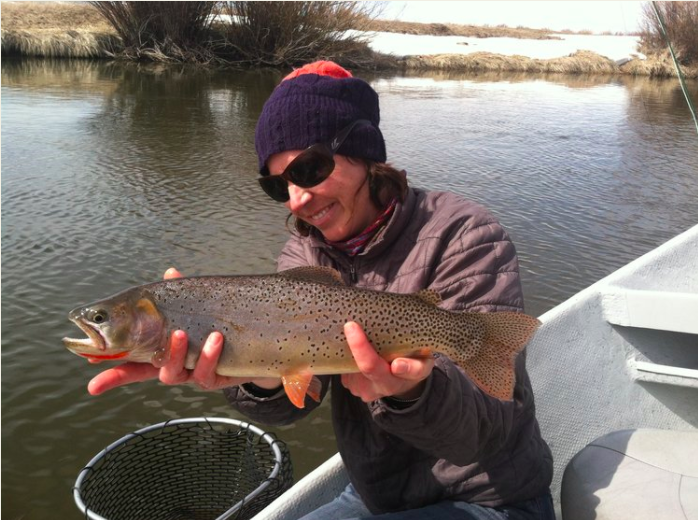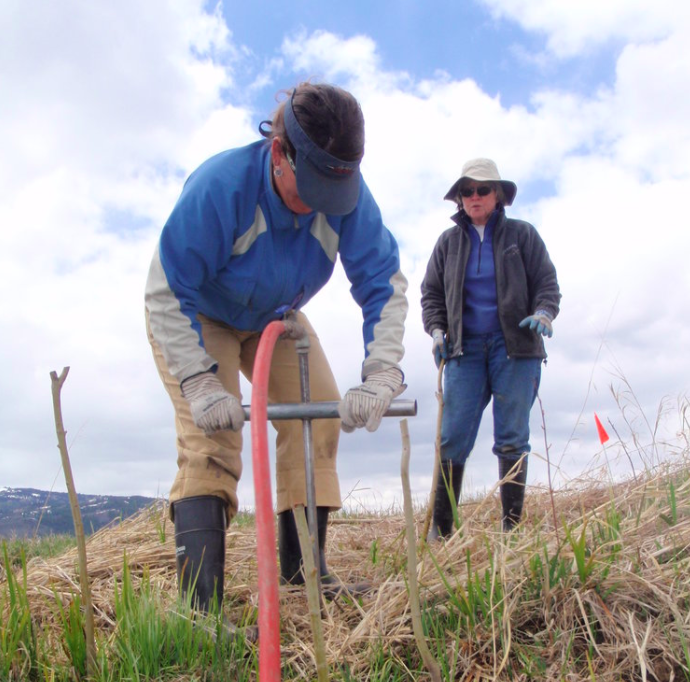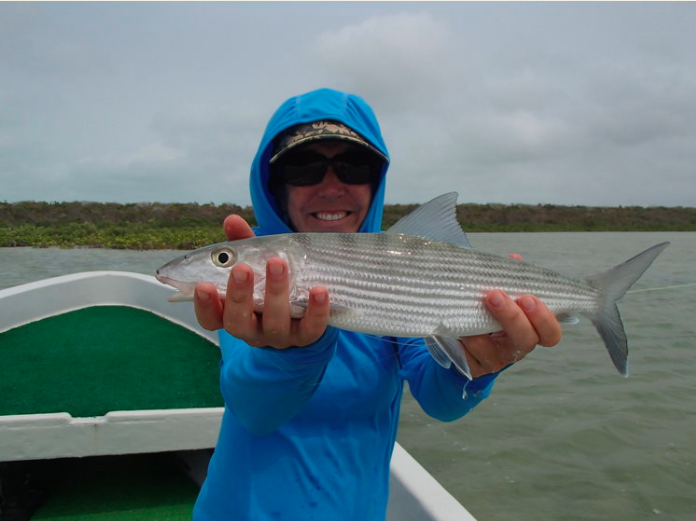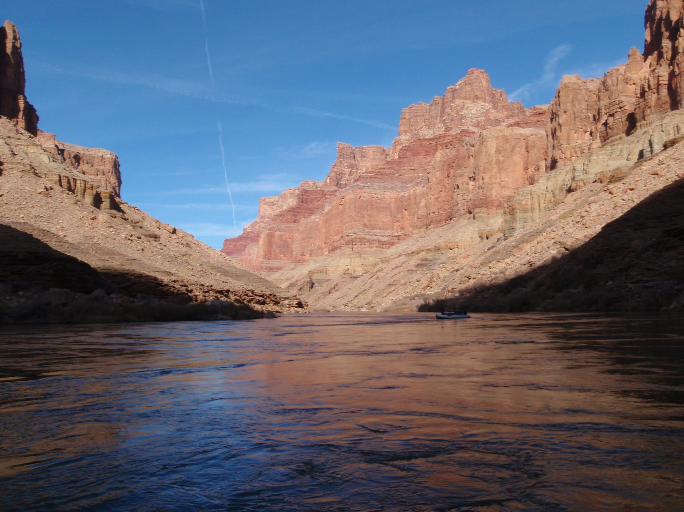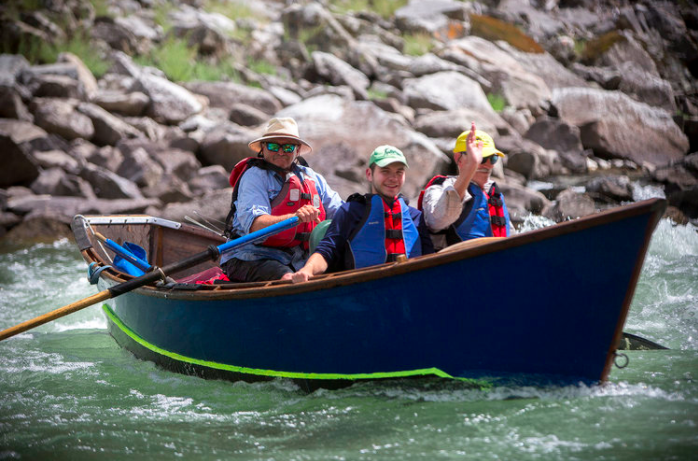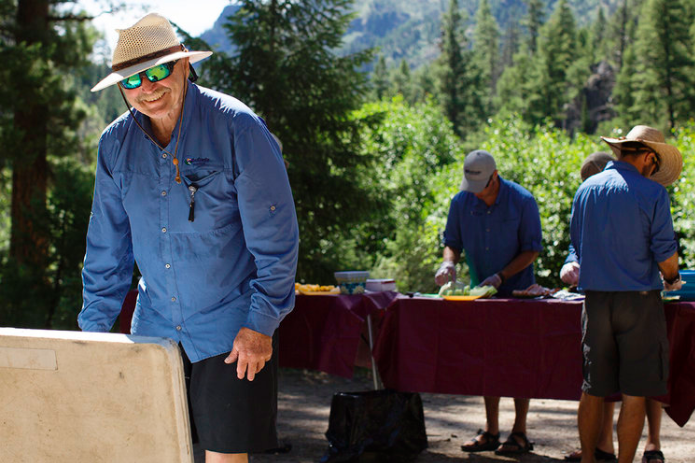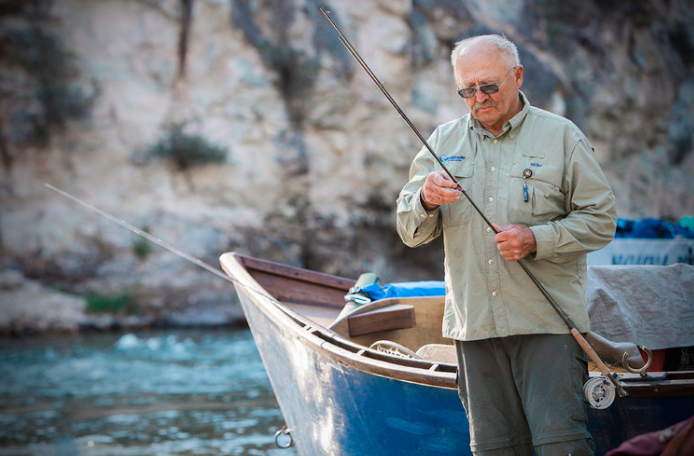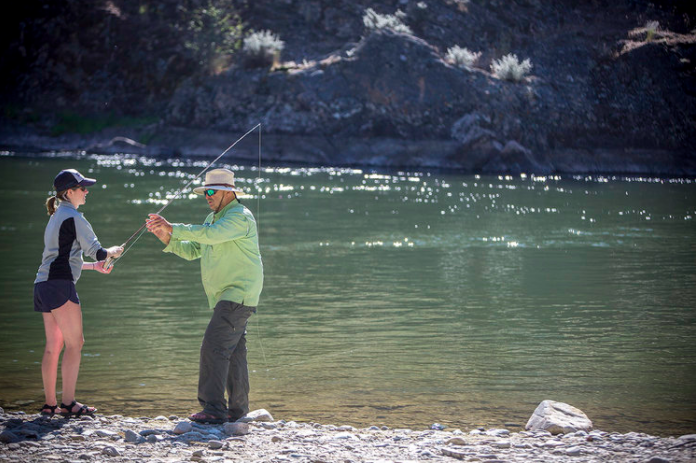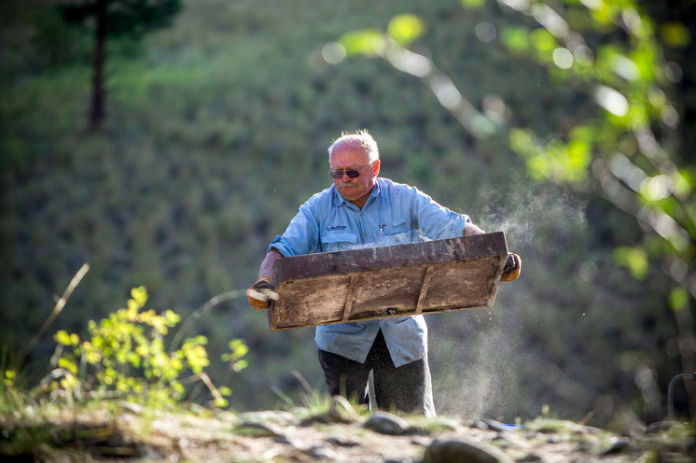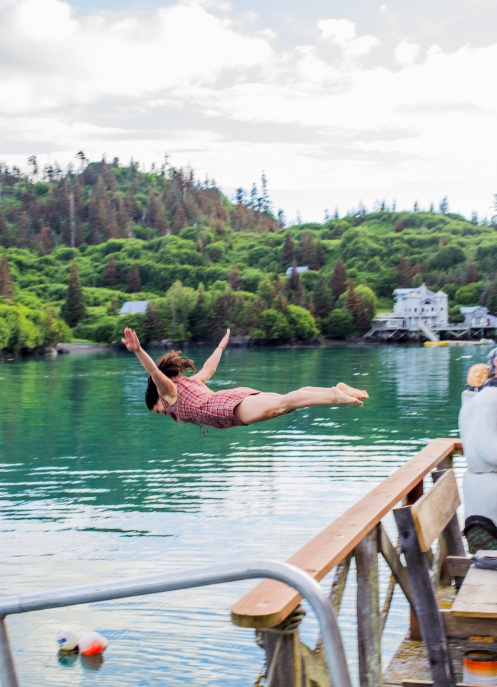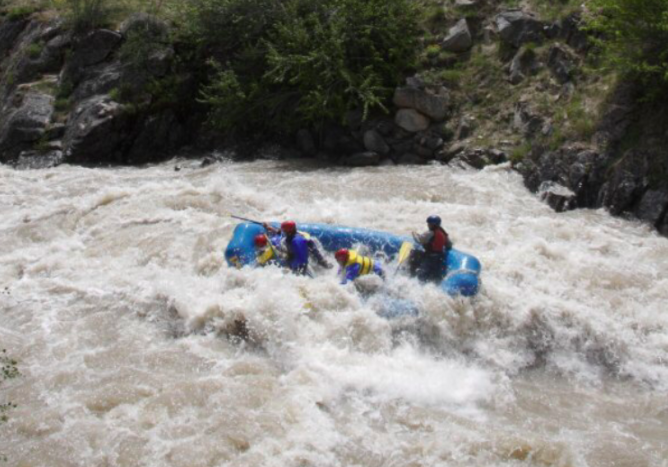GUIDE OF THE QUARTER: GUY ROBINS
As a guide, people look up to you to keep them and their families safe in an environment that's often totally hostile and unfamiliar to them. Don't let your ego get into your decisions and always err on the side of safety. Be able to come back another day. It's like all these Everest climbers who turn back 100 feet from the summit.
Interviewed By: Redside Guide Liaison Courtney Smart
Courtney Smart: Where is your hometown, Guy?
Guy Robins: My hometown is in Ketchum, Idaho.
CS: Is that where you're from?
GR: No. Originally I'm from the east end of London.
CS: East end of London. Why Idaho? How did you end up here?
GR: I had some friends who lived here. They invited me to come and spend a winter here and visit them. I fell in love with Ketchum and Idaho and ended up moving here full-time and guiding here in the mountains and the rivers here in Idaho.
CS: What is your current job title?
GR: I don't think I have a single job title right now. I guide in the summertime and then in the shorter seasons here when I'm not guiding I have a small painting business. I work at a wine bar one night a week. I have a small mentoring program that I'm building.
CS: Where did you start guiding?
GR: I started guiding in the Scottish Highlands. I went to a boarding school up there that had a big outdoor education type program. That's where I got my love for rock climbing and kayaking and fly fishing and anything outdoor-related. Then my father had his own adventure school. In the summertime, I used to take all the skills that I learned at boarding school and put them to work helping my dad with his school. I'd take people kayaking in the summertime or fly fishing. I was about 15 when I started that.
He would send me off to Glenmore Lodge, which is the National Outdoor Pursuits training school in Scotland where I would get my certifications for being a kayak instructor and being a rock climbing instructor. Then I did all that through high school. Then after high school, I left Scotland and started traveling the world as a guide.
CS: Gosh. This mentoring program you mentioned is this based on what your dad's business was like? Explain your mentoring program.
GR: Basically, it's called Trout Scouts. Basically, it is kind of like a junior guide training type program for boys and girls. What we do we go to the river and we go fly fishing. We tie flies. It's basically teaching these kids outdoor skills, cooking, life skills, and kind of taking everything that I've learned in the last 40 years of being an international guide and crafting it more towards preteen and teen boys and girls here in the Wood River Valley.
CS: That's terrific. What a great opportunity for people. What do you think the greatest challenges are to a guide today?
GR: I think the greatest challenges these days are keeping yourself safe and strong on the river. It's really easy to get injured out there. That can certainly affect your career and your life. I think during the season just staying strong and healthy. Being a guide is not easy. It's stressful. You're dealing with different people every week and different people's needs. That can become exhausting after thirteen Middle Fork trips. Then lots of the guys would go on to be hunting guides and do the hunting camps in the Fall. It could be a long strenuous season both mentally and physically.
CS: That's my next question. What do you do during your guiding season to take care of yourself mentally and physically?
GR: I think getting lots of sleep is key. When you do have an opportunity for some down time, if you have to miss a trip, don't look at it as a bad thing. Take that time to reenergize yourself, get out in the wilderness by yourself, get together with your friends. Just do something different from what you've been doing for the whole summer.
CS: Right. Stay engaged.
GR: Yeah. Stay engaged. Maybe get on your bike and do something or go away with some other friends. Just keep yourself mentally strong and refreshed so you're ready to go back and do it all again.
CS: How do you manage leaving your family? Or coming back? Both can be hard.
GR: Now that I have a family I don't get out on the river as much as I used to but I have a very supportive wife and she understands that being a guide is a large part of who I am. Nowadays I get to do one or two river trips a year. It's always fun to get away and get back on the Middle Fork again and to see all of my friends and everything. Again, I always look forward to getting back and seeing my kids and hopefully in the future I'll be able to get them on the river and stuff.
CS: I can't imagine they wouldn't.
GR: Yeah. Little Sammy is starting to kayak right now. This will be his first summer of kayaking.
CS: That's great. How old is he?
GR: He's five.
CS: Oh my gosh. Perfect. When did you start kayaking?
GR: I started kayaking probably when I was about 10.
CS: Okay. He has a jump even on you.
GR: He's got five years on me! He just kayaked Silver Creek on Sunday.
CS: You've guided all over the world. If you had to choose one place to guide besides Idaho where would you go?
GR: It would probably be back in the Himalayas or Nepal or northern India.
CS: That's terrific. You trained a lot of guides over there for a short spell, right?
GR:Yeah. I was an outfitter out there in Nepal, northern India, and northern Pakistan for about 10 years. I trained lots of not just western guides who would come out there but also lots of Indian guides, Pakistani guides, Nepali guides. Predominantly Nepali guides because that's where our operation was based there in Katmandu.
We would be floating down the river and you'd get these boys just jumping off the sand dunes into the river and swimming up and climbing on the back of your kayak. You'd take them down these little rapids that hold on and they jump off and swim back to the beach. Over the years we got to know these kids pretty well. Like every time we came by they would jump on our kayak or let them jump on the boat. We'd fly through a rapid. Just so much excitement for them.
Then we started bringing them into the camps and they could come and wash dishes and we'd feed them dinner. Then when they were old enough we would bring them back to Katmandu and teach them English, give them some education and stuff.
We could train them as either river guides or treking guides. Whatever their interest was.
CS: So you've been a tracking guide, a fly fishing guide, a whitewater guide, a kayak guide, climbing guide. What type of guiding do you prefer to do the most?
GR: I love them all. I just love guiding period.
CS: It seems like guiding to you is interconnected with teaching.
GR: I mean, I love to ... We all have had mentors in our life. People that have influenced us. At different ages. Not just as a kid but as adults, people who have inspired us in different aspects of the sports we enjoy.
CS: Aside from your father who inspired you in guiding?
GR: Well, I've had some friends, I've had some teachers when I was at school who got me first guiding the fly tying and fly fishing and climbing and they took the time to mentor us and to encourage us to follow our passion.
Then throughout my life, throughout my travels, I've met other guides who inspired me and just different people traveling the world. You never know who you're going to run into. They're not all guides. Sometimes they're just people, clients. I've been inspired by, by their life story or the reasons that I'm guiding them or stories of their family and things like that.
CS: If either of your children were to become a guide what would be your number one piece of advice to them?
GR: I would probably say that the safety of your client is probably the most important thing.
CS: That's good advice.
GR: I think as a guide people look up to you to keep them and their families safe in an environment that's often totally hostile and unfamiliar to them. Don't let your ego get into your decisions and always err on the side of safety. Be able to come back another day. It's like all these Everest climbers who they turn back 100 feet from the summit.
CS: "Live to climb another day."
GR: But they live to come back and try Everest another day. I think just to make smart decisions. Don't let your ego or your bravado get into your decision making. At the end of the day you are responsible for the safety of your clients to make sure they have a good time but also a safe good time.
CS: Right. No fun if it's not safe. Thank you for your time today, Guy.
GR: You're welcome.
GUIDE REAL TALK: PHYSICALLY PREPARING FOR YOUR GUIDING SEASON
In general, the closer an athlete gets to his or her season or event, the more "sport specific" his or her programming should be. So 6-8 weeks out from the season, guides should be focused on training the specific fitness demands of their work - paddling work capacity, upper body push and pulling, grip strength, core or chassis integrity fitness, basic work capacity and endurance, leg strength.
Note: This is our final social media installment from our seasonal social media coordinator Cheyenne Brown! Thanks, Cheyenne, for all your hard work this winter.
Interviewer: Cheyenne Brown
Interviewee: Rob Shaul, Mountain Athlete
Photos: Mountain Athlete
Some days it seems like one of the greatest challenges of guiding, whatever it is we may be guiding, it just staying healthy. Long days, many spent doing repetitive movements, short nights, and constant human interaction begin to wear on us in all the ways as the season muddles along. It can be a challenge to stay physically, mentally and emotionally healthy through our guiding seasons.
Coach Rob Shaul started Mountain Athlete in Jackson, Wyoming almost a decade ago with a focus on programming that specifically focused on how to prepare athletes in the gym for mountain-based sports. Initially, the focus was on mountaineers and climbers but what was once Mountain Athlete has now grown into the Mountain Tactical Institute and its focus has grown to include tactical athletes (military, law enforcement and fire) as well as all sorts of mountain athletes including kayakers, hunters, skiers, and ultra runners.
Mountain Tactical doesn’t just focus on helping the most elite outdoor athletes and operators in the world become as strong and fit as possible. They are constantly experimenting with new programs for a variety of folks, including guides, as well as nutrition and gear. Coach Shaul has become one of the go-to trainers for the outdoor world and has numerous interviews and articles in Outside Magazine, Men’s Health, and Alpinist.
Redside is grateful that Rob was kind enough to let us pick his brain a bit about some strategies for staying healthy through the guiding season.
---
Redside: How can guides physically prepare themselves for their season?
Shaul: In general, the closer an athlete gets to his or her season or event, the more "sport specific" his or her programming should be. So 6-8 weeks out from the season, guides should be focused on training the specific fitness demands of their work - paddling work capacity, upper body push and pulling, grip strength, core or chassis integrity fitness, basic work capacity and endurance, leg strength.
---
It’s worth mentioning here what work capacity because it differs a bit from just pure endurance. Work capacity is more focused on the body’s ability to perform a variety of activities at various intensities and durations, and the body’s ability to recover from and adapt to that work. When we row or paddle we aren’t using the exact same stroke for the exact same amount of time with the exact same amount of effort on each stroke. Below are some links to MTI work capacity workouts, organized by time and sport.
http://mtntactical.com/knowledge/mtis-favorite-work-capacity-events-duration/
Also, chassis integrity is something that is somewhat unique to Coach Shaul and MTI, but of utmost importance to outdoor athletes. Rather than focusing on simple core strength or core exercises, MTI identified the need for a more functional approach to strengthening the core, particularly in outdoor and tactical athletes, and that was to link leg and core strength, which MTI now refers to as chassis integrity. The following links provide further information on MTI’s approach to chassis integrity as well as some exercises and programming to get you started.
http://mtntactical.com/knowledge/evolution-chassis-integrity-theory/
http://mtntactical.com/knowledge/chassis-integrity-exercise-menu/
---
Redside: We can, and should probably, work as hard as we can in the pre-season to try and be prepared for whatever the summer season might throw at us. Most of us have the time and energy to invest, but once the season starts things can get a little bit trickier. How do we stay strong and healthy once the season starts and time and facilities are limited?
Shaul: The focus should be on strength maintenance and short/hard work capacity. In an ideal world on the river, guides would be able to carve out 20-30 minutes in the evening or early morning and alternate training between day one of bodyweight strength and core work, and day 2, sprint-based work capacity efforts. Off days I'd have them work in long runs or bike rides.
From a durability issue, the major threat is overuse in certain areas - my guess is shoulders are vulnerable - and the strength imbalances which result. My guess here is an imbalance on upper body pulling - requiring upper body pushing to be trained.
In terms of overall health, short, intense training sessions off by themselves away from camp on the river - if possible - will help mentally with the "grind" of a long 14-day trip wrangling clients.
---
Time to oneself can be hard to find on the river, but as Coach Shaul points out it can be great for both physical and mental replenishing. Full disclosure: I use groover time as a great time to sneak some alone time in...some pooping and some burpees and some reflection. It’s worth making a concerted effort to carve out the time for some push-ups and stretching and alone time.
---
Redside: How can guides take care of their physical health once they are through the bulk of their season and winding down?
Shaul: Postseason the effort should be on total body strength, and long single-mode endurance. The training will be more general and designed to build a "base" level of fitness back up.
---
Many thanks to Coach Shaul for taking the time to answer some questions. MTI has a database of all of their exercises on their website for you to browse: http://mtntactical.com/category/exercises/
MTI often posts a lot of great free content on their website and Facebook page so if you’re interested in geeking out a little bit on this stuff definitely think about following them. And if you’re in the Jackson area or just passing through you should stop by, say hi, and maybe jump in on a workout or two while you’re there.
GUIDE REAL TALK: SUSTAINING RELATIONSHIPS
We don’t take our time together for granted, because we have an annual four-month reminder that time is limited. We jam-pack the offseason with as much fun as possible to get us through those long summers.
It's no secret that seasonal work can be tough on romantic relationships. From weeks on end with minimal communication to missing milestones to "my crew is my real family" vibes, relationship stress is often one of the major issues guides deal with.
Understanding every relationship functions differently and each has its own set of requirements, we asked a few guides to share what makes it all work out. We talked to both a couple that works apart during the summer months and a couple that works together.
We think they have some pretty good tips and tricks regardless of what type of relationship you are trying to sustain - romantic, family or friendship. Read their thoughts below.
KAREN & AUSTIN
How did you meet?
Karen: We both start working at NRS at the same time. At NRS, there’s a tradition the Bill Parks (founder of NRS) takes new employees out to lunch. We were randomly scheduled together, so our first date was at Super China Buffet with Bill Parks, more than 6 years ago.
Austin: Bill asked all the questions that I was wondering the answers to so it was perfect.
What does/did a “guiding season” schedule look like for you? How often do you see your partner and for how long?
Karen: Austin is an outfitter on the Lochsa/Selway from March to June, but he’s usually only gone on the weekends. As a result, I spend most of my spring weekends paddling the Lochsa so we can get some time together. In the summer, he hits Riggins full time to guide with MRO. So from June through September, it’s a game of anticipation to see when our weekend schedules align. If Austin expects to be off the river for a night on the weekend, I jump in my car to make the 3-hour drive (one way), even if I only get to see him for a few hours before he jumps on another trip. We never really know what his schedule is very far in advance, so I try to keep my weekends fairly open, when possible. Sometimes I’ll get to see him two days in a month; other times an entire month will go by where I don’t get to see his (handsome) face.
How does/did the guiding season benefit your relationship?
Karen: Absence makes the heart grow fonder, right? I feel like the forced time apart really makes us appreciate the time we do get to spend together. That moment I cruise up to the boathouse after a month of not seeing him–he’s all sun-weathered and stanky–it’s nothin’ but love and butterflies when I jump into his arms for that first big hug.
Austin: Guiding helps me slow down and appreciate the important things in life: Karen. The longer I'm gone, the more I miss her. Nearly every trip I find myself planning out stops that I want to take on Fall trips with Karen. There are a ridiculously awesome amount of honeymoon beaches out this year, several are layover worthy. I can't wait to get out here with her.
In what ways does/did the guiding season put stress on your relationship?
Karen: For a solid four months of the year, I don’t get to hang out with my BFF. Summer is by far my FAVORITE time of year (SUP trips, camping, biking, going to concerts and festivals, hanging out on different patios around town), and I can’t really do any of that with my man cause he’s on a river somewhere.
Austin: It's hard to be away. There have been times when I'm gone that I have really wished that I had been around to help out with certain situations. There are also times that I feel that I'm missing out on really fun once in a lifetime opportunities, you can't make up for the lost time.
What do/did you do to stay emotionally connected during the guiding season?
Karen: I send him a text or video message whenever I’m thinking of him (that’s a lot of messages!) so when he gets off the water, he can catch up and know what I’ve been up to. When he is off the river and in service (with a charged phone), we stay in touch throughout the day because we know the time is limited.
How do you support each other during the guiding season?
Karen: We just try to keep it positive when we get to chat and look forward to the next time we’ll be able to see each other. It’s more stressful for Austin being that he’s the one on the water 24/7. I still have my normal routine, friends, and surroundings so I’m not as disconnected from the norm. He knows if there’s any chance we can meet up, I’ll make the time for it. He’s number one.
Austin: We remain positive, find the silver lining in every situation.
Any other thoughts or ideas on relationships and the guiding profession to share?
Karen: Summer is tough but we both get good stuff out of his river profession! There have been a few times when I have been allowed to jump on his raft for a customer trip or even kayak behind his boat as he takes a group of customers down the river. Other times he’ll be put on a day trip after I’ve already arrived in Riggins, and I’ll end up spending a delicious day by myself on a sandy beach sipping on a cold beer until he’s done– it’s not so awful. I think just staying positive and flexible is clutch. We don’t take our time together for granted, because we have an annual four-month reminder that time is limited. We jam-pack the offseason with as much fun as possible to get us through those long summers.
DEAN & SEDA
How did you meet?
Dean: We met guiding the Middle Fork in 1999. Jerry Hughes was an old friend and he hired me to do a couple of high water trips that June. And of course, Seda was working for Jerry.
What does/did a “guiding season” schedule look like for you? How often do you see your partner and for how long?
Our seasons differ a little. I have just retired from teaching and am starting to guide a little more, maybe nine or ten trips. Seda is a guide and does more trips, last year over 20. Fortunately, we work the main part of the season together for Tightlines, Jeff Helfrich.
How does/did the guiding season benefit your relationship?
First I would say that just rowing the river builds self-esteem, which in turn improves your attitude about yourself or for a partner, particularly if you are working together. Also, we work with a veteran crew that is filled with love and respect for each other, three of us are working our 26th consecutive season together. Finally, the satisfaction of doing a service for people that makes them very happy creates an environment that enriches our feelings for each other.
In what ways does/did the guiding season put stress on your relationship?
The season stresses us in many ways. First, as I said earlier Seda guides more than I, so I have to be home more. I have to take care of the home, garden, pets, etc. For Seda, she has to be away from these same things that she loves. And I would also say that just the stress of long days, being tired sometimes makes you do or say things you might not ordinarily do or say.
What do/did you do to stay emotionally connected during the guiding season?
We are good at staying connected as we work together a fair amount.
How do you support each other during the guiding season?
We try to do chores for each other. Like if Seda gets up early to start the day’s work, I will pack up the sleeping bags. When I get busy she will do the same for me.
Any other thoughts or ideas on relationships and the guiding profession to share?
It is important to create some time for yourself. Get away for a little while, go to bed early. I also think it is important to use levity whenever possible. A laugh or two can make your day. I also think it is important to have some kind of skill to impart to the clients. Whether it is music or river history or whatever. Receiving praise from clients make you feel good about yourself.
Do you sustain a relationship throughout the guiding season? We'd love to hear your thoughts in the comments on what makes it work and what is tough to overcome.
GUIDE REAL TALK: OFF-SEASON HEALTH
The river culture is dramatically different from that of civilization. I am similarly affected when I travel to third world countries and see how people can live so simply and be so happy while thriving in tight-knit communities, only to be greeted home by the consumer-driven, fast-paced, individualistic society of U.S. culture.
How, as a guide, do you take care of your mind and body during the off-season? Guiding is often a career of extremes. We work sun-up to sun-down shifts for weeks on end during our guiding season, then often have unemployment and rest seasons while we prepare for the next adventure. Often the popular advice about self-care doesn't really fit with the guiding community's lifestyle. So we asked a handful of leaders in the guiding community about what issues they face during their off-season - and how they manage.
GUIDE REAL TALK ON CHALLENGES
The biggest challenge that I face in the off-season is when I fail to pull through on my snow dance! - Galen Jarvis
The biggest challenge I face is having to deal with everyday stresses and society in general. During river season, it's easy to escape these stresses as there is usually no way to immediately remedy them anyway. - Willis McAleese
[My off-season challenge is] figuring out what I want to be doing with my life, how I can contribute to making the world a better place and make enough money to survive. Also, there is a lack of friendship and community.
"Also, there is a lack of friendship and community."
[My off-season challenge is] feeling like my list of activities that I've accomplished each day is sufficient/efficient enough.
I don’t really get an “off-season” as I go to Cuba and guide cycling and kayaking trips. I guess it’s an off-river season. The hardest part for me is missing things. I miss the river and I miss all my friends in the river community. Oh, and all the bacon. - Landon Moores
I'm challenged by switching gears into a world that does not accommodate seasonal lifestyles. It's difficult to create and maintain interpersonal relationships - dating and otherwise - when you don't exist as a human and are unreachable 1/4 of the time. - Dagny Deutchman
[My off-season challenge is] seasonal affective disorder. Adjusting from the rigors and high-intensity lifestyle of the river and hunting guiding environment, to gearing down and moving forward in a positive manner is always tough. - Josh Edmunson
[My off-season challenge is] working at a job that does not include the Middle Fork or trout or hot springs or rapids or tips or friends or boats or fly rods or flies or Frank Church or Idaho or mountains of clear water or canyon wrens or beverage coordinators.
I struggle with finding my role. I think the hardest thing after river season, where you know your role and have a schedule, is finding that same sense of importance, especially if you are not working or volunteering! - Kristin Baunsgard
"I think the hardest thing after river season, where you know your role and have a schedule, is finding that same sense of importance, especially if you are not working or volunteering!"
[My off-season challenge is] the culture shock of reincorporating myself back into society. The river culture is dramatically different from that of civilization. I am similarly affected when I travel to third world countries and see how people can live so simply and be so happy while thriving in tight-knit communities, only to be greeted home by the consumer-driven, fast-paced, individualistic society of U.S. culture. Trying to explain the value of being a river guide to people who have no idea that guiding goes beyond heavy partying and white-water adrenaline is exhausting. Convincing another employer you will be a good employee if only for 7 months so you can bridge the financial gap between October and May is frustrating over time when all you have to show for it is five months on your resume that beg the question…why only five months? This is a loaded question as “reintegration” entails A LOT. - Kate Stoddard
"Trying to explain the value of being a river guide to people who have no idea that guiding goes beyond heavy partying and white-water adrenaline is exhausting."
GUIDE REAL TALK ON CARING FOR MIND & BODY
I really like to create a routine. Honestly, it doesn't really matter what it entails, as long as you have the consistency you had during the season! - Kristin Baunsgard
I find productive projects to focus excess time and energy. I focus on things like learning a new instrument, building functional items and staying active with winter sports.
The way I take care of myself is (as basic as this sounds as a trail guide) I buy a new horse and train it for the trails. This year I invested in a two-year old that hadn't been trained. It’s really amazing to see the progress of trust we have now. I have put three rides on her -and thankfully she hasn't bucked me off (yet)! - Shelby McGarry
"The way I take care of myself is (as basic as this sounds as a trail guide) I buy a new horse and train it for the trails."
I come up with projects, get outside, take Vitamin D & B12, focus on self-love and belief, ski and travel!
This winter I started going to spin class and exercising on my days off, instead of just on the days I worked. It was nice. I also went to bed earlier. As for my mind, I started keeping a lot more lists. That is probably more to do with the fact that my mind is a jumbled mess of Spanglish and answers to weird guest questions than it is a testament to self-care. In hindsight, I should wear more sunscreen. - Landon Moores
I focus a large portion of my income to what I like to call preventative health-care: FOOD. I spend a lot of time creating meals and kitchen “projects”. I think many guides live a very physical life, and getting back into shape is hugely important to my mental wellbeing. I spend a lot of time biking, running, skiing, paragliding and anything else that keeps me tied to the outdoors and nature. Yoga and meditation have played large roles in keeping me healthy; mind, body, and soul aligned. Playing music, reading and writing all help to keep me on the positive track of healing and coping with off-season challenges. - Kate Stoddard
"I think many guides live a very physical life, and getting back into shape is hugely important to my mental wellbeing."
I practice meditation and get as much outside time as possible. - Willis McAleese
It's hard! I go to therapy. I run. I take yoga classes. I laugh. I stretch. I drink my weight's worth in kombucha. I watch whitewater film. I study for the GRE. I plan my future goals. I go back to therapy. I call old friends. I clean out my closet 5 times and donate everything I don't use. I turn off my social media. I watch the snowpack and dream of summer. I give myself permission to be human. - Dagny Deutchman
I try to learn a skill each winter, refine old ones and do something new. - Galen Jarvis
No matter how much you want to "hole-up" and just sleep and avoid having to put on that "happy face", I think for me it's staying active. Finding positive ways to spend your time. Continuing to work. Staying involved with the community. Trying to stay positive and not shutting everyone out. Fitness wise... the healthier you are, the better you feel - picking and choosing when to celebrate and when to dive into whatever passion or goal you've set. - Josh Edmunson
"Fitness wise... the healthier you are, the better you feel - picking and choosing when to celebrate and when to dive into whatever passion or goal you've set."
What are the challenges unique to a guide off-season and how do you take care of your body and mind during the off-season? Let us know in the comments!
GUIDE REAL TALK: REMEMBRANCE
Remembrance marks our time ‘out there’ as well as ‘in here’. It follows along with it our passions and dreams, losses and gains of power in slides and shifts. Remembrance, I have surmised, does not have to be only looking at what is lost. Remember what has been gained as well, both from those no longer with us and those that still sit across the campfire from us, teaching us their lessons.
Words By: Courtney Smart
As a Redside Liaison, I thought sharing this with fellow guides that have lost the same people as I have would be a good thing. But then, rejection after rejection came my way. I was having a hard time writing. I had to stop and think why? Just too painful? Avoidance? Too personal?
The guides I think of that have gone before us, so to speak, all loved to live in the moment. We all, as guides love the here and now and the freedom it allows us. Perhaps it would help me write if I redefined Re-MEM-BErence and for myself, made The Day of Remembrance about those here as well as gone.
I can almost hear Telly Evans saying, "Okay, then remember them all - call a guide you haven't talked to in years..." Maybe he tilted his cowboy hat back and smiled a smart ass grin as he said the words.
Telly was a big red man with sparkling eyes and heart. He seemed larger than life; as did Rusty, and Thuey, and Stephanzo, and Randy, and Rich, and Traves, and Kirby, and Slavey…and…
In fact, they were all larger than life, and so are we by connecting to those canyons and corridors we treasure. Like those gone, we are still intertwined with the energy that nature gives. We are powered and empowered by the rivers, rapids and eddies. Hear your friends, here and gone, speak to you. They know more than they ever tell and say more than we will ever hear. Hear the water and follow that purple current. It knows where to go and how to get there. Listen and learn, despite not hearing them in the first person. Hear the crows talk to each other. There are still so many lessons to take and give.
"Hear your friends, here and gone, speak to you"
Remember who got you here, who taught you here, who let you learn. Remember the guides that tested and tamed you, who brought you their hearts on their dirty sleeves and in return took care of yours. Remember that boat they rowed, and who rows it today. Remember the joy you share with the currents. This unspoken joy is what makes these fellow guides become precious gems in our timelines.
"Remember that boat they rowed, and who rows it today.
Remember the aches of the ‘off-season’ and the fight to make it to the next launch. Remember the water’s foreverness and our temporary use permit. Remember the sound of each laugh and learn from each others’ tears. Remember to be grateful, as we know no time is without change.
Remember the swims and the dark corners that scare you. They make the light more clear and confidence soar. Remember that rock, and that star, that tree, that tent site, and keep each one with you as a piece of them. Remember them in your hardest times, as we know they come and go.
Remembrance marks our time ‘out there’ as well as ‘in here’. It follows along with it our passions and dreams, losses and gains of power in slides and shifts. Remembrance, I have surmised, does not have to be only looking at what is lost. Remember what has been gained as well, both from those no longer with us and those that still sit across the campfire from us, teaching us their lessons.
"Remembrance, I have surmised, does not have to be only looking at what is lost. Remember what has been gained as well, both from those no longer with us and those that still sit across the campfire from us, teaching us their lessons."
GUIDE OF THE MONTH: SADIE GROSSBAUM
I felt so rooted at the Taylor Ranch. I was exploring all these different little drainages - learning the characteristics of the hills and the plants and animals. In the process, I got to watch it all change. I developed this sense of place in the Salmon River drainage. But another huge thing was this class I took while there - Wilderness Area Management.
I learned so much about the Wilderness Act, and the Frank Church specifically. It’s such a beautiful act of Congress - all these intangible characteristics that go along with it, which have to be interpreted by forest managers. I guess I also developed this love of the human boundaries in the Salmon River Drainage.
Name: Sadieanne Susan Grossbaum
Hometown: Ketchum, Idaho
Current Residence: North Fork, Idaho (but most of my time is spent in, or traveling through the Frank Church)
Job Title/Location: River Guide - Middle Fork of the Salmon & Main Salmon. Ranch Caretaker/Manager/Cook, Root Ranch (Chambelin Basin Area of the Frank Church)
Years Guiding: 4
What path led you to guiding in Idaho?
This might be a pretty long answer.
When I was a Junior in college at University of Idaho (Go Vandals!) I did this program called Semester in the Wild. It was a semester at the Taylor Ranch. The Taylor Ranch is an in holding owned by the University of Idaho, it’s about 6 miles up Big Creek from its confluence with the Middle Fork of the Salmon. I didn’t really know what the Frank Church was, but a semester away from town sounded really nice so I signed up. Three months there and I kind of fell in love with this wilderness area. It was the fall semester and I think watching the seasons change from late summer, to fall, to winter is part of what did it. I had moved around a lot prior to my guiding career - I liked traveling to different countries every year, and I was big into climbing, which meant driving all over the west to different climbing spots at different times of the year. I went to school in Moscow, Idaho and I saw seasons change there, but I was always leaving whenever possible. I didn’t ever pay attention to a place changing.
I felt so rooted at the Taylor Ranch. I was exploring all these different little drainages - learning the characteristics of the hills and the plants and animals. In the process I got to watch it all change. I developed this sense of place in the Salmon River drainage. But another huge thing was this class I took while there - Wilderness Area Management.
I learned so much about the Wilderness Act, and the Frank Church specifically. It’s such a beautiful act of Congress - all these intangible characteristics that go along with it, which have to be interpreted by forest managers. I guess I also developed this love of the human boundaries in the Salmon River Drainage.
This long diatribe is an explanation why I would ever end up a river guide. Prior to Semester in the Wild I had no desire what so ever to be a river guide. I had never rafted, I did some whitewater kayaking (swimming class II rapids) in high school and knew the whole whitewater thing was not for me. It scared me and I couldn't imagine getting myself down the river, let alone being responsible for guests! However I was good buddies with Jake Mitzultski and I convinced him to go to the Taylor Ranch with me. He was a river guide and I heard him mooning about the Middle Fork for 3 months straight. He said I could try “swamping” I wouldn't have to know anything about white water and I could see the Middle Fork - this apparently magical part of the Frank Church.
So, the following summer I gave it a try. The first time I saw the Middle Fork I was sitting on an oar boat on a deadhead down Marsh Creek in the snow at 6 whatever feet. It was magical but damn, it was terrifying. I fell out and swam power house and I didn’t feel something in my heart telling me that this was what I needed to do with my life. But, I decided to keep on (I didn’t have another summer job lined up).
Over the summer I did fall head over heels for the Middle Fork, I'm not going to try and describe why, you know. However, when our boss told me I was going to be guiding the next year I thought about quitting. I didn’t quit, but what I’m trying to say here, is that I didn’t want to be a Middle Fork Guide, I didn’t want to be a guide! I just wanted to spend as much time in the Frank Church as possible and a swampers wage wasn’t going to make that lifestyle possible. I do it because my heart is in this place, and yes, now I love guiding and whitewater, and even boating different rivers, and maybe hard shell kayaking sometimes. I learned how to fly fish and I love telling the guests about the place they are in and why it is here. But I’m not here for the whitewater, I’m not here for the Chaco tan or the beer break on the boat, or even the people (though I do love all those things). I’m here because this drainage, in this man made boundary seems to fulfill me. Getting to watch the seasons change year round, the sense of place I have developed, getting to explore more and more of it, being able to float by a creek and know not just its confluence, but its headwaters and everything in between, it does it for me. I’m sure that is true for so many people. I guess I’m trying to say is that it’s the place that made me a guide and the place that keeps me one.
What is the most rewarding part of your current guiding career?
I think I answered that up above, but the rewarding part is more than just me feeling fulfilled and exploring. I find taking people down the river immensely rewarding. On my first trip guiding I was in a paddle boat and I had this family that stayed on my boat the whole time - mom, dad, 16 year old sister, 19 year old brother. They were great, I enjoyed boating with them and being able to facilitate their wilderness experience and they loved it! You know those guests that are always looking around and pointing out cool trees or waterfalls and when you tell them about Whitey Cox or the Wilderness Act or the Sheepeater Campaign they really listen and ask questions, those where these people! They had such a blast and so did I, I got to see the river for the first time again, through their eyes. On the 4th night of the trip the Mom told that their 19 year old boy had a twin sister and a year ago, she had killed herself. She told me that this was the first time since that they were a family again, that her Husband had smiled, had laughed, had looked up and seen the world around him. I know a year is a long time, and they had probably been going through a lot in that time. The Middle Fork didn’t save this family, but It helped, and being away from phones and distractions and bullshit, it helped, and I got to be a part of it.
I know that not every guest is like that, not everyone has things like that that tear at them. But everyone who goes down that river, they need it in someway or another. Since that first trip I try and remember that. Even when I have a guest that is board and miserable, I try and remember that family and know that even if this person hates me and my unkempt hair, they need this too. I find it very rewarding, and it saves me too, on trip 11 when I’m tired and grumpy, when I have cracks in my feet and hands, I see these people who have never been 6 days away from the world and it seems more important than my coworker who keeps putting the Dutch Ovens in the dishwater.
The most frustrating?
Dutch ovens in the dish water.
Have you ever thought of moving on from guiding? Why did/didn't you?
This year I thought I might want to do the on land side of working in the Frank Church during the summer. I did this trail clearing mission from the Root Ranch to the Flying B - It was hot and miserable and probably the hardest work I have ever done. I don’t mind hard work but the river pays better and you get to jump in the water when you are hot. I think I’ll stay on the water for quite some time.
Who inspires you as a guide?
Oh man, so many people, Blake King, Ron Ens, Jessie Jarvis, Dave Handy. Blake inspires me because he always wants to learn more about this place. This year day 3 (or 2 if you are deadheading) was his favorite day. He explored a new spot every week. That is the most boring day! He has been guiding for 12 years and he is still always looking to see something new, something he has never seen before. I find it really inspiring to be around that.
Ron, well I think Ron is a great teacher. I started my fall seasons with Ron, I was just a cook, but he wanted all his guides, cooks and packers to know how to work with the stock, saddle, and pack. That was huge for me, to be in an environment where I didn’t need to fight for the opportunity to learn something difficult I had no experience with. He could have so easily just said that wasn’t my job, but he encouraged me and I really look up to that attitude, in co workers and bosses.
Jessie is a bad-ass river woman. She taught me a lot about guiding, especially the whitewater aspect. She is always pushing herself to be a better boater, even if it means running a sweep through pistol at 5 feet. I know some guides that just don't do that anymore, they are over it. We don't work together anymore but I’m still inspired by the time I spent working with her. I know she is always 3 days behind me, laughing and screaming and dancing her way down the river.
And Dave, Dave has been doing this for so long, and I think he might be the hardest worker I know. When I was working at Loon I spent a week there with just me and Dave. He got up before dark every morning and worked all day. I think being around people like that increases my work ethic. When I’m out here at the ranch and I could just sit by the fire and read all day because there is no one here and nobody would know the difference, because of Dave I can’t. I get up and work and try to do my best because there are people like Dave working out here somewhere and I want to be one of them.
What are the similarities and differences between the river industry and hunting/ranch industry in the Frank Church?
Similarities- The people, I think the seasonal work attracts a like minded group of people. I have worked with a lot of river guides in hunting camp. The place, I love riding up and down the Middle Fork Trail. The service, you are cooking for people and cleaning up after them, facilitating an experience.
Differences - On the river people are paying to go down the river, that is going to happen no matter what. It may rain or snow, it may be beautiful, but either way they will probably make it 6 days. It’s relatively easy to fulfill that expectation. In hunting camp people gave a goal, typically a trophy or meat in the freezer and so there is this different attitude towards the experience. However, this country isn’t easy to hunt, hunters are on horseback or hiking, not ATVS and even when they come back empty handed I think there is an accomplishment that satisfies some need.
How do you take care of your health and wellness during the guiding season?
I have to find time to myself. Whether it is at 5am, starting coffee and watching the sunrise in the river canyon, during lunch on the river, or a hike and foraging in the middle of the day while the hunters are out. I need that time or else I go crazy. Also, salve on my feet and hands, and boots in camp on the river.
What advice would you give someone who wants to extend their guiding or Frank Church season into the Fall?
Like I said I’m not a hunting guide, but I can give advice to someone looking to extend their season and work out here in the fall. I didn’t have any previous skills when I started working in the fall. I had never worked with horses, or hunted. My qualifications were that I wanted to be out here and I was willing to work hard. Being a river guide also helped - river guides understand the service industry, presentation, working with people, multi-day trips, and all sorts of other skills that are useful in hunting camp. My advice, if you are like me, is go email and talk to different outfitters. If you are on the river, stop in, let them know you want to work, let them know you will work in exchange for training and experience, and be persistent. If you really want to spend you falls out here, I think it is totally possible. You might be clearing trail, cooking, cleaning, what ever, but you can get your foot in the door, show that you can work hard and learn some skills too.
Tell us about a typical day during hunting season.
A typical day at the ranch is a little different then in a spike camp. But the past two years I’ve been at the Ranch, so I’ll talk about that. We get up around 4 am, I head to kitchen and get coffee and breakfast going, Blake heads out into the pasture to find the horses and bring them in. While I make breakfast for the hunters, Blake saddles their horses. Breakfast at 6am, an hour before light. Hopefully the hunters are all out by 7am. We have 2-10 hunters here at a time.
If someone got an animal the day before I help Blake saddle up and he heads out to quarter and pack it back. I clean up and take care of stuff around the ranch - splitting firewood, food inventory, fixing fence, cleaning and stuff. I bake some bread, make some dinner, and hopefully there is a nap in there somewhere. Dinner is ready at 7, but most of it goes in the oven to stay warm till the hunters get back at whatever time.
My favorite days out here are when the hunters are gone and we are setting up or taking down a camp away from the lodge, it means a lot of time on horseback riding through the area and working with the animals.
Good luck to Sadie finishing up the rest of her season at the Root Ranch!
GUIDE OF THE MONTH: RYAN DUDGEON, LEWIS & CLARK TRAIL ADVENTURES
Name: Ryan Dudgeon
Hometown: Farmington, New Mexico
Current Location: Idaho
Job Title at Lewis & Clark Adventures: Trip Leader & River Guide
Total Years Guided: 10
How did you become a river guide?
I always wanted to be a guide. I moved to Missoula to get my masters degree and there was a rafting program through the school, I signed up for the Lewis & Clark training trip on the Main Salmon and the rest is history! I worked really hard to learn everything I could about guiding through them and took the courses, then volunteered a lot of my time working on the Lochsa and I became a guide that summer. I worked on the Gorge primarily that year and then the next season was on the Lochsa and the Main Salmon.
What’s the most rewarding part of your work as a guide?
Seeing the reaction of people who have never been on a multi day trip and the change over the week. They come in really nervous and then they get away from work, the stresses of everyday life and come out and have a great time. The change over the course of a week is my favorite part for sure.
Do you have a favorite section to guide?
The Main is my favorite. The Lochsa is fun and thrilling and I love that… but the Main Salmon, because it is a longer trip, is my favorite.
What’s the most frustrating part of working as a guide?
Running out of ice! (Laughs) I think I’ve had a really good experience as a guide. Sometimes there’s confusion with numbers. Frustrations are pretty minimal, nothing comes to mind right now.
Have you ever thought about moving on from guiding and why did or didn’t you?
I did a couple years ago when I moved back to New Mexico I was kind of thinking I’d get out of it just because I’m thirty two, I was thinking I should do something else. But then I never stopped! This will be my third season coming up from New Mexico to guide. I just work for such a fun company… it’s a good tight family that I really enjoy and that’s a key to having a good guiding experience I think.
You’re now thirty two. What would thirty-two year old Ryan tell twenty-two year old Ryan?
I’d tell myself don’t be scared. I was really nervous when I first started, having never done anything like that before and getting thrown on the Lochsa, it was scary. I would say trust yourself and it’s going to be a lot of fun. Oh, and watch your toes! That’s always a motto I’ve had. Basically just to have fun. It was pretty easy to jump in and get into the game but I was definitely nervous and so my advice would probably be to not be scared and be yourself.
And do you think in those ten years your guiding style or priorities have changed?
I think definitely I’ve become more focused on seeing the guests change their lives. I’ve had trips where we are still friends today, we stay on touch on Facebook. It’s crazy to see how much the kids have grown and recently a lot of the young ladies I’ve taken down the river have turned eighteen and they’ve been asking me how to become a guide and that’s really rewarding.
Who inspires you as a guide?
The people I worked with when I first started, they had so much faith in me when I began guiding. Josh Mahan, who now owns Yellowstone Hiking Guides, he was really influential in me wanting to stick around and be a raft guide. It was tricky sometimes working with primarily guys who can get sort of irritated quickly so he stood by my side and was an awesome motivator. Jimmy Klapper, he trained me and he’s been guiding for something like twenty years, he’s a lifer and he’s been a big inspiration as well.
You mentioned that sometimes as a woman you’re one of two or the only woman on a trip. How do you navigate that?
It’s something that I notice on the Lochsa especially, there’s very few women out there guiding. But the guys that I work with are very supportive. If I get into trouble they’re not going to yell at me, they’re there to help. I think it’s been a pretty positive experience. We’re all out there doing what we love. It’s a technical river. It’s fun, it’s big and I think pretty much the guys and girls are on the same page as far as helping each other and supporting each other. We’re a team out there. But there’s always sometimes, back at the shop, “Why did you do that?”… but that goes for everyone, not just me being a girl.
And now moving into that role model position more and more, how do you think we support more women becoming big water Lochsa guides?
Right, I think it’s about working with ladies to create the confidence. I know lots of women that private boat the Lochsa but don’t want to commercially guide. I was in that same boat for about a year - I was very nervous but then I started getting into it and my clients were really helpful for an ego boost. I think it’d be great to set up a ladies guiding clinic, all ladies teaching it, on the Lochsa to give that confidence. There would be people that maybe want to try it out and see what it feels like to be a lady guide. I think that would be a good step and that would be something I would’ve appreciated having. I know there’s a few groups in Missoula that do female kayaking clinics and it’d be really cool to do a regional event where women could get together and learn how to guide from another woman, on the Lochsa.
How do you support your fellow guides and how do they support you?
We’re so fortunate at Lewis & Clark Trail Adventures, we’re such a tight knit family. We’re fortunate to have Wayne and Gia as outfitters too. On and off the river we hang out no matter what, all the time. Everyone is willing to be super helpful. There’s never a moment when other guides say, “No I wont do that for you.” There’s such a family aspect. I’ve had lots of friends work for other companies that don’t necessarily have that family aspect.
How do you take care of yourself during guiding season?
I’m pretty busy! I have a two day turn around between trips and it gets really tiring. I just take some time to chill, by myself, away from people. Because I’m constantly entertaining or on the move. I take some time to, you know, shower (laughs) and do some laundry. It’s a lot of lifting and moving heavy things so I also try to do pretty minimal movement, save my back! Air conditioning and ice water that I didn’t have to chip out of my cooler! I take a break.
What advice would you give an aspiring river guide?
Never give up! I didn’t know I could be a river guide, I didn’t know i could do it. Especially with there not being many women in the field. I didn’t have a lot of women as role models to learn from. I’m still one of the few that works for the company. I think what I learned from it is you can really do anything you want. When I started guiding I also became a snowboard instructor, I put in the application thinking I wouldn’t get the job but it happened, it worked out and it reinforced that you can do anything you put your mind to. Stick with it.
Do you have a most memorable big line?
Over ten years there have been a lot! I had a super low water flip at Grim Reaper, hitting the rock at the bottom. That was my first commercial flip just two years ago.
Wait back up. You ran the Lochsa seven years before your first commercial flip?
Yeah!
How did you celebrate?
Well, I took a bootie beer, went back home and started on the Salmon the next day. I knew it was going to happen but seven years was a pretty good stint. I had flipped before training and private boating but that was the first commercial guiding. I guess, I don’t know, there have been so many good adventures. Huge water on the Salmon… we put in 2011 at 8 feet on the ramp or something like that. It was right after Black Creek had formed and we were nervous but it ended up being the most beautiful v wave I’ve ever seen. Huge, your boat was tiny in that thing. The river dropped quite a bit during the trip so Whiplash was manageable but that was a memorable trip!
Why Idaho?
Why Idaho. Well, I kind of just lucked out working for Lewis & Clark. I worked really hard to get to where I was working the Main Salmon and I think I just fell in love. I fell in love with that place and I could certainly guide down here this summer and stay in the four corners but it would be really hard for me not to be on the Salmon. It would be really hard. It’s been hard enough missing the Lochsa season this year because we’ve been teaching. We usually at least will drive up for Memorial Day season. It’s beautiful and it’s a place I’ve fallen in love with. It’s a very special place.
How do you stay connected to your guiding community being far away during the off season?
I keep in touch with everyone over the winter via Facebook or texting. We’re close knit and we’ve made a special connection, within the company as well as within the whole guiding community from our nights at Corn Creek. The guiding community, we all step up to help each other. It’s awesome to get to the ramp and here comes MRO, we’re excited to see them and it’s just such a fun experience. There’s some Facebook groups that bring everyone together. Really, it’s the social media that keeps us together throughout the year. It’s fun to see photos of everyone flipping in the falls! And I can post about my adventures down south. It all keeps us connected.
Anything else we’ve missed? Guiding, Idaho…
Nope, I think that’s it!
Good luck to Ryan and Lewis & Clark Trail Adventures on their upcoming season!
ON THE EDGE OF THINGS: GRIEF & GUIDING
I know this community often holds this reality closer than our culture as a whole. Guides don’t just understand death in the abstract, we feel it every time we row a flooding river or pack a horse through a tight switchback. It is part of the disclaimer we sign off as we sign in to this profession.
By Emerald LaFortune
The Salmon River is flooding, surging at 65,000 cubic feet per second and I’m washing downstream with it, kicking through boils, sputtering in the waves and thinking about death. Not because I think I’m going to die at this moment. I have a hand on the boat, it’s a swiftwater rescue course, I know my coworkers have my back. But that is what these rivers and wild landscapes of Idaho do to a person. They put you right up next to your own mortality, staring into that human truth:
“I am very, very small and the world is very, very big.”
I haul myself back into the boat as the other guides around me do the same.
“We’re gonna die,” someone exclaims as we crest another wave. And we laugh, sort of.
“No really,” he says. “We do all die someday.”
As we pull with our paddles into the next trough, I think about that.
We do all die someday.
I wonder if that’s why we are here, letting our lives dangle on the edge of risk and reward. There is no place better than that line to feel alive. The guiding community knows this and is also stung by it, all at the same time. Over the last month or so we’ve grieved as we’ve lost members of our tight knit guiding and outdoor community. We say goodbye to friends taken by cancer, taken by the very rivers and mountains they love, taken by their own hand as they face inner struggles we never saw. As the Director of this organization here to support you, I wish there were easy answers and condolences but there aren't. I can’t tell you to stop going into these mountains and out to these rivers any more than I can tell you to stop breathing. How do we take care of a community that lives on the edge of things? What do we do when our livelihood is so often intimately connected to our sadness? How do we reconcile our loss with our own close calls?
In 2010, I lost my father and best boating partner to cancer. I learned how different every death is, how much space should be created to let people grieve and feel loss in the ways that are best for them. I learned the only important thing is that we don’t turn away from each other, assign blame or let difficult experiences harden our hearts.
“Grief is not a problem to be solved but rather an authentic expression of love,” says the Redside Foundation helpline counselor.
We all do die someday.
I don’t say this to be morbid, I say this because I know this community often holds this reality closer than our culture as a whole. Guides don’t just understand death in the abstract, we feel it every time we row a flooding river or pack a horse through a tight switchback. It is part of the disclaimer we sign off as we sign in to this profession.
“We all do die someday... and have you felt how good it is to be alive,” we ask.
“We all do die someday... and I’m so grateful to be here today,” we say.
Losing a friend, a coworker or a loved one is different in every situation, to every person. Grief is a natural response to loss. Sometimes we grieve the situation and our part in it, sometimes we grieve the loss of a person we cared deeply about, sometimes we grieve both. I encourage you to lean toward each other and have the hard discussions about why and how. Healthy coping means talking about the person who has died, sharing stories and pictures, talking about feelings, crying, exercise, doing something fun and being honest with others and yourself. Unhealthy coping means using drugs or alcohol to help feel better, avoiding talking about the death, avoidance of angry or sad feelings (or avoidance of other feelings) and isolation.
Whatever your journey, always know you have a supporting hand in the Redside Foundation for when the grief or risks inside and outside our profession becomes too heavy to carry alone.
ADDITIONAL RESOURCES:
Affects Of Grief
Separation pain, sadness, sorrow, anguish
Anxiety, panic, fear vulnerability, insecurity
Yearning, pining, longing
Helplessness; powerlessness; feelings of being out of control, victimized, overwhelmed
Anger, hostility, irritability, intolerance, impatience
Guilt, self-reproach, regret
Depression, hopelessness, despair
Apathy
Frustration
Fear of going crazy
Hypersensitivity
Deprivation, mutilation, violation
Lonliness
Abandonment
Ambivalence
Relief
Cognitions Of Grief
Disbelief
Bewilderment
Disorganization, confusion, distractibility
Preoccupation with the deceased, obsession, rumination
Impaired concentration, comprehension, mental functioning, memory, decision making
Meaninglessness, senselessness, aimlessness, disillusionment
Spiritual confusion, alienation, rejection; increased spirituality
Lowered self-esteem, feelings of inadequacy
Pessimism
Diminished self concern
Decreased interest
When To Seek Help
Feeling teary and emotional more often than not
Persistent anger or sadness about the death or circumstances surrounding the death
Increase in substance use
Excessive grief symptoms to where others are noticing and concerned
Nightmares, not sleeping or sleeping all the time
Thoughts of death or suicidal thoughts, suicide plan
Panic attacks (deep pounding in chest, difficulty breathing, often thought to be a heart attack), can not stop thinking about the death or the person who has died, thoughts that something bad is going to happen at any time
Avoidance of all things around the death
Inability to work or complete basic self-care functions
LINKS
Coping with Loss: Bereavement & Grief - Mental Health America
How to Go On Living When Somebody Dies - Whale Foundation
What is Normal Grieving and What Are the Stages of Grief? - Web MD
Idaho Guide Helpline - Redside Foundation
GUIDE OF THE MONTH: KURT KILLGORE, KILLGORE ADVENTURES
We’re locals. I’m fourth generation on one side and my grandmother is a Nez Perce, born on the reservation. She’s still alive, she’s almost 100 and she still lives right here in Whitebird. We’re as local as you can get. I love competition and think it’s a good thing. Sometimes other companies copy our straight up wording and to combat that I say, you can use the same words - but you can’t say you’re us. People like knowing we’ve been here forever. It’s cool because especially older folks really care about that. It’ll be really cool to show people things I’ve known about my whole life, especially up on those RZR rides.
Name: Kurt Killgore
Job Title: Co-Owner, Killgore Adventures
Hometown: Whitebird, ID
Current Location: Whitebird, ID
Can you tell me a bit about the history of Killgore Adventures?
Basically, I didn’t really plan on it. I bought a jet boat a long time ago. I worked at a car lot in Lewiston, Roger Motors and my boss was a jetboater. I’d go with him. Then I went up river with my buddy one time and we were fishing, his boat was all shined up and he wouldn’t pull in anywhere that wasn’t a sand bar… and there’s no sand bars. We kept twisting around and snagging sturgeon lines so I bought a boat within ten days - it was one that got traded in on the car lot.
We started going on the weekends as friends and family and I took to it pretty quick, I was really into it. Each weekend I’d go a little father and all of a sudden you get a lot of friends and the boat got too small. So my Mom, Dad and I - that’s when the partnership started. We decided to buy a twin engine, 27 foot boat and that’s how the partnership started. That’s when I started running the big water on the Lower Salmon and running to the dam [Hells Canyon Dam]. I got decent pretty fast.
We bought the guide license, I kept getting propositioned all the time. Friends would say, “Hey my family’s coming into town, if I give you $500 bucks can you take ‘em.” And I’d have to say no because that would be an illegal outfitting operation. But that’s what turned the light on. My Dad said, “Why don’t you buy that license that’s been for sale for 10 years?” We thought, we can be legal, do a fishing trip or two. We started thinking about the potential for tours, my Mom put up a website. My Dad and I were on a job in Montana and Mom called and said, “You’re going to have to come home. We got six people who want to go on a jet boat tour!” So I drove home that night, did the tour, I didn’t know what to say, the lunches were a mess… but it went over really well, how can you not have fun? I drove all the way back to Montana and the next night Mom called again and had six more people for a tour.
The next year we really ramped up our marketing and it went over pretty slick but I had a lot of help from my Mom being smart and savvy in business, my Dad being mechanical and me being just good at driving boats. We had a great team. The very next year I did enough to make it a career. We bought a triple engine boat and went for it. We were really nervous when we did that, it took me eight months to get that loan. We were nervous, this boat fits 50 passengers can we make this happen? Sure enough, we kept at it and it’s worked out, we’ve been going at it every since.
What’s the current status of Killgore?
Now, here we are sixteen years later and things have gone well. We’ve diversified into other things. We’ve had such success in the jet boat tour and fishing industry that now we’re going multi-sport. If my friends show up from out of town we do the wild river tour to the dam, we might fish after the tour and catch a sturgeon. Day two we go to Riggins and go whitewater rafting and then day three we go up into the high mountains and show ‘em what the area looks like from above. So now we’re going to do that for our customers. We have a whitewater license and we’re also going to do guided RZR tours. We don’t want folks getting into trouble up in that high country in their rental car or who knows, we’re going to take care of all that for them and pack lunches, show ‘em the cool lakes and it’s a totally new activity in our area.
We’re also building a big headquarters in the place of our run down fruit stand. Our rafting trips will end there with a big BBQ dinner on the beach and folks from the highway can also stop in for groceries, ice, cold beer, lunches, and more. We’re also going to be doing tube rentals and shuttles. So they’ll be something for everyone. Now Killgore Adventures won’t just be a company it’ll be a place.
Exciting new expansion and growth! It’s great that as folks that really are from Whitebird you can show folks the full, comprehensive snap shot of the Riggins and Whitebird area.
Exactly, you touched on something that’s really powerful for us. We’re locals. I’m fourth generation on one side and my grandmother is a Nez Perce, born on the reservation. She’s still alive, she’s almost 100 and she still lives right here in Whitebird. We’re as local as you can get. I love competition and think it’s a good thing. Sometimes other companies copy our straight up wording and to combat that I say, you can use the same words - but you can’t say you’re us. People like knowing we’ve been here forever. It’s cool because especially older folks really care about that. It’ll be really cool to show people things I’ve known about my whole life, especially up on those RZR rides.
Touching on that, what was it like growing up in Whitebird?
It was really fun, to be honest! I’ve been an outdoorsman my whole life - hunting and fishing. But I didn’t realize how fun it was until I left. To me it was normal but now… when I was in my twenties I didn’t appreciate it as much. We were doing a lot of business and so many people every day. People would say, “Oh my god you’re so lucky you live here.” And I’d be like, “Yeah yeah, stay seated, or whatever.” [Laughs]. But now that I’m not such a punk I appreciate it a lot more. I’m trying to really dig in here, through business, real estate because I know it’s a great area. It’s amazing - the mountains, all the public land and these two powerhouse rivers side by side. It’s unmatched, really.
As a jet boat guide, tell me what’s going through your head when you approach big water like Granite or Wild Sheep rapids on Hells Canyon.
Well I guess the biggest thing, the thing I’m most proud of my whole career is my safety record. I’ve got to knock on wood right now! I have 100 percent safety. The biggest thing is judgement. There’s certain times when I think, “This isn’t worth it.” I know I can run it. My daredevil days that’s what I did, that was the fun part. But now I just look at my passengers and think, “Okay I’ve got a grandmother here, a kid here…” I weigh all that.
Really, the physical running of it, I’m on autopilot now. One of the big things I learned as I got better and better was getting set up far ahead. You don’t want to enter a rapid and then start thinking, “Oh yeah I should’ve been more here or there.” At this point, I’m where I want to be so much sooner than I used to be. Even when I was in my twenties I thought I was pretty good but I relied on really aggressive moves and quick thinking to get me through. Now I’m so much earlier that I’m already set up so it makes it easier. Some of those rapids, I see these guys get in ‘em and go full throttle in the whitewater. I’m not that way anymore. I let the rapid come to me. When I get in there I let it all happen, it’s by feel. But I’m on autopilot, I think I’ve run all that more than anyone. It’s all I run and I’ve run it sixteen years straight! I get a lot of time up there. Hours driving are irreplaceable.
It’s so interesting you talk about setting up earlier, relaxing, and avoiding going full throttle. It’s the same thing when you watch float guides. Seasoned guides, instead of trying to power through things, set up early and relax more.
I try to be smooth. You can try all you want but sometimes you’re going to have a rough run. But sometimes I have to create excitement too! I can run Granite and not get a drop on anyone. I can do the run I like, which is so smooth I almost bore you but the customers want excitement so I pick my spots to give ‘em that but it’s going to be safe.
What’s your favorite part of being a guide?
The lifestyle and the camaraderie with my crew. We have to put on the show when folks show up, we’ve got 50 plus guests. It can be stressful to handle all that but the best part is hanging out with my guys. I like the seasonal aspect too - when I’m done, I’m done. But also the cool factor - being able to do what I do and work where I work. The biggest thing for me is that I’m one of the few that makes a living doing this. It’s all I do.
It’s good to be able to focus in and not just have a seasonal hustle. Cool too because as far as those triple engine whitewater jet boats, there aren’t many boats running that kind of whitewater in the world. Not to inflate your ego [laughs] but it’s a unique job!
On the flip side, what’s the most frustrating part of guiding?
Well, every time we go up the river I’m the one in the big boat. In a way, that’s our whole business and I can’t have it go wrong. I don’t have many people I trust to drive our big boat. That’s the thing that wears on me a little, I don’t trust many other people to do it. I know they probably could but I’m a terrible back seat driver guy and I like to make sure our trips go well. I’m kind of stuck in that boat. Balancing business with regulations and government has also been hard. But actual guiding - there’s not much I don’t like. Every day now, I’ve got my program so dialed that doing a tour is pretty easy. When I was younger and learning I’d be worried. Do we have all the lunches? Do we have our fuel? But now, I don’t know, it’s pretty smooth.
Have you ever thought of moving on from guiding and why didn’t you?
Yeah, when we were having fears with regulation, I was nervous with having all my eggs in one basket. So I decided to diversify - we’ve always been into farming and agriculture - I put my attention into that and bought some ground in New Meadows. We run a bunch of cattle. The past four or five years I’ve been building that, it’s fully functional. We run long horn cattle which are really cool looking. And I’ve tied that into tourism so our customers get to see our cattle operation and our roping arena. It ties more into the fact that our customers know that we’re local. They see cowboy hats and they drink wine and watch us. I thought about getting out - if I do, that’s what I’d do full time. I’d just drift off into the sunset, hopefully [laughs].
Who along the way has inspired you or encouraged you in your guiding career?
I didn’t get taught by anyone. We just bought that boat… I guess I would have to say Daryl Bentz. I looked up to him as being a complete badass.
Of Bentz boats?
Yeah, we bought our boat from Daryl. That’s not why I got into guiding but once I was getting deep into the jet boat world, that’s who I thought was the top of the top. I got to be pretty good friends with him. What’s interesting about that is that the Bentz family is actually from Whitebird. He helped me with a few things when I had to start running the big boats. When we built that boat he helped me in designing it which was a big help.
Other than that, I’d have to say my mom and dad. They’re really smart, real hard workers. Their work ethic and having them in my back pocket was awesome. Otherwise, I wouldn’t be what I am right now by any means.
On that note, how do you stay connected to your family and friends with the busy guiding schedule?
Well anymore my friends know I’m really busy and if they want to come see me they have to go on my tour! Which is not a problem, a lot of my buddies do that and we’ll hang out afterwards. People come and stay at the motel and RV park, we’ll have good times there. I can also plan around non-motorized days which is every other week I get Monday - Wednesday off. If I’m off, a lot of times we go rafting in Riggins which is nice because I don’t have to drive!
In your opinion, what are the best ways for float boaters and motorized users to co-exist on Idaho’s rivers?
I gotta say, it’s funny how much controversy there is around that topic but it’s not so much an issue on the Snake River because I get along with the commercial outfitters. What I bear in mind is you gotta realize who is coming at you. Commercial boats - I know when it’s OARS coming down river and they know it’s me, we don’t even think. It’s not a big deal to get past each other. I usually always come off plane to be nice. We all have to understand that private raft trips they just don’t know. But you know, being cool and a wave and a smile goes a long way. I just want folks to know that sometimes I have to get going, I’m full of older folks and we don’t have a restroom on the boat. Eventually we’ve got to get to the dam! But just overall courtesy and trying to be polite.
And safety, as a jet boater you just can’t go by someone at a high rate of speed and be close. It’s scary. We used to do those classes down at Heller Bar. They’d put us in a raft… this one time Bentz, I and another guy got in this tiny raft and they had a big Beamer boat come straight at us. It’s our buddy driving the boat and he was headed right towards us at a high speed and I gotta say, it scared me. We almost flipped, it was a good learning experience. I realized they don’t always know that you’re not going to hit them, even if you know you’re in control.
Any memorable fish, trips or stories? I’m sure there are dozens but any that stick out?
I guess… I could name any story you want here. But what’s cool is that a lot of people tell me after their tour that it was the best day of their life. In my twenties, like I said, I’d say, “Yeah yeah, watch your step.” But now I think it’s pretty cool, it’s nice to give people that kind of experience. It’s amazing to me that it’s not a bigger deal. I get folks that have been to Glacier or Yellowstone and afterwards they can’t believe what they just did.
What advice would you give an aspiring jet boat guide?
I guess… it’s a tough one. It’s tough for someone like me to hire anyone until they’re established. I rarely take anyone from scratch. If they’re serious they need to find a way to get their own boat and start proving themselves. Then they have some basic fundamentals before I get ahold of ‘em. I’ve trained a bunch of guys but it’s nice when they have some time under their belt.
Is there anything else I should know about your business, about guiding, about the Whitebird area?
Well, the only other thing we do that’s interesting is hunts on our private ranches. But… let me think. I kind of gave you the whole run down! I guess. The big news is that we’re going multi adventure and we’re doing something that no one else is doing. And our roadside tourist deal with food and a huge cooler… it’ll be like Whitebird’s version of CostCo.
I'm looking forward to stopping in this summer. Will it be opening soon or are you giving it another season?
The hope is for mid June. I guess, the bad news is that my Mom has stage four lung cancer. It’s been a living nightmare and it’s been really stressful to think about losing my Mom for one and also to think about how to function a business without her. So we’re behind schedule but we decided to go ahead with the expansion.
I’m sorry to hear that. I’m sure she’s irreplaceable in many ways and also happy to see the business continue to grow and thrive. It’ll be finished when it’s finished and you have to take that time you have with loved ones.
Yeah, exactly. I’m just a few weeks away from being in the boat every day so I’m trying to enjoy this time.
From Redside and the Idaho guiding community, we hope she has peace and we know she’s lucky to have you and your dad. Also, she must be proud for all your business does for a small town like Whitebird.
Thanks. Yeah, we have employees right now but we’re really growing with the rafting, road side stand, tubing… we’re really set up to hire a lot of people in a small area. It’s fun because like I said I really enjoy handling all our customers with our crew. I typically hire people I like, you know. It’s good in one aspect because we have a lot of fun but sometimes, in my younger years we have too much fun - have to remind ourselves to stay at the task at hand.
But better than the alternative of not having any fun at all! Customers pick up on a crew that doesn’t like each other.
Yup, it’s funny because now I’m older and I hire younger people and I’m 37 so now I’m the old guy, which is weird! But I like it because I can tell stories like crazy and they’re new and they keep me young.
They remind us we guides do live a pretty good life.
Yup.
Good luck to Kurt and Killgore Adventures on their upcoming season!
GUIDE OF THE MONTH: BRENT SAWYER, BACKCOUNTRY RIVER GUIDES
As with any guide, you need to be a good people person. And then you second you need to be a very dedicated fisherman because steelhead fishing, it’s a persistence game. You have to put your time in. And within that time you have to pay attention to detail.
Interviewed by Emerald LaFortune
Photography by Backcountry River Guides & Joe Brinkley
Name: Brent Sawyer
Hometown: Jerome, ID
Current Location: McCall, ID
Job Title at Backcountry River Guides: Steelhead Guide & Owner
Tell me the story of Backcountry River Guides.
You’re probably familiar with Exodus in Riggins. I started fishing for them in ’99 and the last couple years they decided to sell so I had the opportunity to purchase the jet boat permits. I knew what I was getting into but still I was thinking, “Oh boy here we go.” To make the leap from guide to an outfitter… I still get on the water a lot but you get off the water and there’s a bunch of invoices to do and you’ve got to deal with the paper trail. But that’s how it came to be.
How did your time as a guide help you move into outfitting? What have you had to learn?
It helped me from the clientele aspect as I had a good knowledge base of what I was getting into for day to day logistics and operations. I knew that being a small business owner was going to be the challenge. It’s been a learning curve and it’s been fun but it’s been stressful. I’ve never been a business owner so there’s a lot to learn and I’m learning, figuring it out.
What resources have you used to gain that business knowledge?
Amy at Exodus has been a huge wealth of knowledge. She’s awesome and has helped me with special use permits and the licensing board.
What makes a good steelhead guide?
As with any guide, you need to be a good people person. And then you second you need to be a very dedicated fisherman because steelhead fishing, it’s a persistence game. You have to put your time in. And within that time you have to pay attention to detail.
Pay attention to detail in what way?
With everything - the water conditions, the flow, the temperature, the time of year, your gear, not getting lazy about dull hooks or a nick in your line. You don’t get many opportunities to get into fish so when you do get that opportunity you need to capitalize on it.
How and when did you begin steelhead fishing?
I began steelhead fishing on the Salmon River up by Shoup in high school. A good friend took me fishing when I was twelve and then essentially I got the steelhead bug right then and there. Then I went to school in Moscow and as you know the Clearwater is not far away. It wasn’t good for grades but it was good for my steelhead knowledge!
You also work in wildland fire. How do you balance those two seasons?
Luckily the steelhead season and fire season fit really well together. Usually our steelhead run will show up mid October and go through Thanksgiving or early December and then start again in February and March and the season is done and it rolls right into fire. It’s a great fit.
You have a family, correct? How does your family interact with your guiding business?
Really well. I have an awesome wife who understands that I work a lot and have long hours. Luckily the fishing season is short - five/six weeks in the fall and four/five weeks in the springtime and I just try to make the most of it. But I used to always spend the night down in the canyon or be away but now I definitely commute more. If for nothing else than to tuck the kids into bed when I get home or to have a brief fifteen minutes of family time - that’s worth it. It’s a balance, that’s for sure.
What’s the most rewarding part of steelhead guiding?
I would say it’s a two-part answer. One is how excited people get when they hook a big fish. It’s really cool to see. Like when they need to sit down after catching a fish because they’re shaking - that’s pretty gratifying. And then also because on the Salmon, because I’m on the water all day I tend to take it for granted at times, how beautiful the country it is. But people from wherever (throw a dart at the map) they get in that canyon and you’ll catch ‘em just staring at the hillside. Their comments are, “What an incredible place.” I can disengage from fishing for a second and think, “Oh yeah - it is a beautiful place.” So that is good for me because I could be head down fishing all day but to look up, it’s that outsider perspective. It keeps me in check and makes me appreciate where I am.
And the frustrating parts?
Sometimes steelhead just don’t want to bite. It’s tough because you really want to get clients into fish and sometimes the fish don’t want to cooperate. Most of the fisherman I work with they get it - they’ve fished with me long enough that they know we have good days and slow days. I wont say it’s frustrating, they’re just tough days because everyone wants to catch. But sometimes the fish don’t bite and that’s why they call it fishing.
Rather than catching, right?
Right! As I’ve guided longer it’s easier for me to deal with because I understand it’s just one of those days. Earlier guiding, it was really stressful to not catch fish. You’re out there, you’re busting your butt but occasionally those days happen.
I guess the only other frustrating aspect is until this year I was always in a drift boat and I hate the wind. First thing in the morning when you come to work and it’s already super windy you just know it’s going to be a long day. But really, for the most part, I don’t have many frustrations. A few, but it’s just the job. In a perfect world, the wind wouldn’t blow and we’d catch fish every day. But then everybody’d be a guide.
And none of us would have arthritis in our hands…
Right, I wouldn’t have claw hands come Thanksgiving.
So now with the jet boat permit, you’re able to access the Frank Church Wilderness section of the Main Salmon. How is backcountry steelheading different than fishing around Riggins, Kooskia, or Salmon?
I know this sounds silly and it’s hard to describe but it’s just as soon as you leave the end of the road it has a different feel. I don’t know if it’s the lack of a highway or that you see more wildlife. Or maybe you just know it’s more remote so it has this kind of feel to it of knowing you’re further out there. Personally, for me, when I’m fishing right by a highway you’re seeing trucks go by, hearing that. But you get on those remote sections and all you hear is the river. That’s a good sound.
Who inspires you as a guide?
There’s a couple guys around the Riggins area. One, Kerry Brennan and another guide, I don’t even know his last name but his first is Geoff - these guys have been out there forever. They’re really good fisherman. They’ve been on the sticks twenty, thirty years fishing which is rare and pretty cool.
What inspires you as a guide, why do you get out there?
I like catching fish but it’s a lot more than that. The Salmon River, steelhead rivers in general, there’s something energizing about them. And then to take a person who isn’t from there and to show them your home water and have them catch a big fish. I’m inspired by the whole package.
Is there a most memorable fish that you or a guest has caught during your time as a guide?
Well, I could tell you lots of fish stories. What would be the most memorable? Let me think about that.
Over the years you see quite a few big fish and so it’s not just a big fish story. It’s more the person behind the reel that makes the fish or makes the story. My high school English teacher and her husband come up fishing every year. And every year, something happens with those guys. One year she broke a rod. And not many folks break rods but she did and then said, “Well, I’ve been lifting weights!” Or another time a lure broke off on a fish. It was a special one and I found it two days later, six miles downriver. So then after that moment - her name’s Jude - so it became “Jude’s lure”, this purple plug. Sure enough next year we lost it again and this time the fish took the lure, the line, the rod, everything. And so this time, I’m writing it off, this thing is gone for good. But I got it back, again. I told some other guys what we had lost and they actually got it the next day - the fish, the plug, the line, the rod, everything.
It sounds like you have many return guests that come back year after year.
It’s great. You spend half your time in the boat just catching up on family stuff and “How’s the kids, how’s the job.” It’s not just asking what they do for a living, know what I mean? It’s really comfortable. They hop in the boat and are ready to go. It makes it fun because I look at the calendar and it’s just taking friends fishing.
Why Idaho?
The first answer would be born and raised here. But I think it’s bigger than that. We’ve got elbow room. Anywhere else to get this kind of room you have to go to Canada or Alaska. I’ve fished Alaska and thought about living there but now I’m glad I didn’t. It’s good to be closer to family. But for me, two or three miles from my house there’s millions of acres of public land that go on forever. I’ve got the Frank Church right here and the Gospel Hump to the north. It’s neat being on the edge of that elbow room, if you will. And all the free flowing water, it’s captivating. All the rivers around here are just awesome.
Have you ever thought of moving on from guiding? If so, why didn’t you?
Yeah it’s like every guide. At the end of the season you are wondering when your last trip is, you're ready to be done. But then you crawl out of the boat for a month and you’re like, “When’s fishing season start again?” Leaving guiding has crossed my mind but then you realize… you do a little soul searching and realize why you do it. And I feel that time off is important to recharge your batteries. Then you come back to the next season just as fired up as you were for the last season.
Anything else I should know about steelhead guiding, your work, Idaho...anything we missed?
Oh man, I’m not very good at this off the cuff stuff. I guess I always laugh about it, but I feel like I’m living the dream. I think I got lucky, right place right time. I have two occupations that I really love. I get to spend a lot of time outside and I get to work with some incredible people and see some incredible country.
Thanks Brent, good luck with the fire season!
GUIDE OF THE MONTH: ALEX KITTRELL, SUN VALLEY HELI SKI
Before I started heli-ski guiding I was looking at getting a master’s degree in Snow Science and it ended up to where I had to choose between the two and I chose heli-ski guiding because I was looking at the future and I was thinking, "In 20 years what am I going to wish I had done?" I felt like I can always go back and get a master’s degree but you don’t get a lot of chances to become a heli-ski guide. I don’t regret that because I feel like its not better than a master’s degree but now I feel like I get to see so much snow in one day and touch so much snow in one day that it really provides a lot of opportunity for learning about avalanche science and snow stability.
Interviewed by Kelly Conde
Job Title: Helicopter Guide
Kelly Conde: How did you first get into guiding?
Alex KittrelI: I was ski touring for years and my friend Matt Leidecker who I’ve done a lot of ski touring with told me that his brother, who at the time was the Operations Manager at Sun Valley Heli Ski, needed a guide intern. And I was like, “Well that doesn’t sound terrible" so I applied that year and didn’t get it. I applied for two more years and on my third year I got the internship. After that, I had been doing the intern position for a year and a half and doing a good job. I went to Erik and said, "I know I’m a really good intern but eventually I want to be a guide. And because I’m doing my job well, you aren’t making me a guide." Erik nodded and said, "I hear your point." The next day I walked into the guide office and they were like, “You’re a guide now.”
This is my seventh year as a heli guide.
And you also do some tour guiding, correct?
Yes, I do some tour guiding for Sawtooth Mountain Guides.
What’s the different between guiding from a helicopter and guiding from the ground?
The main difference is with a helicopter you are guiding from the top of the run down versus touring guiding you climb up the run. When you are using a helicopter you see a lot more terrain. A lot more snow in a day and you’re doing more runs so you have to learn how to use the machine to your advantage and fit a bigger picture in your head. I guess touring guiding you have to fit a bigger picture into your head in the morning because you have to figure out where you’re going to go and hope it’s really going to be good. Whereas heli-guiding you’re looking at zones and you can read some of the differences from the air and decided from there but you still have to have your head wrapped around different zones and what you might expect to see there.
Which would you say is more difficult?
I think heli-guiding is. You just have to fit a lot more in your head for heli-guiding. You're just painting a bigger picture. But at the same time I heli-ski guide way more than I tour guide so I find myself more challenged when I go touring guiding because I’m just not doing it as much so hard to say which is harder. They’re both very hard professions.
This winter was pretty incredible – especially in central Idaho. People assume that that would translate to an incredible winter of guiding. What’s the real picture?
The real picture is in low visibility you can’t fly, so you can’t guide. So we did have a period in mid-February where it was pretty grim and then even after that we were flying around clouds for a week or two. We were working very closely with the pilot, weighing out our options and staying pretty tight to the risk management process of what’s acceptable to fly in. If we get grounded we’ll be fine but we might have to sleep out there and we don't want to have to sleep in the woods, we want to bring everybody home at night. Snow-wise (stability-wise) it was pretty good season once we got a fat snow pack. At least until I left for Alaska.
For the last two years, you’ve also been working for Majestic Heli Ski in Alaska. What are conditions like up there right now?
It’s drastically different right now. It’s a much more of an infant snow pack. Just been super thin. For example, the ridges we normally land, normally we might land on a 4 or 5-foot thick ridge and now it’s literally inches. That’s been really tricky. This year was an epic, record-breaking season in Idaho and it’s been the opposite in Alaska.
I’ve heard that heli-skiing – especially in Alaska - involves rappelling or jumping out of the aircraft onto a crazy steep slope. That’s what it’s like, right?
There is definitely no jumping out of the helicopter. In Alaska we do wear harnesses because we are in glaciated terrain. But people think that heli-skiing is only for advanced skiers and that couldn’t be less true. Any intermediate skier can go heli-skiing.
So no jumping from helicopters?
Don’t jump from a helicopter. Ever. Yeah. Big no no.
So after calmly exiting the aircraft with your guests, what is your main job?
Safety first. We want to keep people safe. And then the second job is to show people the time of their lives. We have a lot of different people who want to go heli-skiing. Some have tons of money and heli-ski all the time and some have saved for years and years to go heli-skiing. It doesn’t really to me what their background is. My goal is for somebody to come back and tell me that’s one of the best days of skiing I’ve ever had. That’s pretty important to me.
What is one thing that you do that helps you achieve that goal?
You need to understand who your clients are to understand what they need. So you're looking at people and trying to get a perspective on what each individual needs to have a better day. You can have great snow and people can have a bad time or you can have bad snow and people can have a good time. But it’s really up to you to kind of mold that day into what they need and what’s going to keep them safe and what’s going to give them a great experience.
At the beginning of the day, there is one thing I say to every group, every day. I say, "Thanks for being here. Thanks for feeding my addiction. Without you guys, I don’t get to do this." And that’s a true story. I wouldn’t get to go heli-skiing without the clients. I can’t afford the heli time without people who want to go with me. So that’s really important to me that they understand that I need them as much as they need me.
How does being out there and being in charge of four other people affect your time on the mountain?
When I’m guiding, I’m not that engaged in skiing for myself. When I’m guiding, I rarely think about how awesome the skiing is personally. It just goes through my head, “These guys are gonna love this.”
We have a great lifestyle but it’s a very very hard job and a very, very demanding job. We ski about half what we work so we ski six hours in the field and we’re working another 6 hours to pull it off. People underestimate the decision-making process. It’s not for everybody. You have to really love the aircraft and appreciate that what we’re doing is kind of unreal.
It was a pretty hard season because of weather in Sun Valley. I think just generally speaking the guides who want to show up for the good times, they’re a dime a dozen. Guides who want to show up for the hard work too are the professionals.
Photo by Bretton Menter
What’s the best part about your job as a guide?
I would say the access to terrain. Having a helicopter as our taxi and being able to fly in multiple zones and see just a myriad of snow packs in a day. Access to not just information about snow but information on snow. Before I started heli-ski guiding I was looking at getting a master’s degree in Snow Science and it ended up to where I had to choose between the two and I chose heli-ski guiding because I was looking at the future and I was thinking, "In 20 years what am I going to wish I had done?" I felt like I can always go back and get a master’s degree but you don’t get a lot of chances to become a heli-ski guide. I don’t regret that because I feel like its not better than a master’s degree but now I feel like I get to see so much snow in one day and touch so much snow in one day that it really provides a lot of opportunity for learning about avalanche science and snow stability.
Plus, we often see some incredible wildlife.
What's the coolest thing you’ve seen lately?
A wolverine two days ago.
When you moved here from Missouri, did you ever see yourself flying around in helicopters, spotting wolverines, becoming a heli-ski guide?
No. Not in my wildest dreams.
TO GUIDE IS TO BE A TEAMMATE
To be a guide is to rarely work alone. To be a guide is to inherently understand your own shortcomings and rely on the family around you to get a job done. From hunting to mountain sports to river running, guides are the ultimate collaborators, knowing that our teamwork is not just a board room meeting but often a matter of life or death in dynamic, wild environments.
By Emerald LaFortune
In 14 hours, Jesse Weber and Nate Moody will take off into the cold Colorado night on skinny skis, with 40 miles and thousands of feet of vertical relief in front of them. Neither has done this race before or even really ski mountaineered. There's a large possibility they'll fail, or at least have a serious epic. Yet they have good gear, ample food, and a sense of humor. No one in the Grand Traverse Race is allowed to race alone - they'll have each other through the seven (or fourteen) hours it may take.
There's a metaphor for what it means to be an Idaho guide here.
To be a guide is to rarely work alone. To be a guide is to inherently understand your own shortcomings and rely on the family around you to get a job done. From hunting to mountain sports to river running, guides are the ultimate collaborators, knowing that our teamwork is not just a board room meeting but often a matter of life or death in dynamic, wild environments.
Your fellow guide is on the other side of a beacon, with the skills to rescue you if the cornice above you breaks.
Your fellow guide hikes a creek bottom, pushing a trophy elk up towards your guest.
Your fellow guide paddles a kayak alongside your raft ready to help you right a flipped boat, in a surging, flood-stage river.
Your fellow guide picks you up on the side of the road when your truck hauling your drift boat breaks down.
Your fellow guide is on the other side of a cross-cut saw, helping clear trail for the pack train stocking camp.
The Redside Foundation receives support from folks all over the state of Idaho. Redside's services and opportunities are made possible by parents, outfitters, folks who knew and loved Telly Evans and businesses that recognize the importance of Idaho's guiding industry to a thriving state.
Redside also receives support from Idaho guides themselves.
Most of us do not guide for the exciting paycheck or health care benefits. Guiding is an act of love to wild animals, rugged landscapes, and the family that comes from collaboration in unpredictable situations. So when the Redside receives support from guides, be it $10 off a trip's tip or the offer to fling oneself into the Colorado mountains on a pair of skinny skis, we know our Idaho guides are saying, "We support each other. We are a team. We support Redside because Redside supports our family."
Guiding inherently means accepting the risk of unpredictable situations. With their guiding background, I have no doubt that Nate and Jesse will finish or have a blast trying. They know that they not only have each other during the Grand Traverse, they also have Idaho's 2,500 outdoor guides rooting them on. I hope you'll join me in wishing them well and stay tuned over the next day of racing.
GUIDE OF THE MONTH: ZACK WILLIAMS, STEELHEAD GUIDE
The honest truth is that I think guiding is a very hard thing to do long term. There’s very few people who make it that long, there’s no retirement plan. So you hope you can have a love for it that doesn’t die out. But it’s probably a stepping stone at some time. I haven’t set a timeline on when things are going to change for me, but I hope to always be involved in fly-fishing. So if I were to step on it would probably be something still within this sport that would cause me to move on. I’m not really sure. It's easy as a guide, you start thinking about the future, its very easy to get worried about what’s next. So I try to just live in the moment in that regard, while carefully thinking about options when the time comes.
Interviewed by Ian Faurot
[Zack and Ian met up on the Clearwater River to do this interview. The audio has the sounds of dogs playing in the sand and trucks across the river on the highway. For the interview they watched their good friend Steven fish through a particularly juicy stretch of river]
Name: Zack WIlliams
Hometown : Pullman, Washington
Current Location: Hanging out on the Clearwater River
Job Titles: Head guide at Clearwater Steelhead Syndicate, Owner of PNW Spey Guides in Washington and Owner and Editor of Swing The Fly, quarterly fly fishing magazine.
Ian Faurot: How did you come to be a guide on Idaho’s Clearwater River?
Zack Williams: My guide service started on the Olympic Peninsula in Western Washington in 2010. While living there I met my now wife, and we relocated to Pullman Washington in 2012. I’d been coming to the Clearwater River for a few years and it had become my favorite river to fish on. So when we made the move to this area I knew I wanted to pursue guiding on this river, so I met the guides from the Clearwater Steelhead Syndicate, got to know them, and the opportunity came about to start guiding. A couple of years later I took over the head guiding position.
You relocated to the Clearwater because you liked it so much. Why do you like it so much?
It's a unique river as far as steelhead rivers go, in terms of how we can fish it, also in terms of the size of the river and the amount of water. Those were big factors, we get to fish in a very traditional style here, and its a long season too, so there’s lots of time to fish. And then the overall area is just great, there’s a lot of different fishing opportunities, and lots of opportunities to camp and be outside, and hopefully lots of space to keep doing it.
Fishing for steelhead on a fly is a long journey right?
Well yeah there’s certainly a learning curve and most people get into it for the challenge, and the aesthetic reasons of it, opposed to the number of fish you’re going to catch. If you’re into it to catch the most fish, there’s probably a better method out there. But if you’re into the entire experience then its a great way to go about it.
So on your own personal journey, who or what has inspired you to keep on keeping on?
My biggest inspiration has been a book by Trey Combs, called Steelhead Fly Fishing, that was published in 1991. As a kid growing up in Michigan, I would read about steelhead fishing in the Northwest. There’s a whole chapter on the Clearwater River in there. That was a huge inspiration in getting started. From there, there’s almost too many others to mention who have inspired and influenced and helped me. But that book inspired me to want to do this, and to do it in a traditional (swung fly) method.
You mentioned earlier that you guide in Washington for part of the year, and Idaho for part of the year. How are the two states different in terms of restrictions, fishing opportunities, and anything else?
Well, Washington is kind of a free for all considering regulations. It's very easy to get a guides license, and when you have a guides license, you can guide anywhere you want, and any way you want essentially. The outfitter system in Idaho is much more restrictive, and you have to work for an outfitter who is licensed and permitted on the specific body of water that you want to guide. So I am an employee of the Clearwater Steelhead Syndicate, who holds the permit that I work under. What that means to me is Washington, while it’s great for my own personal business and to be able to do what I want, it’s not the best thing for the resource, and what it has meant is that a lot of bodies of water have become very crowded, and a lot of publicity that goes with that, and a lot of people showing up. It’s having an impact on the resource. In Idaho it’s harder for me personally to make a living as a guide, but it’s better for the resource, and I think that should always should be most important thing, protecting the resource. So the outfitter system does a really good job of that. There’s always room for improvement, it’s not perfect, but it’s something.
What about fishing opportunities compared across the two states?
There’s lots of opportunities depending on the seasons in both states. There’s no river like the Clearwater, that has fish in it for such a long portion of the year, but in Washington, you can jump around to different rivers that have different fish during different times. You can always find opportunities. Coming from fishing steelhead in the Great Lakes, our season was very short out there. One of the things that drew me to fishing out here was that I could do it on a longer term basis, and I could be out there more, and I think we’re very lucky out here, in both states.
Steelhead on a swung fly, may be my best biggest passion. They’re just awesome, and they have worked their way into my psyche, and they won’t get out. If you had to pick a highlight of it, could you tell me your favorite part about it? Not only for you, but also in terms of guiding?
Ooh! Well, I would say for both, if you start to think about what a steelhead is and what it has done in its life, by the time we go and fish for them in Idaho for instance. You think of a little wild steelhead fry, born way up the Lochsa or Selway, 600 some odd miles from saltwater. It goes down through all the dams on the Snake and the Columbia, all the way out to the Pacific Ocean, it might swim as far as Japan and back in a year or two’s time. And then it comes back through all those dams, and another 600 miles back by the time we get the chance to interact with them. That's quite a journey, and very few fish have done it. They’re a special creature, and just the chance to get to interact or see one is pretty incredible. I’ve been lucky enough to fish for steelhead quite a bit over 20 some years now. I can’t say that I get the same excitement every time I hook a fish as I used to, but there's still something special every time you see one. And from a guiding standpoint, the excitement is higher to see a client catch their first or a particularly memorable steelhead, where they might not have had as much opportunity as I have had. But to see them have that opportunity and the excitement on their face, and to have a chance to be a part of that and to help them get to that goal is pretty neat.
As far as guiding goes, realistically we aren’t helping clients land and unhook fish every 10 minutes right?
No, we’re happy fly fishing for steelhead, we’re thrilled if we get one in a day. And most people that come into this are aware of that from the start, and so we’re working towards a goal so it’s a process. Hopefully we’re enjoying the other stuff about it as well. In my experience the harder somebody works for that fish, the more they appreciate it. Rather than if you just go out there and do it the easy way, and there are easier ways, and you get one, but in my experience I don’t see the same appreciation for the fish.
So with that, a lot of time on the water is spent not catching fish. What are you doing when you’re guiding? Are you teaching, are you cheerleading, are you bullshitting?
It’s a combination, and every client is different, so you gotta kinda read the room I think. Sometimes you may not be doing what the client is hoping for. Hopefully with the relationships you develop you start to understand what people are looking for in their day of fishing, some clients want a lot of teaching, others want a lot of camaraderie, and others just want to bullshit and enjoy the river together. You try to find the balance and read what they’re looking for. To me the days are about them, they’re not exactly how I want to go about it, I want it to be about what they’re looking for.
View fullsize
Is that something that came naturally to you, figuring out that its not about Zack Williams, but rather about the guests you are taking out?
No, I think that is an acquired thing. I think every year that goes by you hopefully get a little better at it. There’s no measurement of how good you are as a guide. You try to get better all the time, and I take that very seriously, as something that I revolve my life around. Guiding is not just a cool way to make money, or a cool job to tell people that you have. It’s something that's fun and lighthearted while you’re out there, but I’m serious about how I want to do the best I can, so I’m always trying to learn and get better at it.
On that end, if you could pick a trait among clients that separates successful from unsuccessful, in relation to catching fish, what would that be?
Oh that's easy. The clients who generally catch the most fish are the ones who are detached from the result, and are having fun right from the start, not worried about how many fish they’re going to catch during the day. If they just come and have fun and fish hard at the same time, it generally goes pretty well. The ones without a doubt who unfortunately do the worst on the fishing part are the ones who show up solely focused on that end result. Very rarely have I seen someone who is able to will a fish into biting. So it almost always seems to be a detriment to the success of the day.
Little break off of that. Do you have a memorable client or student who has really shone in that aspect?
Well I’ve been lucky in that my clients tend to want to come to learn. I have lots of fond memories who came into it with a great attitude wanting to learn from the start. I guess in my first couple years guiding on the Olympic Peninsula a couple of younger guys my age came out and simply wanted to learn, and man, we got our butt kicked. It’s a really hard fishery out there. And they came with me a week the first time, and they did great, learning, they were all about it. We didn’t catch a fish, and I felt terrible about it. But we formed a friendship over that time, but I wouldn’t have blamed them if they never came back again, but they did. The next year they came back for another week with me. I was watching the weather, and it was the worst weather forecast I’ve ever seen for out there. You know, the Olympic Peninsula in the winter is typically temperate, but the high temps for that week were supposed to be in the teens, and lows in the single digits. I’d never seen it like that. I thought we didn’t have a chance with shelf ice forming along the sides of the river. But man we had a great week. There was nobody else fishing because it was so cold, and we managed to get both of them their first steelhead on the fly, and that was a really memorable time.
What is it like to overcome all the odds and take a beginner or a fresh face, and make it happen, to catch a fish?
Well for me its... uh ... its pretty amazing and really exciting, and I’ve seen all kinds of reactions including you know men with tears in their eyes when they catch that fish, and people who are shaking so bad that they don’t make another cast the rest of the day. Every things complete at that moment and the reactions are really cool, that's for sure
What is the hardest or worst part about it?
About guiding?
Yeah, specifically steelhead guiding.
It’s typically not an easy gig, mentally and physically, it certainly wears me down, the getting up at 5 am or earlier, and getting home at 8 pm and making lunches for the next day and getting ready to do it all again day after a day. You don’t really get any time to fish for yourself through the best part of the season and it’s tiring. When you look at other types of guiding, not to take anything away from them because they have their own different set of challenges, but some of them you pick up your clients at a lodge in the morning and they hand you a lunch, and you know if you’re trout guiding, and the day might start at 9 am and end at 5, and in that respect, I think there are other easier types of guiding. And the fact that with the fishing that’s as challenging as this, there are times it’s not gonna go well, and you know there will be days or weeks where the fish aren’t cooperating. And I hate to see people bummed or disappointed about how their trip went, so I think that's another thing that's a challenge or a downside to it.
In that vein, burnout is a real challenge that guides face, especially guides who work a long intense heavy season. From what I’ve seen from you, you deal with it more gracefully than I do. Do you have a secret, or helpful hint for dealing with that?
I don’t know, I certainly feel the burnout at times, it’s the back end that I was mentioning that burns me out. Getting home late at night, answering phone calls and emails and stuff like that, that’s where the burnout comes in the most. I find that when I get on the river I rarely feel burnt out from that aspect. I enjoy the company of my clients and the conversations, I don’t typically get burnt out from that. So I just kind of try to relish the interactions and the time on the water and when I feel burnt out I take a look around at the hills and listen to the river and look at the birds, and that helps a lot. I remember that it could be worse.
Does Pate help you out at all? (Pate, Zack's 100 lb chocolate lab, is featured in almost all of these photos, and joins us on the river today)
Pate, my buddy, he helps me out more than anything. Yes. When I feel burnt out, having my dog along with me and being able to work with my dog is the greatest pleasure of my life for sure. And that was really a factor in doing what I chose to do, was getting to spend time with my best friend on a daily basis.
Good boy Pate.
[Chuckles]
There’s a lot of people who love fishing, fish in all their free time, and are very accomplished anglers, that want to start guiding. What separates these people, accomplished recreational anglers, from good fishing guides/ steelhead guides?
Hm. That’s an interesting question, I mean there are great fisherman out there that are probably not gonna make great guides if they’re not people persons, and don’t enjoy those interactions, or are not into the teaching aspect. Guiding forces you to look at things from a whole new level, guiding versus your own personal fishing. If I woke up and it was a nasty day or the river was too high or too dirty, I might just stay home and do something else and pick the day that I really wanted to go fishing. As a guide, you don’t always have that option, and you have to learn how to stay motivated and stay positive when things aren’t going well, rather than just go home and watch football.
Do you have any words of advice for a summer trout guide who wants to extend his or her season into the fall with steelhead guiding?
Oh I think I can probably come up with something. One of the big differences I see, and there are a lot of trout guides who are coming to steelhead guide these days, particularly going back to some of the problems in the state of Washington. We’re lucky at this point in time in that trout are fairly numerous in this country. They’re not listed on threatened species lists… one of the big things I see with steelhead is I think everybody who is gonna guide has a responsibility to be an advocate for the resource and for protecting it. I have a problem with people just showing up, extracting what they can, making money, and then running off and doing another thing, and never giving back. There’s nothing wrong with a trout guide wanting to guide steelhead but hopefully they can show some investment in the resource or stewardship when they do so.
That leads brilliantly into another question. On the aforementioned subject, what do you do, and what can others do to ensure the future of our sport?
Well it’s a complicated issue for sure. Steelhead are under threat from a lot of different angles. The biggest thing you can do is just set a good example. Set a good example of how you handle fish, how you talk about the fishery. The tendency as a guide is to get competitive, and you wanna go out and be the one who catches the most fish, but we’ve got to ask ourselves, is catching the most fish always best for the resource? Is that a good idea? Is there a number of fish that makes a good day where you haven’t crossed the line into just straight abuse? So that's one way. Being vocal for the resource at Fish and Game meetings is another way, keeping an eye out on the fishery while you’re out there. If you’re a guide you’re out there, and your set of eyes is out there a lot, so you need to be aware of what is going on, and not be afraid to speak up if you see something wrong. There’s always more that we can do, myself included. I often feel a little bit of guilt that I’m not doing enough, so just keep trying to do the best you can I guess.
Where do you hope that this road you’re on takes you in the future? Do you see yourself guiding until you’re 65?
The honest truth is that I think guiding is a very hard thing to do long term. There’s very few people who make it that long, there’s no retirement plan. So you hope you can have a love for it that doesn’t die out. But it’s probably a stepping stone at some time. I haven’t set a timeline on when things are going to change for me, but I hope to always be involved in fly-fishing. So if I were to step on it would probably be something still within this sport that would cause me to move on. I’m not really sure. It's easy as a guide, you start thinking about the future, its very easy to get worried about what’s next. So I try to just live in the moment in that regard, while carefully thinking about options when the time comes.
You’re not a one trick pony though, you’ve got your magazine which I look at as a good place to move to in the future.
Well that's always been a goal to me, is for that to be a big part of my life, but even that has a lifespan too. But I’m lucky that I have that, and I’ve pursued a mixed bag of things, which helps me going back to burnout and that stuff. I’m not a 12 month a year guide, the Clearwater season is in the Fall, and I guide through the Winter and early Spring. But I don’t trout guide in the summer, I work on this magazine, so it keeps things diverse and fresh for myself, and hopefully gives me options down the road, should I want to make a change.
Can you tell us a little bit about your magazine, Swing The Fly?
Sure. Swing The Fly is kind of a, I don’t know if you can call it grass-roots, but it's a different type of magazine I think, at least that’s my goal. It’s dedicated to spey casting, steelhead, Atlantic salmon, the same stuff that I guide, and have spent my life revolving around. So it’s a niche of the flyfishing world. But we started it from scratch, and it’s influence has been guides, not professional writers, but guides and fishermen who take good photos, and love to write, and love to reflect on this sport and the resource. We’ve done it a little different. It started out online and about a year and a half ago we announced a transition in which we launched the magazine as a print magazine. It’s still online as well. We made a print magazine on 100 percent recycled paper, and we’re trying to keep a strong conservation message for the fish and the sport. We work close with several non profits that are working to protect steelhead and atlantic salmon and just the resource. We’re trying to touch on public lands in Idaho, which is very important to me. It’s a combination of history, fishing, and conservation.
Last question. Do you have a fishing story, or fishing trip that stands out in your memory?
Yeah, sure. Can it be about the Olympic Peninsula again?
You bet!
Well, we’ll go with two quick ones. The things that changed my life. I moved out here from Michigan because of these fish. The first trip I ever took from Michigan was...
[Steven rudely interrupts by hooking a fish]
Hey! Awwwwwww… fail! right in the zone too!
[It shakes the fly amidst chuckling and cheering]
You were saying?
So I came out here from Michigan to the Clearwater River with a friend and we didn’t really know what we were doing, the fishing is quite different from Michigan, even though we’re after steelhead, we’d never seen a river this big for one. Six days in, and we hadn’t hooked a fish. Finally it was beautiful, I remember it because I think the temperature was almost 80 degrees in late October and we were in t-shirts, and the sun was going down, and after six days of fishing you kinda have lost hope that you will actually catch something, but my line came tight. And I’ll never forget this fish with the sun behind it, just the silhouette of it jumping, cartwheeling down the river before the hook came out and it was gone. And that was my first experience with the Clearwater. Then a few months later I decided I had to have another west coast steelhead trip, so I went to the Olympic Peninsula with the same friend. Again six days later, this doesn’t say a lot for my skill as an angler, but six days later we hadn’t caught a fish, and again it was late in the day on the last day, and my line came tight, and this tail came out of the water that was to this day, I swear the biggest steelhead I’ve ever seen, and flapped its tail, and I remember this big old red side on the fish. The hook again came out, and I wanted to cry, that’s for sure. So the first two trips I came out here I never caught a steelhead, but both of them changed my life. So the very next Fall I was on the Clearwater river, living out of my car with my dog, and fishing for the whole Fall. Then I went to the Olympic Peninsula that winter, and uh, here we are!
Thanks Zack! You can learn more about his magazine at www.swingthefly.com where he has created a great resource for uniting the spey community!
GUIDE OF THE MONTH: MARTY ROOD, PAYETTE POWDER GUIDES
I kinda look at it as the hard skills are pretty easy to learn, like, the technical snow science end of it. Some of the soft skills, the social skills, like with any guiding, whether you’re river guiding, ski guiding, hiking guiding, there are some soft skills that you can’t really train people to do. And the other thing I look for is that they’re a ninja in the kitchen. Cause on an overnight trip you wanna be able to you know, do it all, right? So the full package is what you want. But it’s also that lifelong learning. The people that I respect the most are the people that are definitely lifelong learners of the snow and the mountain, and not the kind of ‘been there done that’ kind of folks.
Interviewed by Ian Faurot
Hometown: McCall, Idaho
Current Location: McCall, Idaho
Job Title: Owner and Operator, Payette Powder Guides and River Guide for Canyons River Company
Ian Faurot: And how about Journeys?
Marty Rood: Journeys, I haven’t done that in years. Mike Murphy and I ran a kayak club for a long time out of McCall. but I don’t really do that any more.
I don’t know if you remember, but I took that class for a summer and always had a great time.
Yeah it turned out a lot of good kayakers, but eventually that kind of ran its course and led into me guiding full time for Canyons.
How did you get involved in the guiding world?
In college I was supposed to be a finance major. I was supposed to be in ROTC but they wouldn’t let me change my major. So I quit a full ride scholarship to be a Leisure Studies and Services Major. That's where I met my wife Melissa. I knew I was going to work at a ski area anyways, so i figured I would have an edge over a lift operator if I had a rec degree. So I got a rec degree, drove straight from college to Brundage, got a job as a ski instructor, and I haven’t left. McCall has been really good to me as far as being in the outdoors and making a living in the recreation business.
So its January, and it’s currently dumping; let’s talk about skiing. Can you tell me about Payette Powder Guides as far as what you do, where you are located, how the operation runs?
So we have two yurts, a sauna and an outhouse that sit on top of a high mountain pass at 7,000 feet. We access those with five snowmobiles and a snowcat, and then we do human powered ski touring from there. So we’ll do private rentals of the yurt, we’ll do full service guided trips, cooking, gear, transportation, all that. And we also do a couple avalanche training courses throughout the year, and we can also guide day trips, so that keeps us busy all winter long.
You told me you are spread pretty thin right now. What does busy mean for you?
Well it’s just kinda the one man show right now. I’ve gotta be the office, the IT guy, kitchen, outfitter guy, just the whole nine yards. I’ve got about five guys that help me out kinda part time, depending on what we’re doing. The last two years the volume has significantly increased, as far as interest in not just the avalanche classes but the guided skiing as well.
Starting in November, or whenever you get going, run me through the beginning of your season. What kind of prep goes into getting ready for winter in a mountain town?
Usually around the beginning of December we do a guide training, we get together, make sure we’ve got our WFR re-cert and all that. Then we’ll do a guide training, we’ll go shakedown all the equipment, get the snowmobiles together, make sure the snowcat driver, the carrier is all put together, and make sure we know where everything is. Then in the middle of December, we’ll do two town-based Avalanche 1 Classes, cause you really can’t sell a ski tour trip in early December. It’s a great time to do avalanche education. We do these town based classes with up to 15 people, 1 day in the classroom over at the McCall Outdoor Science School field campus, then we’ll do two day trips up to Lick Creek Summit. We’ll do that two weekends of that, so that locks up the early December, and once the holidays roll around we start getting demand for the private rentals. I have a lot of people who have taken a level 1 avalanche class, and they wanna rent the yurt privately for them and their group of eight. So back in November I have to make sure the firewood and everything is all ready to go for those guys, usually about its 10 cords of firewood. Quite a bit of prep to get everything ready so its all ready to go for the winter, and like I said in the holidays I start doing private rentals. Then it’s set up so that every other weekend it’s a guided trip or class and then the next weekend is a private rental, and thats kinda been the business model. The rest we fill in day trips and private classes, and that’ll roll until the end of March. Usually around the end of January we quit doing classes and its nice to get out there and stop talking about it and actually go do it.
So backcountry ski guiding. It’s all Red Bull, high fives, sick air and face shots right?
(Marty smirks)
If you had to pick a best thing, what still gives you goosebumps when you think, “I'm at work right now?”
I get to ski untracked snow, all the time man. Just yesterday we were on a guided day trip and I felt bad cause we were crossing tracks. There was a group of six in there the day before, so it was six tracks, and human powered skiing, it just doesn’t get tracked up that much, I mean my hi-speed quads (legs) are only so big. And your gonna go travel in these high mountains, what’s really interesting is you can go out on a high avy hazard day and especially in our mountains, in the West Central mountains, stay out of harms way, and still have a really good day. So yesterday we were powder skiing in baseball hats and sunglasses.
What is your least favorite part of ski guiding?
For our operation, the crux of the operation is transportation. We’re not like a place in the Sawtooths where people just park on the road and skin in to the yurt, we have this 12 mile approach up this road. And it’s great ski touring, but you know, I have to deal with the machinery. I have five snowmobiles that I have to keep running, which is quite a chore. I have a snowcat that you know with these cold temperatures early in the year, we had a little bit of trouble with it. So our crux is the road which is kind of our pipeline to get there. Even though it’s this human powered experience that part of it we try to take a lot of the emphasis off of it like not spending a lot of time on the snowmobiles or in the snowcat. With that all said, thats the biggest part of the business for me. Getting the yurts ready, and going skiing, thats all fun and easy but getting people from the parking lot to our yurt on snowmobiles or in a snowcat is the crux. And now the office is turning into a crux, being the one man show. But thats always gonna be the case.
Why is McCall a great place to have a backcountry skiing outfit?
There’s a lot of skiing outlets to bring skiers to town. There’s Tamarack Ski Resort, there’s Brundage Mountain, you can go out of bounds at both of those resorts. There’s a myriad of nordic skiing options in town. There are so many different aspects of skiing in McCall and to do the BC guiding end of it was just one more way for people to go out and go skiing. You know it definitely doesn’t have the automobile access that some places have, but with that said that’s what makes it so nice is that there are no people. My company motto is that I don’t cross a track all season and people kinda look at me weird. It’s called Payette Powder Guides. We ski untracked powder. Sometimes that’s steep and sometimes it’s not, but we’re skiing untracked powder all the time and there’s a lot of untracked snow out here. Like I said earlier, even on a high hazard day, in our mountains, you can travel around, and it lends itself very well to ski touring. You can get to a lot of different aspects with fairly short hikes, and maybe they’re not the longest runs in the world but for human powered skiing it’s really nice. You can get above treeline, you can see a bunch of different aspects without spending all day on one objective. It makes it really, in my mind, unique in a way.
What is the biggest challenge facing ski guiding outfits today?
(Laughs)
Well a lot of it there’s so many more people cause there’s open boundaries, and the gear is better, and the biggest challenge would be people becoming lifelong students of it. Rather than, “I buy the stuff, I get the beacon, I watch some red bull movies, and I’m ready to go!” Being a lifelong student of it, you know the snow is stable most of the time, but boy, knowing that small period of time when it’s not, is actually kind of hard. So you can go out a hundred times safely, and think you’re doing it right. My goal as a lifelong learner is not to be lucky, but to be good. And that’s hard… I think… It’s too easy to go out and be lucky.
So that biggest challenge to fill a guided trip is, “Why do I need a guide? Why do I need to take a class? When I can go buy the stuff and go out by myself?” But I really encourage people to take the classes and that’s why we do the private rentals and to get the skills to go take your own group. That’s the nature of it, you never get the merit badge that says you’re all good. When I’m traveling with people like that it makes me kinda turn my head and question them. It’s not a checklist, that’s when you get sloppy.
When did you start backcountry skiing and how has it changed since then?
I officially started Payette Powder Guides in 2004 but my avalanche education started in 1992. My neighbor was the avalanche forecaster and they had just started the avalanche center and he was the only forecaster and I joined as a volunteer. I was stuck at the ski area and I would go to Brundage and I would look at all this terrain that I wanted to go ski, and I was stuck in this spot. And it was great, but it has become busier and busier, right? On a powder day at 11:00 it’s tore up and it didn’t use to be that way, but with the gear and high speed quads(lifts) and stuff, people have gotten to be much better powder skiers now … what was the question?
How has it changed, what has changed? It sounds like more people.
Yeah just more people doing it for sure. I mean we drive up to the yurt, and we’ll see 4-5 groups of snowmobiles and people, ski touring on their own, and it didn’t used to be that way. And I think its great, some people are like, worried about oh my gosh, the backcountry is over used and crowded, and i think it’s great seeing skin tracks out there.
What separates a good ski guide from a great ski guide?
Oh interesting question. I kinda look at it as the hard skills are pretty easy to learn, like, the technical snow science end of it. Some of the soft skills, the social skills, like with any guiding, whether you’re river guiding, ski guiding, hiking guiding, there are some soft skills that you can’t really train people to do. And the other thing I look for is that they’re a ninja in the kitchen. Cause on an overnight trip you wanna be able to you know, do it all, right? So the full package is what you want. But it’s also that lifelong learning. The people that I respect the most are the people that are definitely lifelong learners of the snow and the mountain, and not the kind of ‘been there done that’ kind of folks.
How to you take care of yourself throughout the season, physically mentally, and emotionally?
You know when I worked for someone else as a river guide, I used to have to take care of myself more. But, I get to be in the ski business for myself now, and it’s kind of inspiring, like, my boss doesn’t care if I do something or not, I’m in a unique position right? So to take care of myself, I get to choose what trips I do or not do. So to take care of myself, you’re gonna laugh, but I get out on my powder sled and put my skis on it, and I’ll go skiing on my own and go out of my permit area to a place where I used to have a yurt. That’s where I get a little bit of me time that way. And then my other me time is I go skiing with my wife. I have a pass at both ski areas, you know, people think I go backcountry skiing all the time but I love cranking snot bubblers you know? I do, I like to go skiing, and as long as I can go make some turns and be out ….
Have you noticed the effects of climate change? Has that changed your operation at all?
Rain events at higher elevation more often. When I started with my partner Chuck in 2004 I mean we had a rain event over the top… every couple of years… MAYBE. And they were events that you knew, I mean you could name that layer in the snowpack. And now that happens more than once a year? That’s nuts. So it just seems like we get these bigger swings right? You’ll get a longer high pressure and a bigger storm cycle with it and those swings make it a little more difficult to deal with conditions that are out of the norm. When it comes to the avy game thats what were always looking at is things that are out of the norm, and now, what is that norm? But yea, I say rain events over the top, and they make the avy game more challenging.
Are there any moments throughout your guiding career that stand out to you?
Like happy moments? Or like tragic moments or life changers? Or what?
Well I was thinking about happy moments, but if you had some big eye opener that changed your perspective, that’d be fun to talk about too…
I’m a fun hog, so it’s hard to… I mean, the whole point of guiding and being in the outfitting business is to have fun. If you’re not having fun man then you gotta figure something out, cause it’s all about having fun. Period. I go to these avy trainings and people get all serious, and I take it seriously, but you know my boss can’t fire me for anything I do at these trainings, but its all about having fun. With that being said, the defining moments are when shit goes down, and it’s always when you least expect it. That’s why you really gotta be prepared for worst case scenario. Even though I like to have fun, every time we go out we paint that worst case scenario. So you’re ready for it, cause its gonna be a shit show anyways. I had a friend get fully buried, and I was like I knew this was gonna happen, but I didn’t think it’d be today. And on the river you have those near drowning experiences with somebody and you realize you have to be prepared for those. And as an outfitter or a guide, you gotta paint that worst case scenario, so when that does happen, you’re as ready as you can be. Sometimes you gotta be the wet blanket.
One last question. In the Canyons Warehouse there’s this old senior high school picture of a kid just looking super goofy with a long neck and acne hanging on the wall…. what’s that doing there?
Oh my god. Yeah. Guide party at my house. My grandmother gave it back to me. My own fuckin’ senior photo. Who does that? I’m like I don’t want it! So it’s in my attic, and we had a guide party and this was years ago, and one of the younger guides STOLE it and put it in the warehouse. I’m like well, they might as well hang it here, I don’t want it at my house! And so it hangs over the workbench at the Canyons Warehouse, not for any motivational purposes whatsoever, merely to make fun of me.
Thanks to Ian and Marty for this interview!
GUIDE OF THE MONTH: DAVE HANDY
He got the last one [MF river permit] for $15 before they put a moratorium on them, not going to give no more out. So then he thought maybe he ought to get two of them. There’s a local guy, Cliff Hansen, a rancher here, that was an old friend of my dad’s. He told me the other day, was telling me that my dad had told him, says ‘Hey, you ought to go down get one of these permits, they’re only $15. They’re gonna be worth somethin’ someday.’ And Cliff said that he told my dad there’s no way in heck anybody will ever pay you to take them down a river they could just go do it themselves.
Interviewed by Sena Strenge
Photographs Courtesy of Dave & Linda Handy
Thank you to Dave's wife Linda Handy for joining the interview as well!
Name: Dave Handy
Hometown: Stanley, ID
Current Location: Challis, ID
Guide Title: Hunting Guide and River Guide
Employers Including:
The Flying B, Middle Fork Lodge, The Farrs, Ron Ens (Middle Fork Outfitters), Travis Bullock (Mile High Outfitters), Jerry Meyers, Eldon Handy (Dave’s Father), Bob Smith, Bill Bernt (Aggipah River Trips), Steve Lentz (Far and Away Adventures) … and many others.
As a kid, you started working for your dad’s river company on the Middle Fork of the Salmon, right?
Dave: Yes. He got the last one [MF river permit] for $15 before they put a moratorium on them, not going to give no more out. So then he thought maybe he ought to get two of them. There’s a local guy, Cliff Hansen, a rancher here, that was an old friend of my dad’s. He told me the other day, was telling me that my dad had told him, says ‘Hey, you ought to go down get one of these permits, they’re only $15. They’re gonna be worth somethin’ someday.’ And Cliff said that he told my dad there’s no way in heck anybody will ever pay you to take them down a river they could just go do it themselves.
When did you start hunt guiding?
Dave: 1972?
Who were you guiding for?
Dave: Flying B. And that's where I met Linda [Dave’s wife]. Beats school any day.
Linda: That's where we met. He was probably 17, I was 22.
Dave: Talk about hitting the lottery. Getting flown in, get to do the hunting guide deal, drink like a pig, drunken women all over the place...
Linda: [laughing] And you get the head cook.
So you’d work summers for your dad on the river and then hunting camps in the fall.
Dave: Yup. I got burned out on the hunting deal. I got burned out on the river deal. As I got older in life I just can't believe I get another chance to be a kid again. And so now I feel blessed to do it. And actually make a living at it. Second chance.
Why did you leave Idaho?
Dave: After my dad died things kind of fell apart. We tried to run it, Linda and I, for a couple years, but we just didn’t have the skills or discipline.
Linda: We were too young and irresponsible.
Dave: Without my dad there… he was the draw. He was why people were coming.
Linda: He was a pretty special guy to a lot of people.
[Dave was 25 when his dad died while running a sweep boat through Haystack rapid. Two years later Dave, Linda, and their growing family moved to Susanville, California. Dave spent the next 18 years working for a large cattle outfit.]
Dave: Went to work for one of these big cow outfits to see what it's really like. They had 10,000 head of mother cows, scattered all over the state. If I'd never went to California I'd still be in the ice age on my horsemanship. Not that I'm that far ahead, all I've learned is how little I really know. In California you really get exposed to some stuff, the real cowboys, people that are half horse themselves.
Why'd you come back to Idaho?
Dave: Because it's Idaho. Same reason you come back.
Where did you live before Challis?
Dave: We were at the B year round. Before that we were at Loon. And then before that we we had our own dream spot in Hagerman. Before that we lived in California.
Linda: Off and on we have fifteen years at the Flying B.
Do you like hunt guiding?
Dave: I do, but you've got to make a living doing something! I guess I'm just blessed to be able to make a living doing this. Lucky. You know, by the end of the river season hunting season looks really good. By the end of hunting season, river season sure looks good. I sure like being around the horse deal, and using that skill.
I was told to ask you about the time you had to shoot a horse and it rolled into the trail.
Dave: [Chuckles] That son of a gun. It was my own horse even. And he got even with me in the end. He'd been bucking me off. Beautiful horse too, just beautiful. Cow eating machine. But he's bucking me off. So that's the end of this. We were at the Root Ranch and I put him down. Usually you leave the halter on them when you tie them up, in case things go wrong. In case you miss. God knows, all kinds of things can happen. But you get your halter all bloody. So he's just standing there by my horse, so I just slipped the halter off, and did it, and down he went. Just 'Bam'. And then he started going…
[Dave slow motion imitates the horse starting to roll. Over and over, down the hill.]
Dave: He ended up right in the Forest Service trail. Right in the bottom.
[Imitates the dead horse, legs stiff and straight up in the air.]
Dave: People were getting bucked off because of it. I just left it. Even in his death he's still bucking people off. And he almost got me bucked off one day, again, off another horse! So I gotta go do something, it's on our main trail hunting out of there. So my brother came in to help me. I said, we got a nasty job to do. It's like ten days into the deal, so he's pretty bloated up. We pulled him apart a piece at a time and got him out of there and got him hid. But even for a couple years after that the horses were silly about that spot.
Hunting outfitters spend a lot of time and money clearing trails each year. What are your thoughts on trails?
Dave: I think there’s trails that will never ever get opened again. They're just gone. It was so much different thirty, forty years ago, before everything started burning. If there was a trail on the map, it was usable. And now, if somebody didn't go down it last week, you're a little iffy on it. The Forest Service had a huge trail clearing crew. They kept them cleared. But, you know in any defense of the Forest Service, who knew that half the trees in Idaho were going to die, either from beetle kill or from fire. Nobody really knew that the workload was going to get so deep on this trail deal. And they've cut their trail budget. But these outfitters have a budget too.
[Medium to large downed trees pose an especially difficult obstacle to pack strings. A re-route has to be made or the log must be cut, which, in the wilderness takes time with a cross-cut saw. Packing horses and mules is an old skill, one that has mostly died out to modern technology. However, many commercial hunting outfits in Idaho still utilize pack strings to access remote territory, as do some Forest Service crews.]
Packing mules is an artform. Who do you look up to as a packer?
Dave: Ron’s a good packer [Ron Ens]. He would lay in bed at night trying to figure out how to do this packing thing. He's one of the best I've ever worked with at it. He would take it as a challenge if someone told him you can't pack that thing down that trail. ‘Hell yeah I can, watch this.’ I really learned a lot from Ron on the packing end of things. I just kinda get by, just don't sore the stock and I’m good. I was a better packer after I’d been around Ron for a couple years.
Do you have a least favorite aspect of guiding?
Dave: Too many people. And being away from my wife. But you know it's our job. It's a people job. It's sure fun to be out there without guests.
Who's been most inspiring to you?
Dave: My dad. And also Bill Burnt. I really look up to him. I've worked for him a lot. He's a classic. Just for entertainment sit and watch him for a while, watch what he might be up to.
Who'd you hunt guide for this fall?
Dave: Travis Bullock. I worked with some really good fellas this fall. Everything is run very efficiently. One of the reasons is because of his wife [Brenda]. She's on it. On the food end, and the money end, and the people end. And Travis is such a unique person himself. And they've been at it for 25 years.
Linda: We saw him packing off from the Flying B, in a blizzard, with his little kids. Those were tough little boots.
Dave: He was putting them in the pack bags that morning. They were just little guys, 3 and 5 maybe. And they're going, ‘Dad! Dad! You know we hate these pack bags! You know we hate them! I don't want to look at him all day long!’ So Travis says, ‘Ok ok ok you can ride.’ They've got all kinds of saddles and stock, everybody’s going home. And so [Travis] went over and put him on a mule and he goes ‘Dad, you know this mule bucks me off every time!’ 'Ok ok ok', so he puts him on another one, and then they were happy.
Do you have any advice for aspiring guides?
Dave: Go back to school. That's what my son did. He came and helped me in a hunting camp one year, and he's back to getting his degree. Yeah, it’s a lot of work and you don’t really get much money. You know, to make this happen and get the opportunity to do this… You’ve had to make this happen on your own. I didn’t. I was born into it. Whatever. But for people like you that’ve had to make this happen on your own, it’s an accomplishment. Just to do it. Just to get your foot in the door someplace and tough it out long enough to where you actually make some money at it. Then tough it out long enough that you’re a desired employee. Other people don't get a chance to do this kind of stuff. They go to college, get a job, get married, have kids.
Linda: Depends on what kind of life you want to have.
Dave: Yeah. Well, I don't want to be in an office. I like being outside, which is why a lot of us keep doing this. I'm so fortunate, I've never had a real job. I wouldn't have been able to have the blessed life I've had if I didn't have the wife that I have, that would allow me to go do that stuff, take care of all the stuff while I'm gone, not being really needy and needing the big house on top of the hill.
Thanks to Dave and Linda for this interview. May we all ride happily into the New Year without getting bucked off!
A RIVER OF RESILIENCY
A river’s resiliency is not its most alluring aspect, nor its most visible. Glassy waves and big water often overshadow the river’s staunchness. It is steadfast. Dam or not, the river still runs downstream. As much as we try to bend it to our whim, in the long term, we never can. Through the ages before us and those after, the river teaches us passively. It does not beg for attention, nor does it force understanding. The river’s very being is its testament: it is here.
Words by Madeline Friend
For those of us who spend the sweaty summer months on the water and the blustery winter ones dreaming about it, river metaphors are nothing new. We know to go with the flow. We know to follow the path of least resistance. We know we never step in the same river twice.
As guides, we come to the river for many reasons: for camaraderie, for pleasure, for challenge, for love, for the ability to work and live in places we connect to viscerally. We lean into intentional community because we thrive on the water, and this is where those communities happen for us. Learning from the river is unavoidable. Every eddy, every camp, every hole is a new opportunity to understand the deeper forces guiding both the river and ourselves.
A river’s resiliency is not its most alluring aspect, nor its most visible. Glassy waves and big water often overshadow the river’s staunchness. It is steadfast. Dam or not, the river still runs downstream. As much as we try to bend it to our whim, in the long term, we never can. Through the ages before us and those after, the river teaches us passively. It does not beg for attention, nor does it force understanding. The river’s very being is its testament: it is here.
Because the river exists, we can be here. We appreciate where we are because we know where we have been. We have been on the water, in the water, with the water. Each droplet tells a story: peaks where it was birthed, sediments it carried, dams it crashed against, logs it swept along, boaters it gleefully played with. The story of water cultivates ours.
When we can’t find our way home, when home is no more and no less than four wheels and a paco pad, when our eyes are bleary and our ears prickle at the coffee call: we wade in.
Resiliency finds us again.
The river is tenacious. The river is elastic. The river is resilient. The river is us.
The river never rejects us. Yes, it challenges: physically, mentally, emotionally, and through the unnamed parameters, we can only access when we drop into that wave train, pull across current, and answer once again (as best we can, maybe with a hint of grin or grimace) just how deep the water is here. In its unmistakable style, both rough and smooth, the river always welcomes us and shows us our own resiliency is as deep as our favorite cliffside pool across from camp.
We make coffee, cook meals, inflate duckies, check buckles on PFDs, do dishes, set up the toilet, tear down the toilet, do more dishes, encourage guests to drink more water, do dishes, and oh, would you like some sunscreen? We lift heavy boxes, filter water, lead hikes, do more dishes, tell stories, sing songs, and oh yes, we row.
Oh, how we row. These magical hours on the water are where we learn, teach, and relish the river.
Though sometimes the camp scene devolves to be everything all together at once right now, darting from dish to fire to kitchen to finally zonking out on your boat, the resilient river reminds us of simple and subtle truths. We are here. Wild places matter. And the river always, always runs downstream.
We can come back to the river and to ourselves. Maybe it’s back to another season, maybe it’s back to a winter gig, and maybe it’s back to a whole new frontier: one of eddies and pour overs, wave trains and endless flatwater, and the ever-elusive downstream wind. This time, we come back with the resiliency of the river, especially when the winter dark seems to shove us down.
The river reminds us of the streams of resiliency within ourselves always, even when physically removed from her presence. As we move from guiding life into winter jobs, school stresses, and seasonal changes, we remember how we are also ever moving downstream, able to swell with snowmelt and trickle in the summer heat.
GUIDE OF THE MONTH: QUINCY BECKER, FLY FISHING GUIDE
Taking care of yourself during a guide season is paramount for the health of your guiding career. Eat well, sleep and exercise outside of guiding. I tend to do a lot of yoga outside of guiding. It’s not as intense of cardio as rowing all day, but you need the addition of stretching. Take turmeric for your joints, wear protective clothing, and plenty of sunblock. Drink water and appreciate your profession. The second you walk into the shop to pick up your clients and you cringe at the thought, it may be time to take a break - you are not doing yourself or your clients any favor guiding in that state. Try to always learn new things about your profession, learning is life.
Interviewed by Emerald LaFortune
Name: Quincy Becker
Hometown: Jackson Hole, WY
Current Location: Victor, ID
Guiding Job Title: Fly Fishing Guide
Tell me about your career as a fly fishing guide.
I grew up fishing in the greater Yellowstone ecosystem. My father was a guide for the original Jack Dennis in the Jackson Hole, Wyoming. My father had a special eye beyond just the fish, it was the whole ecosystem that he taught me about. I started guiding one summer when I was home from college. After college, I continued to guide in the area expanding to the Green, South Fork, Henry's Fork, Teton, and every little stream in the area I could hike or ride into. I was very lucky to be able to guide in Argentina before they started not allowing guides from the states to guide down there. Once they started limiting the amount of US guides in Argentina I moved onto Chile.
How and when did you begin hunting/fishing?
I started fishing as soon as I could walk, and rowing. I didn’t start hunting until my 20's when my peer group was into hunting.
What makes a good guide?
I think a great guide is made by compassion and the ability to adjust to all circumstances, personalities, and needs.
How do you balance your work as a guide with your non-profit work?
I have always tried to be part of the larger community within which I have guided in and have volunteered on the local board of Trout Unlimited, our local land trust, and the fisheries department. The offseason is a great time to volunteer, through volunteering I have even ended up working in the winter for a couple of these organizations. I actually can’t believe that more guides don’t support the non-profits that support their livelihood, I have always tried to educate and advocate for these practices. It also gives you great conversational topics with clients.
What’s the most rewarding part of guiding?
Helping someone catch the first fish of their life through verbal communication. Amazing.
Who inspires you as a guide?
The people who have inspired me most as a guide are the ones who shaped my own guiding practices. Initially it was my father and his larger view of the intrinsic nature of our environment. Then moving on, my friend Kim Keeley is a woman in the profession who shaped my guiding practices encouraged me, and believed in my guiding skills. Ramon Aranguran showed me the rivers of Argentina and Patty Riley who arranged for me to guide in Argentina.
What inspires you as a guide?
Every day on the river inspires me to guide, it’s the environment of being out there. I’m inspired by the ability to show people something that is new and hopefully cultivating a love of nature through fishing. I hope that people will make saving and preserving our natural environments a huge priority in their lives.
What’s special about your corner of Idaho?
The most special part of my area of Idaho (and really I believe all parts of Idaho!) is the solitude, vistas, and the wildlife.
Can you describe a major transition point in your guiding? How did you navigate that?
A major point of navigation in my guiding would have been this last season when I took the year off after 17 years. I wanted to gain an appreciation of the profession again. You reach a point where you feel like every person who gets into your boat is just interested in catching the most, biggest and best fish on the river with no or limited experience in the practice of fishing. They pay they should be able to catch! I had also moved onto managing a guide operation, fly-fishing shop and continued to guide. My husband had left me and I was searching for my new me. I have realized that I am a guide and once a guide always a guide but I am working new ways and different venues to expose people to guiding. I am also taking classes for additional experience from our local fire and EMS services.
Any memorable guiding moments that stand out?
The most amazing guiding experiences on the river, the ones that have brought tears to my eyes are people with disabilities and veterans. The hardship that they have overcome is humbling. If I could guide people with disabilities for the rest of my life I would in a second.
Any fun facts/personality quirks your fly fishing guests wouldn’t expect from you?
Fun facts and personal quirks, I am full of them! I like classical music and gangster rap. I am redneck who hunts but conservation is at the core of my soul. I enjoy travel and yoga. I read Instyle Magazine and Fur-Fish-Game!
What advice would you give an aspiring fishing guide?
The advice I would give to an aspiring guide is to be good to yourself and your body. Cultivate friendships with your clients and they will become your larger family and can open so many doors for you outside fishing.
How do you take care of yourself during the guiding season?
Taking care of yourself during a guide season is paramount for the health of your guiding career. Eat well, sleep and exercise outside of guiding. I tend to do a lot of yoga outside of guiding. It’s not as intense of cardio as rowing all day, but you need the addition of stretching. Take turmeric for your joints, wear protective clothing, and plenty of sunblock. Drink water and appreciate your profession. The second you walk into the shop to pick up your clients and you cringe at the thought, it may be time to take a break - you are not doing yourself or your clients any favor guiding in that state. Try to always learn new things about your profession, learning is life.
Thanks, Quincy, good luck with your upcoming guiding season!
AVOIDING SEXUAL HARASSMENT IN OUR RIVER WORKPLACE
At one time or another, we are all likely guilty of thinking that our work culture is special: that if a guide can’t handle a little sexualized banter every once and a while, then they should find another job. But obviously for the NPS River District employees, what happened on the river did not stay on the river. We should learn from this incident as a cautionary tale of how not to let the little things slide trip after trip, year after year.
By: Lenore Perconti
Way back in February, I heard on the radio a short news blurb about sexual harassment complaints against members of the National Park Service boat patrol in Grand Canyon National Park. Although not commercial river guides per se, I still couldn’t believe it--river running professionals on NPR? I didn’t waste any time finding out more. Sure enough, there it was, the Investigative Report of Misconduct at the Grand Canyon River District, and the national scale media attention this had already generated.
The report details the findings of a federal investigation into sexual harassment complaints
against the Grand Canyon National Park’s River Program. Interviews and investigations found ten to fifteen years of incidents and a pervasive culture of sexual discrimination and harassment. I won’t summarize it here because you have probably already heard of it. If not, a quick Google search will generate a host of popular news articles that will refresh your memory (and see link to official report above).
Given the often typical "locker room" culture among river guides, it doesn’t take any great mental gymnastics to imagine the situations outlined in the report becoming a reality in our own world. Since February the commercial river community has been forced to face the unfortunate reality that river guides can engage in or be subject to sexual harassment.
Often times, we as guides become caught up in the illusion of isolation. We work in deep canyons and in the far reaches of the wilderness, away from the ‘civilized’ world. Whether consciously or unconsciously, we allow ourselves to think this remoteness implies we are not subject to the same state and federal laws that govern office workers in cubicles. At one time or another, we are all likely guilty of thinking that our work culture is special: that if a guide can’t handle a little sexualized banter every once and a while, then they should find another job. But obviously for the NPS River District employees, what happened on the river did not stay on the river. We should learn from this incident as a cautionary tale of how not to let the little things slide trip after trip, year after year.
View fullsize
So just how do river guides prevent sexual harassment at their workplace? You may be thinking to yourself, “I don’t want this to happen to me.” The good news is there are steps you can take to protect yourself as a guide and employee, and you don't have to get a law degree to understand what sexual harassment is. There are a few easy things to keep in mind that will help you discern whether something is sexual harassment or not.
Whether you are reflecting on your river season or already looking forward to next summer, here is what you need to know going forward:
Sexual harassment is any conduct of a sexual nature that implicitly or explicitly affects the workplace. If someone’s ability to do their job is affected, the behavior can be considered harassment.
A person’s gender is a protected class. Back in the 1960’s, the Civil Rights Act was established, which guarantees individuals protection from discrimination in the workplace.
Sexual harassment is a form of gender discrimination, just like harassment based on skin color is racial discrimination. Start to think of sex and race as interchangeable. The law treats both situations as discrimination against a protected class.
Perception matters, not intent. If someone finds the actions offensive, it can be considered harassment. An example of perception vs intention from the GC investigation is the boatman who claimed that he only made sexual advances on women when he “sensed a mutual attraction.” Even though this boatman intended for his actions to be non offensive, his actions were perceived as hostile.
To determining if an action is harassment, it has to meet one or more of these three criteria:
1) pervasive, meaning the behavior is picked up and continued by other guides or co-workers and that offensive action now becomes a part of the culture;
2) severe, meaning the behavior is considered severe by a reasonable person (think:
jury); or
3) contributes to a hostile work environment, meaning one action may lead to an isolating or discriminatory culture in that workplace.
Harassment doesn’t have to occur on the river or at the warehouse. If it affects the workplace, it can be considered sexual harassment. The classic example is when a guide or company employee makes unwanted advances towards a co-worker at a bar after a trip.
Sexual Harassment can occur between two people not romantically involved. Two examples: A guide feels that the sexualized images of women taped to the inside of the kitchen box creates a hostile work environment. A guide feels that their employer isn’t doing enough to protect him or her from being sexually objectified by clients.
You are protected from sexual harassment that comes from clients, too. Your employer is legally obliged to do everything within their power to prevent their employees from being discriminated against or harassed at the workplace. No, it is not a part of your job to be subject to sexual harassment from clients.
Victims of sexual harassment are not legally obliged to confront their offender. One
common reaction I hear from guides is, “No one said anything, so what’s the problem?” The law is designed to protect the victim, and for good reason. In a perfect world, we will all be up front and honest with each other and be comfortable in saying to our co-workers, “Hey, I’m not OK with that. Please stop.” But there are almost always other factors getting in the way of speaking up. Maybe a new guide feels if they say something they won’t be accepted into the group. Maybe a guide is worried they won’t get scheduled for as many trips as they want if they object to offensive behavior by a Trip Leader. The take-away here is don’t assume everyone is OK with someone’s actions just because no one is speaking up.
View fullsize
The Sexual Harassment Litmus Test:
Here are three simple questions you can apply to any situation you may encounter this summer or winter. If you can answer yes to any of these three questions, then what you are witnessing, experiencing, or participating in could be considered sexual harassment:
1) Is his/her ability to do their job affected?
2) Is enduring this a condition of anyone’s job?
3) If this continues, can it be considered a hostile environment?
Before you start next season or even your winter job, find out what your company’s sexual harassment policy is and what resources are available to you as a guide. Does your company clearly outline it’s expectations? Who should you talk to if you have a concern or complaint? Does your company have a policy regarding romantic relationships? Answering these questions will help you handle situations as they arise.
Finally, support is key. Being supportive of your fellow guides by having considerate and constructive discussions about the workplace environment. Having these conversations will strengthen the team and improve the trips. Being comfortable saying, “This isn’t OK right now” or “I don’t feel comfortable with this” can help stop offensive behavior before it becomes a big deal. Be supportive of your team when they bring up their discomforts and help coach other guides compassionately about what is and isn’t appropriate. In the end, the power is with us, as a community of guides, to create a culture that does not allow incidents like those in Grand Canyon River District to affect our companies, our crews, and our rivers.
View fullsize
About the author:
Lenore Perconti has been a river guide with ROW Adventures since 2008. Starting as an 18 year old swamper in Hells Canyon who knew nothing about multi-day river trips, Lenore quickly fell in love with river life. She learned to guide rafts on the Moyie, St. Joe and Clark Fork Rivers. She has since worked as a guide on the Middle Fork of the Salmon, Lower Salmon, Snake River through Hells Canyon, and Upper Missouri Rivers. For the past three years, Lenore has worked mainly on the Rogue River in Oregon, but gets her Idaho fix every year with ROW or on private trips. During the 2013/2014 winter season, she discovered her passion for human resources and employee services while serving as a Human Resources Coordinator at Stevens Pass Mountain Resort. Lenore now winters in Hood River, OR, working for Mt. Hood Meadows as a Recruiter and Employee Onboarding Specialist. Lenore continues to pursue a career in Human Resources, specializing her professional interests in employee/employer relations in the outdoor recreation and tourism industry.
GUIDE OF THE MONTH: MIKE GEHRMAN, SOLITUDE RIVER TRIPS
When I was 11 or 12 years old, growing up on the McKenzie River, I caught a 22” rainbow trout. This guy comes by on a drift boat, I held up my fish and the guy told me how good it looked. I asked him, “how many have you got?” He showed me his fish box and he had 4 or 5 bigger than mine. It was Prince Helfrich who was kind of a pioneer of river guiding. Prince used to own timber and my father was a forester. My father was at a meeting and the two of them got to talking and turns out my dad says, “do you know who you saw on the river?” I asked him who and he said, “oh that’s Prince Helfrich – he takes people fishing and they pay him.” And I said, “oh really you can get paid to go fishing?!” So that’s probably really where it started.
Interview and photos by Kat Cannell
Name: Mike Gehrman
Hometown: Parkdale, OR
Job Title: River Guide
Off-season jobs/passions: Certified classroom teacher, owns a business that provides school field trips, past ski patrol and now volunteer ski patrol, local fire department emergency first responder, and boat builder.
Tell us a little more about the canoe you built:
I built a 51’ canoe that can hold a whole classroom (capacity 36), half-day and full-day field trips on the Willamette and Columbia Rivers. It’s a regular school day with classes like math and science, but all out on the river. Gives them a perspective that a lot of them need.
How long have you been guiding?
Got my first license in 1968 (47 years ago). Middle Fork License Number is 2203 , but didn’t get a MF license until 1978.
How many Middle Fork trips have you done?
Couldn’t tell you. Averaged as few as 4 and as many as 9-10 in a year. But also guided on other rivers.
So close to 500 Middle Fork trips?
Probably not that many because I had a hiatus during the Lewis and Clark bicentennial. We floated the last 18 miles of Lewis and Clark’s trip with my big canoe so I wasn’t over here then.
How long have you worked for Solitude?
Before it was Solitude, it was River Adventure Float Trips out of Grants Pass, OR. Started with him in 1978 and started with Al in 1990 when he bought the business from River Adventure Float Trips.
So cool you have been with this permit for 3 owners.
Describe your path to becoming a river guide.
Probably several things happened, but I would say when I was 11 or 12 years old, growing up on the McKenzie River, I caught a 22” rainbow trout. This guy comes by on a drift boat, I held up my fish and the guy told me how good it looked. I asked him, “how many have you got?” He showed me his fish box and he had 4 or 5 bigger than mine. It was Prince Helfrich who was kind of a pioneer of river guiding. Prince used to own timber and my father was a forester. My father was at a meeting and the two of them got to talking and turns out my dad says, “do you know who you saw on the river?” I asked him who and he said, “oh that’s Prince Helfrich – he takes people fishing and they pay him.” And I said, “oh really you can get paid to go fishing?!” So that’s probably really where it started.
What is the most rewarding part of guiding?
Having someone who’s never caught a fish or never seen something really spectacular outside and just get excited about it. Just because you’re exposing them to it.
What is the most frustrating part of guiding?
That’s a pretty tough question. When you get tired, you can get frustrated with stuff that doesn’t happen how it should. But it’s so good most of the time you don’t have to worry about that.
What makes guiding on the Middle Fork special?
It’s a dynamic river. You always have to be looking because it is always changing. No electronics and no roads. You can just be real for a change.
Have you ever thought about moving on from guiding and why did or didn’t you?
The best way to answer that is something my father told me - he said, “do something you like to do because you’ll always do your best.” So... I like this.
Who inspires you as a guide?
Over the years lots of different people. Guides and customers. That’s the neat thing about it. People will have one job like an accountant and they see their accounting friends and accounting customers. But we see a cross section of everybody so you get ideas and introduced to stuff every trip.
How do you take care of yourself during the guiding season?
I don’t stay up as late as some of the guys.
Do you have any memorable big lines?
Middle Fork at 8’8” is pretty exciting. That trip we had a guy who had an affliction that if he got excited, he fainted. We were heading into Redside rapid and someone had to hold on to him because he fainted. If he would’ve fallen out of the boat we would have lost him. He woke up later and we put him on the sweep boat and told him he couldn’t ride in a raft again.
Do you have a memorable rewarding moment as a guide?
We had Sandra Day O’Connor on a trip. She would ride on different boats and for the first three days of the trip she hadn’t caught any fish when everyone else had. She gets in my boat the last morning and catches several. She said, “Now Mike, don’t worry, it doesn’t matter if we don’t catch anything.” But... she did.
What other well known people have you taken down the river?
Tim Robbins and Susan Sarandon. I was invited to take the president down the Rogue, but had to turn it down because I had someone else scheduled.
What’s your favorite rapid?
I like Velvet Falls. Especially at high water because you have to be on it. In a drift boat at least.
Tell us about your drift boat.
It’s a McKenzie River Drift Boat – built for flyfishing.
Did you build your boat?
Yes. Both the drift boat and canoe.
What advice would you give an aspiring guide?
Don’t get over confident.
Being a boater from Oregon, why do you choose to spend your summers on the Middle Fork of the Salmon in Idaho?
Lot of the rivers in Oregon have dams on them and this one doesn’t so as the snow melt goes, the river changes. That’s what is fun about it.
Thanks Mike and have a great rest of your season!
GUIDE OF THE MONTH: SITA VAUGHAN, WHITE CLOUD
I did take the last two summers off to work somewhere else and made a ton of money doing it. But the joy was draining from my heart and both years I came back to Idaho in the fall to get one Middle Fork or Main Salmon in. I had to come back. Happiness is more important to me than money. I am sure of that.
Guide of the Month, Interview
Interviewed by Brian Chaffin
Name: Sita Vaughan
Hometown: Gainesville, FL
Job Title at White Cloud: River Guide
Off-Season Passions/Career/Jobs:
My most recent new passion is kiteboarding. I also enjoy snowboarding, rock climbing, fly fishing, hiking, biking... Really, I'm up for any adventure. I usually work 8 months of the year and travel and visit friends and family the remaining months. In the winter I serve tables in high-end restaurants and teach snowboarding on the side.
Years Guiding:
This year is my thirteenth year.
Describe your path to becoming a river guide.
I was working a corporate job. I had my paid vacation each year, but I think two weeks just wasn't enough. I decided to try to model my life around jobs that were a little more exciting and I moved to Stanley, Idaho.
What’s the most rewarding part of your work?
I like watching my clients transform during the trip. Nervous children on the brink of tears opening up and riding the bull; over cautious mothers sitting back and wearing a relaxed smile...I feel the joy through my guests. Oh - and watching my whole paddle boat get swallowed in a hole. I like that too.
The most frustrating or challenging?
Some people are very hard to please. I take it as a challenge. That can be the most rewarding.
Have you ever thought of moving on from guiding? Why did/didn’t you?
I did take the last two summers off to work somewhere else and made a ton of money doing it. But the joy was draining from my heart and both years I came back to Idaho in the fall to get one Middle Fork or Main Salmon in. I had to come back. Happiness is more important to me than money. I am sure of that.
Who inspires you as a guide?
Oh, tons of guides have played a role in building me. It is hard to name a few. I don't want to make anyone feel left out. I will say I am very thankful that I had the opportunity to work on the Payette. That helped in my training immensely. Thank you Sean and Ginger for taking me in that year.
What inspires you as a guide? I remember guest guiding with Idaho Whitewater Unlimited. They took a line through Gateway Rapid I had never seen or even imagined. I still look at it every time I run the rapid.
How do you take care of yourself during the guiding season?
Cocoa butter, coconut oil, stretching, and the occasional happy hour.
Tell us the story of your first commercial run.
I wish I could remember it.
Any memorable big lines?
It took me 7 years of trying, but I finally dump trucked in surprise rapid. They were my friends, not paying guests. And they were all good sports and down for a swim. I would never take people through that line if I didn't think they could handle it.
What advice would you give an aspiring river guide?
Be brave and confident. Your guests can smell fear.
Why Idaho?
When I was becoming a guide, I chose Idaho because I had an aunt living in Ketchum. I was encouraged to stay near family in case I injured myself. My aunt has since moved, and my new family is the community. I feel so much love from everyone when I come to Idaho.
Thanks Sita and have a great season!
Know an Idaho guide that goes above and beyond? Nominate them for Redside Guide of the Month by e-mailing media@redsidefoundation.org. GOTM scores Redside and Chacos Footwear swag...and every guide needs another pair of sandals and a trucker hat!

